13 things to know before you go to Greece and the Greek Islands

Mar 6, 2024 • 8 min read
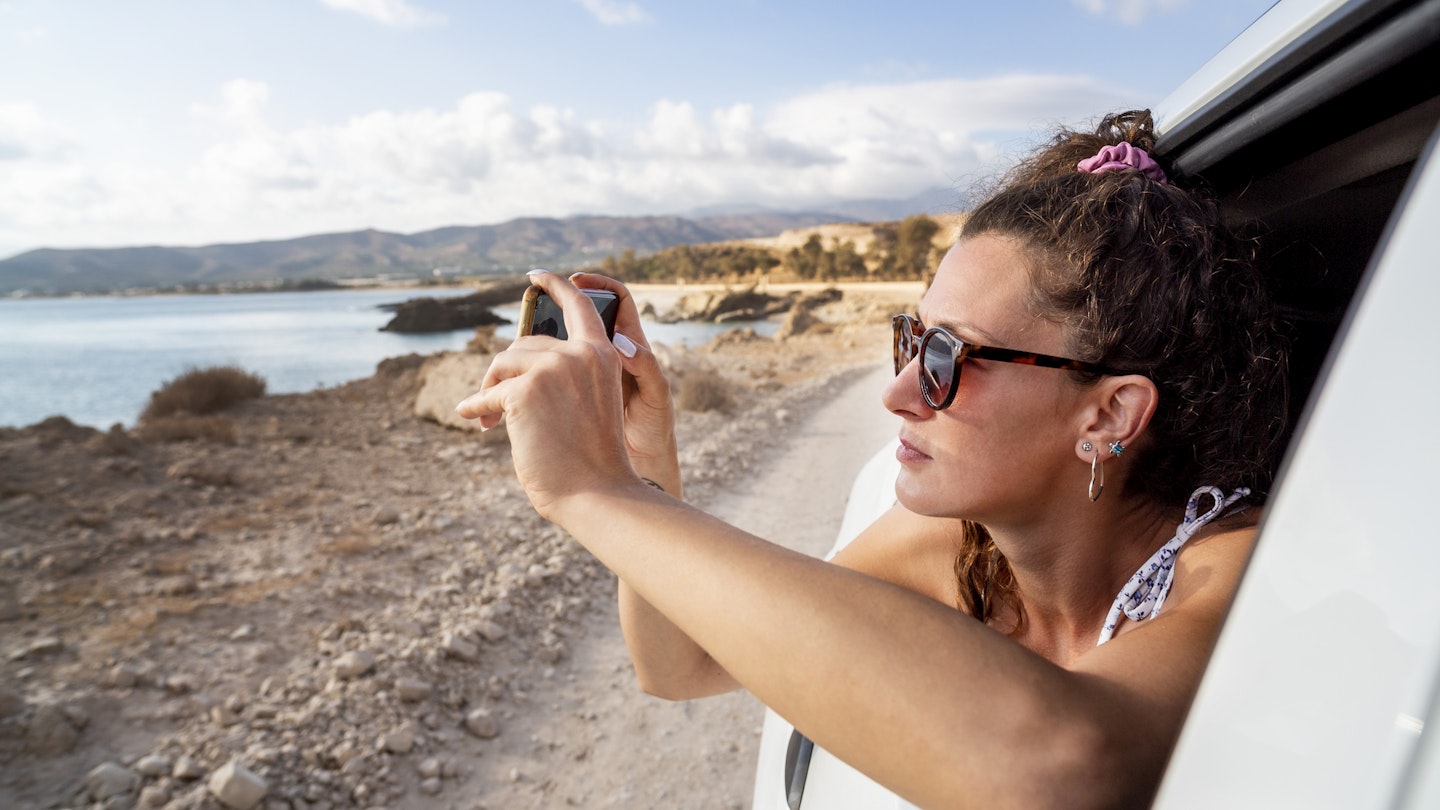
These top planning tips can help you prep for a trip to Greece, from health and safety to local etiquette © EMS-FORSTER-PRODUCTIONS / Getty Images
Get out your bucket list; it’s time to cross off a major line item: Greece .
The fabled land remains tops for culture , food, outdoor travel, art and, of course, beaches and islands . As part of the border-free Schengen Area, it’s also incredibly easy to visit for many travelers worldwide. From advance booking to local etiquette – and health and safety issues when you're there – here's everything you need to know to plan a memorable trip to Greece.

1. Choose your season wisely
Your experience in Greece will be wildly different depending on when you visit . Summer is tops for action, family fun, and swimming in the Mediterranean Sea, but prices are at their highest and pre-booking is necessary for everything since it’s all so popular.
The shoulder seasons (spring and autumn) are a delight – prices are lower, and rooms and resources are more readily available. Winter offers a moody and budget-friendly retreat, great for walking, hiking and sedate travels where you will often be the only visitor around. Bear in mind that some businesses will shut down completely during the low season.
2. Prioritize your wishlist and make a plan
Do you want a grand tour, taking in the not-to-be-missed highlights all over Greece, or would you prefer to focus your time on exploring your favorite islands or regions, like the Peloponnese ?
The best way to choose from the dizzying array of options on offer is to focus on what is important to you – relaxing on beautiful beaches, learning more about Greece's fascinating history and culture , museums and archaeology, off-the-beaten-track wildlife, or partying until dawn – and plan accordingly.
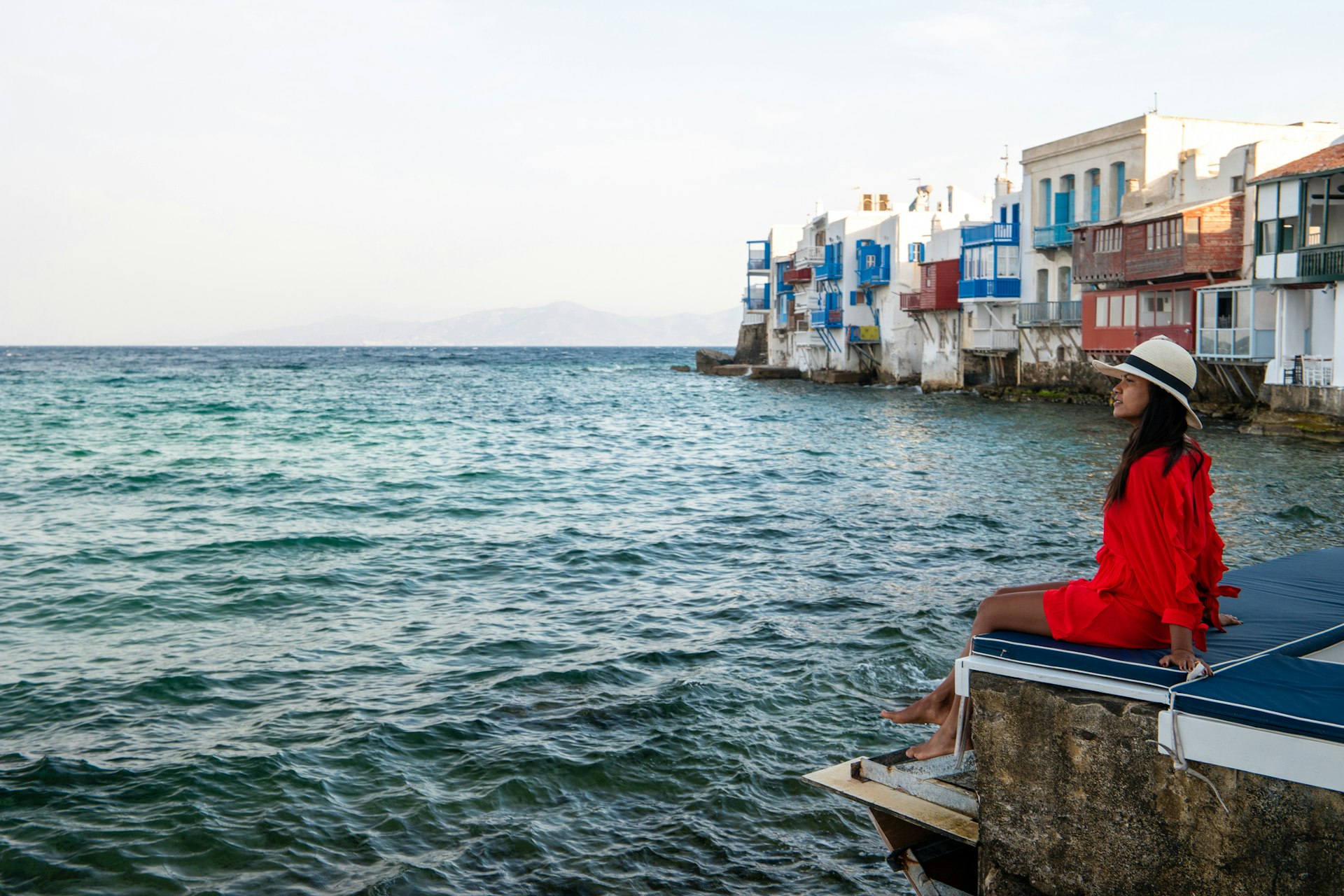
3. Find the perfect island or region for you
Greece merits multiple trips as every island offers something different , and each of its regions is equally dazzling – you're never going to see everything on your first visit, and you'll ruin your trip if you pressure yourself to do just that. Also, don’t be fooled that the biggies are the only islands worthy of your attention. Though Mykonos , Santorini and the major names have plenty to offer, lesser-known islands (there are hundreds!) like Amorgos or Kythira are also a delight. They've also got the added bonus of smaller crowds and lower prices if that's a key consideration for you.
4. Athens isn't the only gateway to Greece
In many cases, you will find it useful to transit in or out of Greece via Athens , as its airport has connections with numerous international destinations, and the city itself is a gem . However, there are other international airports around the Greek mainland (such as in Thessaloniki ) and on some major islands (such as Mykonos , Santorini and Corfu ).
If you need any internal flights to get to your destination of choice, it's worth checking the price of these individually. Due to government subsidies, it can work out significantly cheaper to book each part of your Greek itinerary separately from your international flights.
5. Book everything in advance during peak season
In peak season , prices are high, and demand for car hire, accommodations and ferry tickets is even higher – this is not the time for ad hoc bookings on the fly. Greece is an incredibly popular summer destination, and the best options get snapped up well in advance.
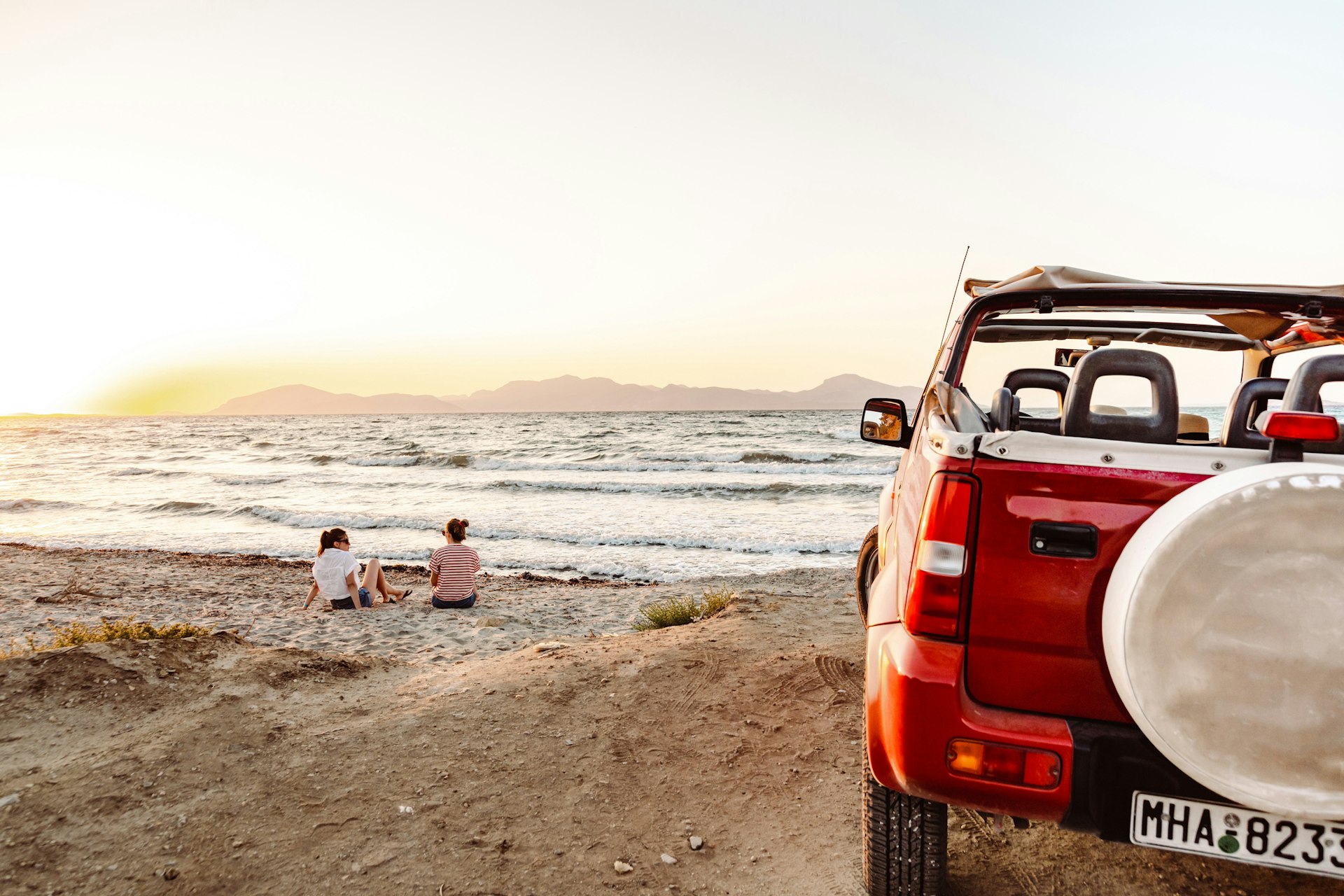
6. Roads in Greece are for confident drivers
No one who has traveled on Greece’s roads will be surprised to hear that the country’s road fatality rate is one of the highest in Europe. Overtaking is listed as the greatest cause of accidents. Heart-stopping moments aside, your own car is a great way to explore off the beaten track if you are confident in your driving and keep a few key points in mind.
- The road network has improved enormously in recent years; many roads marked as dirt tracks on older maps have now been sealed, and a lot of the islands have very little traffic.
- There are regular (if costly) car-ferry services to almost all islands.
- Greece is not the best place to initiate yourself into motorcycling. If you're not confident on a motorbike, it may be best to park this option until you have more experience.
- All the big multinational car-rental companies are represented in Athens, and most have branches in major towns and popular tourist destinations. The majority of islands have at least one outlet.
7. Greece is not very wheelchair-friendly beyond Athens
Access for travelers with disabilities has improved somewhat in recent years, but the majority of accessible sights, hotels and restaurants tend to be located in Athens. While improvements are on the horizon for beach access, much of the rest of Greece remains inaccessible to wheelchairs, and the abundance of stones, marble, slippery cobbles and stepped alleys create frustrating barriers for those with mobility issues. People who have visual or hearing impairments are also rarely catered for.
Careful planning before you go can make a world of difference. There are specific resources online that provide links to local articles, resorts and tour groups catering to tourists with physical disabilities.
8. Pack the right kinds of clothing
Athenians are well-dressed, and the younger crowd is trendy, so keep your smart clothes for the urban catwalk of clubs and bars. Nevertheless, in Athens and other metropolises such as Rhodes , Thessaloniki and Iraklio , everyday attire such as shorts or jeans and casual tops are just fine.
Bars or fashionable restaurants require more effort – the scene is stylish rather than dressy. Think tops and trousers rather than T-shirts and cut-offs. In out-of-the-way places, you can wear casual clothing, and in summer, the heat will make you want to wear the least amount of fabric you can get away with – bring quick-drying tank tops and cool dresses.
Sturdy walking shoes are a must for the cobbled roads, and proper hiking boots are key if you're exploring the countryside on foot . It's respectful to cover up before entering churches.
9. Learn some basic Greek phrases
Greek is a tough language to learn thoroughly, but mastering a few basic greetings and niceties will make a world of difference in how Greek speakers receive you. In touristed areas, many people speak English, so rest assured that you can get by as long as you know some key phrases.
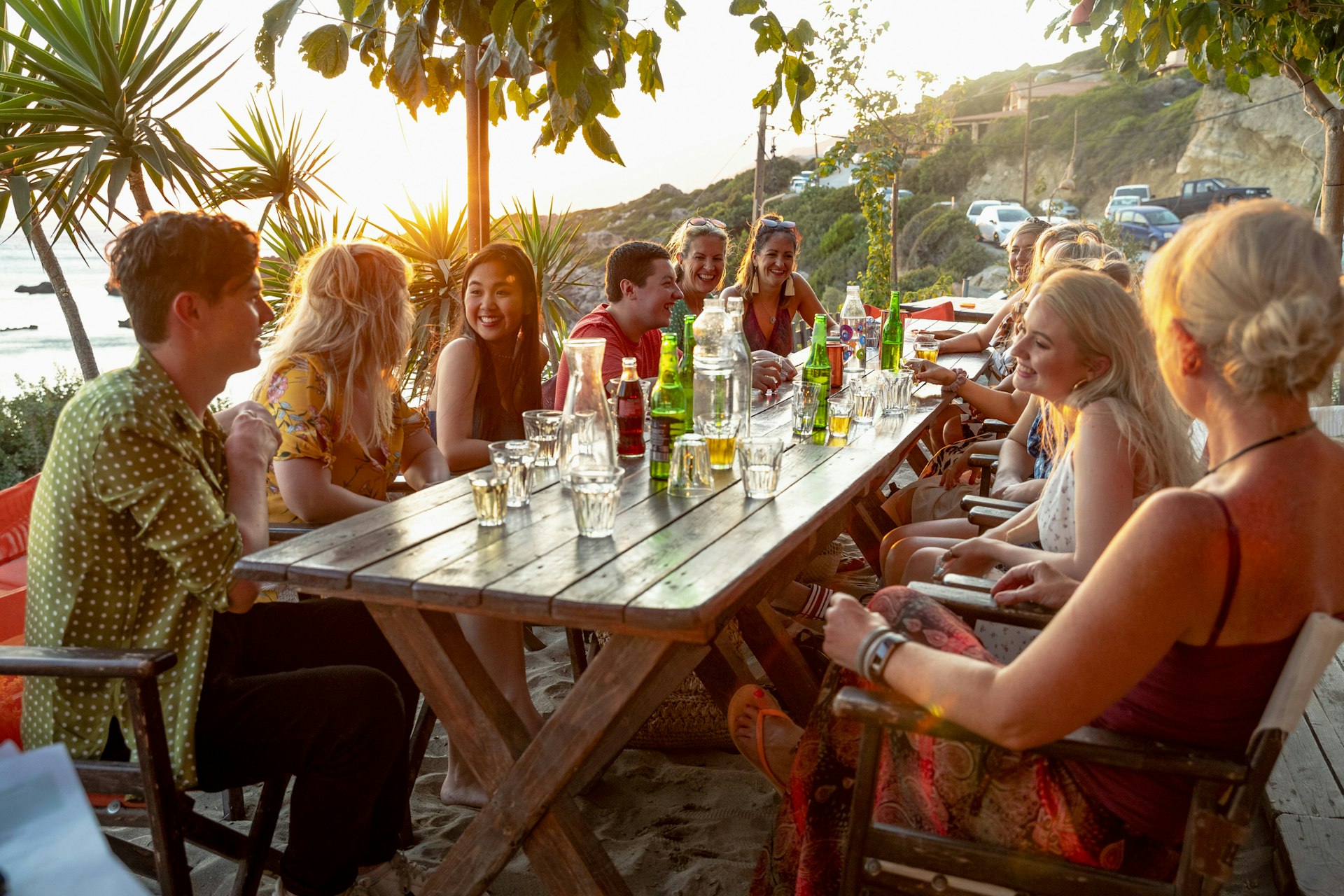
10. Carry cash and don't rely on cards or ATMs
As part of the EU, Greece uses the euro. In restaurants, a service charge is normally included in the bill, and while a tip is not expected (as it is in North America), it is always appreciated. Taxi drivers normally expect you to round up the fare, while bellhops who help you carry your luggage to your hotel room or stewards on ferries who take you to your cabin normally expect a small gratuity of between €1 and €3.
ATMs are found in every town large enough to support a bank and in almost all the tourist areas. Be aware that ATMs on the islands can lose their connection for a day or two at a time, making it impossible for anyone (locals included) to withdraw money. It’s useful to keep some backup cash just in case this happens during your visit.
Credit cards are now an accepted part of the commercial scene in Greece, although they’re often not accepted on many of the smaller islands or in small villages. Don't rely on your cards alone, and check in advance when dining or drinking if it's your only option.
11. Make sure you have good travel insurance
Although medical training is of a high standard in Greece, the public health service is underfunded. Hospitals can be overcrowded, and relatives are expected to bring in food for the patient – often a problem for solo travelers. Conditions and treatment are much better in private hospitals, which are expensive. All this means that a comprehensive travel insurance policy is essential.
There is at least one doctor on every island, and larger islands have hospitals. Pharmacies can dispense medicines that are available only on prescription in most European countries. If the situation isn't critical, it's often best to consult a pharmacist first for minor ailments.
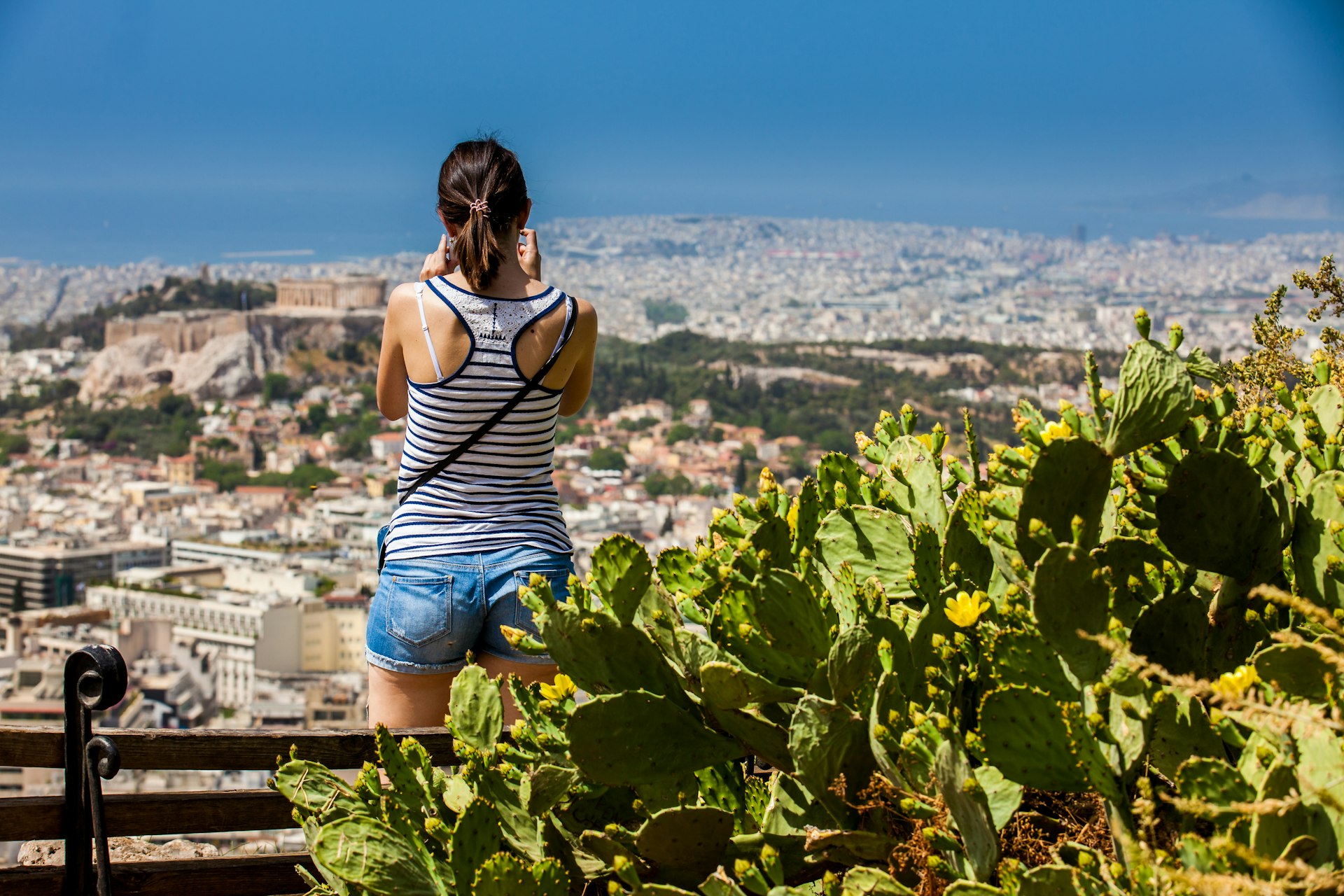
12. Stay hydrated and remember how powerful the sun can be
Tap water isn't safe to drink on many islands – if in doubt, ask. Keeping a supply of bottled water to hand is essential for hydration as well as safety; many tourists underestimate how hot it can get in Greece, and heatstroke and serious sunburn are common on beaches with little shade.
Break up your sun-drenched siestas with time in the shade getting hydrated, and pack plenty of high-factor sunscreen. Mosquitos are an irritant rather than a danger – packing insect repellant is recommended.
13. Pickpocketing and other petty crime is common in busy places
The major risks of theft in Greece are pickpockets in the large cities and theft of belongings when lounging on busy, popular beaches (leave passports behind in hotel safes). Never leave your belongings unattended, and don't leave your bags hanging from the back of your seat where you can't keep an eye on them.
The tourist police work in cooperation with the regular Greek police. Each tourist police office has at least one member of staff who speaks English. If you need to report a theft or loss of passport, go to the tourist police first, and they will act as interpreters between you and the regular police.
Some unscrupulous taxi drivers will try to charge you extortionate rates from the airports to the city centers. Always make sure the meter is running or pre-negotiate and agree on the price before you get in.
This article was first published Mar 1, 2022 and updated Mar 6, 2024.
Explore related stories

Jun 12, 2024 • 7 min read
Before word of Serifos' delights reaches the masses, get out and explore this still-timeless Greek island.

Jun 12, 2024 • 12 min read

Jun 11, 2024 • 6 min read

Jun 11, 2024 • 7 min read

May 31, 2024 • 4 min read
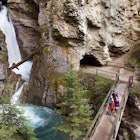
Apr 19, 2024 • 10 min read

Mar 15, 2024 • 10 min read
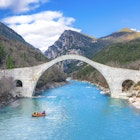
Mar 4, 2024 • 6 min read
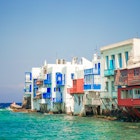
Feb 15, 2024 • 4 min read

Feb 2, 2024 • 7 min read

3 weeks in Greece: The Ultimate 20-21 Days Itinerary + My Best Tips
3-week greece itinerary : the best things to do + where to stay.
You’re planning to spend 3 weeks in Greece and you’re looking for the best itinerary?
That’s perfect!
In order to help you plan your stay , I have prepared for you this 3 weeks itinerary in Greece .
During your 20-21 days trip , you will discover some of the country’s best places to visit such as Athens , the Peloponnese region , Delphi , the Meteora as well as 4 islands of the Cyclades archipelago : Santorini , Amorgos , Naxos and Paros .
In addition to the must-see attractions for each stage of the itinerary, I will also give you all my best tips and accommodation suggestions depending on your budget.
So, how to spend three weeks in Greece?
Let’s find out!
Where to stay in Athens
Where to stay in nafplio, where to stay in mystras, where to stay in olympia, where to stay in delphi, where to stay in meteora, 7) thessaloniki (1 day), where to stay in santorini, best hotels in oia, best hotels in fira, other best places to stay in santorini island (cheaper), best hotels in katapola, best hotels in aegiali, where to stay in naxos, best hotels in parikia, best hotels in naoussa, 12) return to santorini or athens (1 day), greece tours, renting a boat in greece, cyclades (greek islands), 1) athens (2 days).
If you want to visit Greece in 3 weeks, the best is to land in Athens Airport.
Getting around Athens on foot is really easy, however, you will have to rent a car for the next stages of your trip to Greece.
You’ve got 2 options:
- You can rent a car directly at your arrival in Athens
- Or you can go back to the airport on your 3rd day to get it, when you will leave Athens for Peloponnese.
In any case, if you plan to rent a car in Greece, you should use Booking.com Cars website. It’s the one i am using every time I travel!
Here is why:
- It’s a price comparator: In just 1 click, you can compare prices of all rental cars companies in Athens airport for example.
- You will be able to see clients reviews for each company and choose accordingly.
- They offer a great “full protection insurance”: If you take it, you will be 100% refunded in case of accident or theft. Tested and approved, they refunded me more than 1200 euros in total!
- And last but not least, Booking.com Cars offers the “best price guarantee” . If you find the same car cheaper elsewhere, they will refund you the difference!
One last tip: if you already know your travel dates, you should check the car rentals prices now in order to get the best price . Booking early is the best way to save money! Click the button below to check rental cars prices in Greece:
It’s now time to go to your hotel in Athens. If you haven’t rented your car yet, you will have 4 options to reach the city centre:
- By taxi: 40€
- By bus: the line X95 goes directly to Syntagma Square, Athens’ main square. But beware of traffic jams!
- By metro: the line 3 (the blue one) is the fastest option to go to the city centre.
- Your hotel airport shuttle service, if they have one.
For your first day in Athens, you should visit, in order:
- The Acropolis Museum to discover the history of Athens’ most famous ancient site. Directly get a skip-the-line ticket here!
- Athens Acropolis, a UNESCO World Heritage Site. It’s a must-see attraction during your 3-weeks stay in Greece!
- The picturesque Plaka district
- The Ancient Agora and its museum
- Monastiraki district, often nicknamed “the souks”, as you will find many small shops there!
- Philopappos Hill to admire the sunset
- And if you like to party, you should go to Gazi district.
Spend the night in Athens.
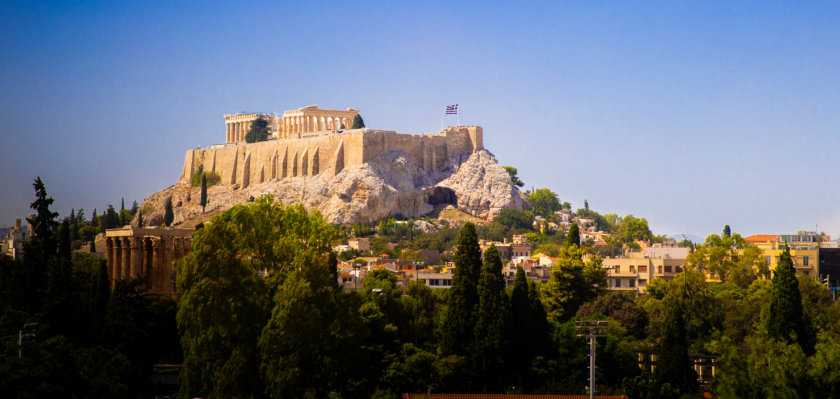
The next morning, you should take a stroll in Athens to visit some other monuments.
Here are the best things to do during this 2nd day:
- The Panathenaic Stadium: it hosted sporting events way before our Modern Olympic Games
- The Arch of Hadrian
- The Temple of Olympian Zeus
- Zappeion Park and the National Garden
- Syntagma Square, where the Changing of the Presidential Guard takes place every hour
- Ermou street, if you like shopping
- Athens National Archaeological Museum
- Mount Lycabettus, the perfect place to admire the sunset over the Acropolis.
Spend another night in Athens.
You will find more details about the best places to visit in Athens in my article: The 20 best things to do in Athens.
You can buy a 30€ combined ticket to visit the Acropolis, the Ancient Agora and 4 other sites: Hadrian’s Library, the Temple of Olympian Zeus, the Roman Agora and the Lyceum (Lykeion).
It’s valid for 5 days.
To get this combined ticket, it’s very simple, you just have to book it by clicking on the button below:
To make them most of your visit to Athens, you should opt for the Athens City Pass. It includes all the must-see attractions , such as:
- The combined Acropolis ticket mentioned above
- The Acropolis Museum entrance ticket
- An audio guide for your visit to Athens
- A 10% discount on all other attractions in Athens
To book it, simply click here:
And if you want to learn everything about the Acropolis History , the best is to opt for a guided visit (it’s also a skip the line ticket).
The best guided tour in English is the one from GetyourGuide Originals. It’s so great that they will give you a full refund if you don’t enjoy your time!
To book it, you just have to click on the button below:
- Bedbox Hostel: A Youth Hostel located 300m from Monastiraki Square, and 700m from the Acropolis. Dormitory room starting from 18€ per night. Strong points: the location, the really kind staff and the cleanliness!
- Evripides Hotel: Located 400m from Ermou Street and 500m from Monastiraki. The rooms are simple but comfortable, starting from 70€ per night, with breakfast included. What I loved: the breathtaking view of the Acropolis from the rooftop, the location (perfect to visit Athens on foot) and the friendly and helpful staff! A great choice in Athens for its exceptional value for money!
- Amalia Hotel: Located on Syntagma Square, just in front of the National Gardens. The double rooms are modern and spacious. Some of them even have a balcony with a nice view of the gardens. The price starts at 155€ per night with breakfast included. Strong points: The comfort, the generous breakfast, and the location in the centre of Athens.
- Wyndham Grand Athens: 5-star Hotel located 1km from Ermou Street and 1.5km from the Acropolis. You’ll love the elegant and design double rooms here, starting from 200€ per night. Breakfast will cost you 16€. Strong points: the outdoor pool on the roof, the view of the Acropolis, the spa center, and the location right next to a metro station!
- Electra Metropolis: This 5-star hotel is located only 200m from Syntagma Square and 600m from the Acropolis. The price for a spacious and comfortable double room starts at 270€ per night, breakfast included. What I loved: the ideal location, the view of The Acropolis from the rooftop, the amazing restaurant, the pool. The best choice for a luxury stay in Athens

2) Mycenae / Epidaurus / Nafplio (1 day)
Let’s continue your 3-weeks in Greece itinerary and visit the Peloponnese region.
For your 1st day in the peninsula, you should visit the 3 following places:
- Corinth Canal, located 1 hour from Athens. You have to stop and take a picture of this canal, carved into stone to avoid the boats a 400km detour. If you’re lucky to see a boat crossing, you will notice the narrowness of the canal. The biggest boats just have a few centimetres of free space on each side. It’s really impressive to see!
- M ycenae, located 40 minutes from the Canal. The former home of king Agamemnon is also one of the most ancient site in Greece. Today, the Royal Palace and Tholos Tombs are mostly in ruins. If you’re not an history lover, the next visit will be more interesting for you.
- Epidaurus, located a 45-minute drive from Mycenae. This UNESCO World Heritage Site is famous for its well preserved ancient theatre with its exceptional acoustic. It’s one of the best places to visit in Peloponnese.
At the end of the day, drive to your last stop: the lovely seaside town of Nafplio. It will take you 30 minutes to get there from Epidaurus.
Enjoy a walk in the old town, and go to Acronafplia Castle to admire the view. You can even go take a dip at Arvanitia beach to end the day in style!
Spend the night in Nafplio.
You will find more informations about the Corinth Canal, Mycenae, Epidaurus and Nafplio in my article: Visit Peloponnese: the definitive guide.
And for an exceptional experience during your 3 weeks itinerary in Greece, you can also do a 70m bungee jump over the Corinth Canal!
- Agamemnon Hotel: Located in Nafplio’s old town, just in front of the Bourtzi Castle. The double rooms, with a balcony and sea view for some of them, are starting from 55€, with breakfast included. Strong points: the location, the view, the kind staff.
- Amymone and Adiandi Hotel: Located 5 minutes away from the beach, in the old town. You will love the elegant double rooms, starting from 75€ including breakfast. What I loved: the delicious breakfast, the location on a pedestrian alley, the rooms’ original and nice design. It offers the best value for money in Nafplio!
- Amalia Nafplio Hotel: Located about 2km away from the city centre. The luxurious and comfortable double rooms are starting from 110€ per night, with breakfast included. Strong points: the pool, the free private parking, the quietness, the varied breakfast.
- Nafplia Palace Hotel & Villas: This 5-star hotel is only 5 minutes away from the beach and 15 minutes away from the city centre. The rooms are large and modern, with balconies and the offer a great views of the sea and the castle. Price starts from 260€ per night. If you want an even more luxurious stay, you can sleep in a villa with its private pool, starting from 570€ per night. It’s my favorite hotel in Nafplio, perfect for a luxury stay!
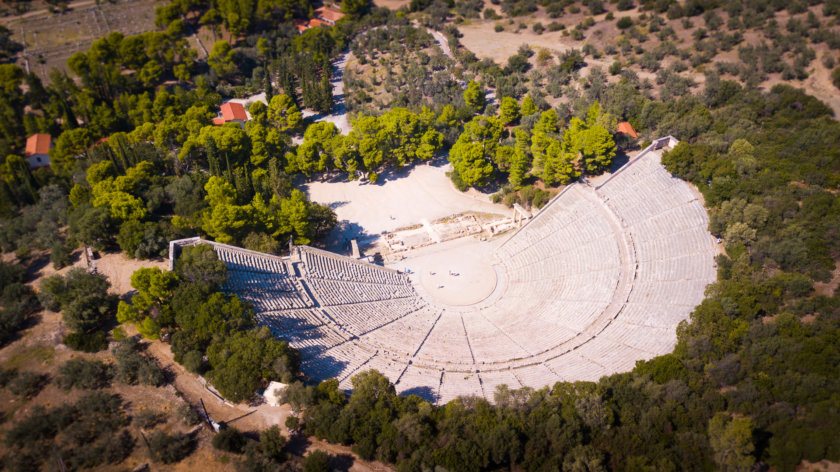
3) Palamidi Fortress / Monemvasia (1 day)
New day, new visits!
In the morning, you will start by Palamidi Fortress, only about 10 minutes drive from Nafplio.
The fortress is quite huge, and you will enjoy great views of the city and the sea. Plan 1h30 – 2 hours to visit the site!
Then, get back in your car and drive for 3 hours to reach Monemvasia. It may sound a bit long but don’t worry, the landscape is really amazing on the road and time will fly by.
Surrounded by fortification walls, the lovely village of Monemvasia was built on an island under an high cliff and is completely hidden from the mainland. Inside Monemvasia, you will enjoy a stroll in its nice paved alleys with small shops and restaurants. On the main square, you will discover a church and a cathedral.
You can also take the path that leads you to the fortress, at the top of the hill. The panorama is really worth the small effort!
After Monemvasia, go to Mystras (around 1h30). You will drive quite a bit during this day, but it will be a lot more convenient for the next one.
- Byzantion Hotel : Located just across Mystras’ main square. The simple but comfortable rooms offer a view on the Archaeological site. Price starts from 55€, breakfast included. Strong points: the pool, the view, the private parking lot.
- Mazaraki Guesthouse: Located close to Mystras’ Archaeological Site and surrounded by nature, this place offers large and warm suites with balcony, starting from 115€ including breakfast. What I loved: the pool, the environment, the decoration, and the breakfast served in your room.
- Arxontiko Taygeti: This Guesthouse is located only 5km away from Mystras’ city centre. The duplex suites, with a kitchen, a living room and a balcony with a beautiful mountain view are starting from 160€, with breakfast included. Strong points: the calm, the kind staff, the environment. You will also find everything you need for breakfast in your fridge!
- Mystras Grand Palace Resort: This 5-star hotel is located only a 5-minute drive from Mystras. This brand new hotel offers rooms with stone walls, exposed beams and terrace, starting from 180€ per night including breakfast. What I loved: the pool, the hot tub, the sauna, the comfortable rooms, the calm. It’s the best choice for a luxury stay in Mystras.
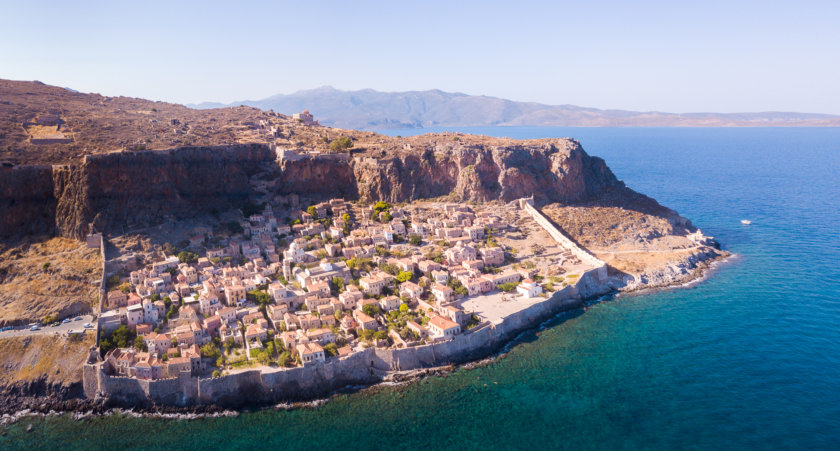
4) Mystras / Olympia (1 day)
The 4th step of your 20 or 21 days trip to Greece starts with the visit of the Archaeological Site of Mystras
This UNESCO World Heritage Site is the former capital of the Byzantine Empire. On the site, you will admire many churches, monasteries, covent and a fortress.
Mystras is divided in 2 parts: an upper town and a lower town. As you will find a parking lot at each entrance, the easiest way to visit Mystras is to start with the upper city, visit the fortress, and then drive back to the lower city to visit it.
Remember to keep your entrance ticket!
Mystras was one of my favorite places to visit during my 3-weeks road trip in Greece . You will need at least 3 hours to enjoy the site.
Once you will be done with the visit, drive for 2 hours to go to another must-see archaeological site: Olympia.
If you visit Mystras early in the morning, you can arrive in Olympia at around 3 or 4 p.m. This means you will have time to visit the museum and the ancient site.
Start with the Museum , to discover many statues and objects found on the site. Then, visit the archaeological site located nearby.
From 776 B.C to 393 A.D, Olympia was hosting the Olympic Games. There, you will see the remains of the temples, the sports installations and the gymnasium.
If it’s not too late, after your visit of the site, go have a look at the Museum of the Olympic Games. There, you will learn everything about the sporting events and the history of the Ancient Olympic Games. It would be a shame to miss it, as the entrance is included in your 12€ entrance ticket to the Olympia.
Spend a night in Olympia.
For more detailed information about Mystras and Olympia, you can read my article: The 15 best things to do in Peloponnese.
- Leonidaion Guesthouse: Located only 10-minute walk from the Archaeological site of Olympia. The large and comfortable double rooms are starting from 55€ per night, including breakfast. What I loved: the free private parking lot, the location close to the site, the quietness. It’s the best value for money in Olympia!
- Amalia Hotel Olympia: Located at the city’s entrance. The large and bright rooms, with balcony or terrace are starting from 80€, with breakfast included. Strong points: the pool, the very tasty breakfast, the kind staff, the free fruit basket and water in your room.
- Arty Grand Hotel: Located on a hill overlooking the city, this 5-star hotel offers modern double rooms, with a small living room and a balcony, starting from 95€ per night including breakfast. Strong points: the huge outdoor pool, the indoor pool, the environment. It’s the best hotel for a luxury stay in Olympia!
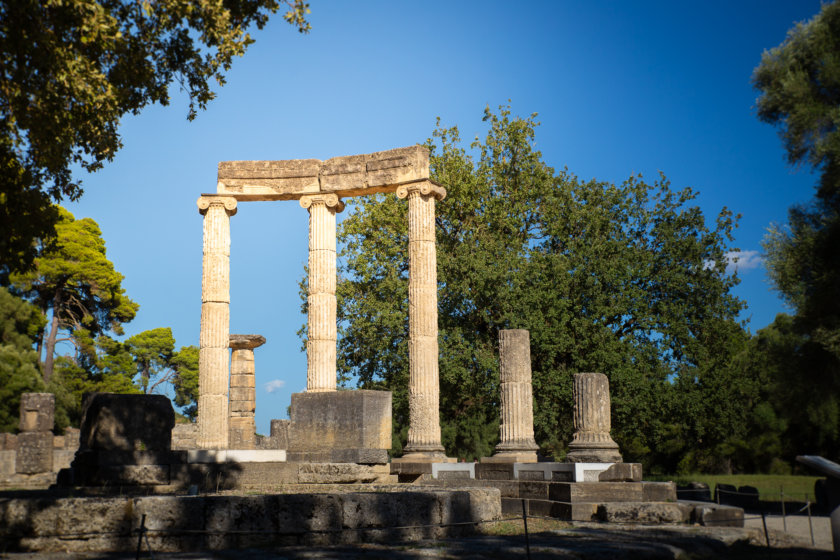
5) Delphi (1 day)
After 3 days in Peloponnese, it’s time to go to Delphi to continue this 3-weeks in Greece itinerary.
Delphi is located a 3h15 drive from Olympia, but don’t worry: during your journey, you will have time to enjoy amazing landscapes and a few stops in beautiful towns!
The best places to see during this road trip are:
- Kalogria Sandhill: a large sand beach, surrounded by dunes and pine trees. Ideal if you want to rest or walk a bit!
- Gianiskari beach, a nice sand beach only accessible by a trail. It’s a very quiet place, far from tourists.
- Nafpaktos: a nice seaside town with 2 large beaches, several bars and a small port. Ideal for your lunch break. You can also visit the castle above the city, and enjoy the view of the bay up to Charilaos Trikoupis Bridge (the entrance fee is 2€)
- Galaxidi is another seaside village, where you can have a nice walk along the port and in the pine forest. You will find many bars and restaurants.
- Between Nafpaktos and Galaxidi, the seaside road is really beautiful, and there are some great beaches to take a dip!
Delphi is well-known for its prophecies. Here, the Pythia (the oracle of Delphi) transmitted Appolo’s directives from the gods to humans. In Ancient Greece, Delphi was considered to be the center of the world.
You can visit the archaeological site and the museum for 12€. You will discover the Temple of Apollo, the Theatre, the Stadium and enjoy the magnificent view of the mountains and valley!
Delphi is definitely a must-see place for your 3 weeks holiday in Greece. It was simply my favorite site of Ancient Greece.
Visit the archaeological site of Delphi at the end of the day, when the lighting is really beautiful. It will also give you more time to stop on the road and enjoy the beaches and small town!
- Fedriades Delphi Hotel: Located a 10-minute walk from the ancient site of Delphi. The modern double rooms with balcony are starting from 55€, and you have to add 8€ for breakfast. Strong points: the panoramic view, the high quality beds, the kind staff.
- Kastalia Boutique Hotel: Located only 5 minutes from Delphi. You’ll enjoy large and modern double rooms, starting from 62€ including breakfast. What I loved: the terrace, where you can have your breakfast, the warm welcome, the location. It’s the best value for money in Delphi!
- Nidimos Hotel: Located only 1km from the archaeological site. The bright and comfortable double rooms with balcony are starting from 65€ per night, with a 10€ breakfast. Strong points: the various and copious breakfast, the free parking lot, the beautiful view.
- Amalia Hotel Delphi : Located 800 meters from the archaeological site. Modern and bright double room offering a nice view up to the sea starting at 90€ per night, breakfast included. Strong points: the large swimming pool, the view. The most high-end hotel in Delphi!
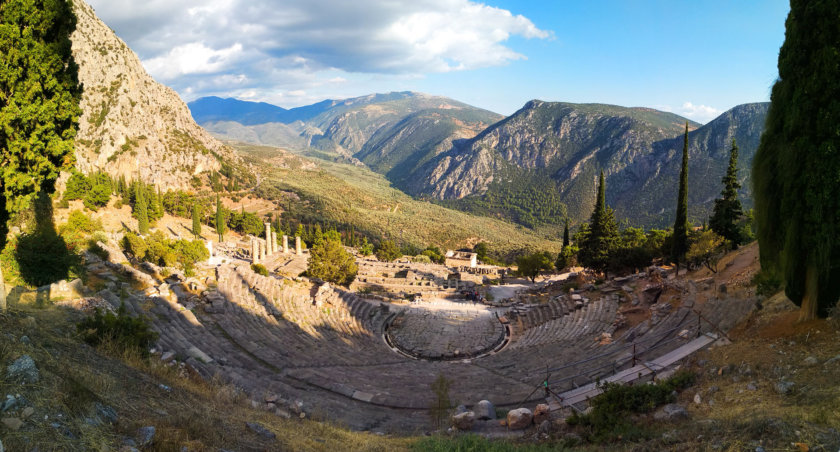
6) The Meteora (1 day)
Let’s continue this 3 weeks trip to Greece with my favorite place in the country: the Meteora.
Located in Central Grece, the Meteora are quite far from Athens (5 hours) and from Thessaloniki (2h40), but you won’t regret going that far!
From Delphi, going to Meteora will take around 3h30 . So don’t leave too late and try to arrive there around 12. You can have your lunch break in Kalambaka (the main city nearby) , and ask for your map of the Meteora Monasteries at the tourist office.
The Meteora is a unique geological site, with huge rocks formations and monasteries built on the top of some of them! The scenery is truly amazing, it’s the perfect place to take beautiful pictures.
Back in time, the monks living here had to travel in nets or baskets pulled by a cable hundreds of feet over the ground. Nowadays, don’t worry, you can take the stairs to visit the 6 monasteries.
The most impressive is for sure to see them from the outside, but you can also visit the inside of the monasteries (3€ entrance fee for each) . If you only have the time to visit one, you should visit the Monastery of Great Meteoron, which is the biggest and most impressive.
Spend the night in one of the hotels below.
- Pyrgos Adrachti: Located in the village of Kastraki, only a 5-minute drive from the monasteries. The double rooms, with a beautiful view of the Meteora are starting from 60€, with a 7.50€ breakfast. Strong points: the magnificent view, the quietness, the amazing big breakfast.
- Meteora Hotel at Kastraki: Located in Kastraki. The modern and bright double rooms are starting from 80€ per night, with breakfast included. What I loved: the pool, the location in the countryside, the spectacular view. It’s the best value for money in Meteora!
- Hotel Meteoritis: Also located in Kastraki. You will love the spacious and comfortable double rooms, with a balcony and a view of the Meteora, starting from 125€ including breakfast. Strong points: the kind staff, the location, the private parking, the varied breakfast.
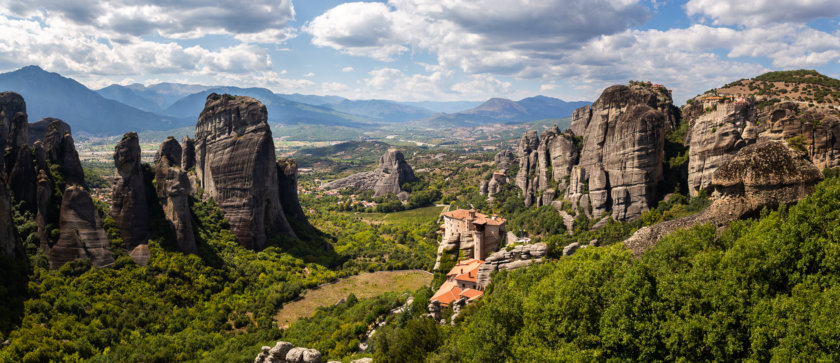
Now, it’s time to go to Thessaloniki. It’s the best place to take your plane to Santorini without having to go back to Athens.
You will have to drive around 2h40 from the Meteora.
Depending on your flight departure time, maybe you will have some time to visit Thessaloniki?
If you do, you can read my article about Greece’s 2nd largest city. You will find all my best tips to get around Thessaloniki on foot and visit the best points of interest: How to visit Thessaloniki in 1 day?
It’s now time to fly to the 2nd part of your 3 weeks trip to Greece: The Cyclades islands. Let’s do some Greek island hopping !
You will save some time if you fly to Santorini from Thessaloniki. The flight aren’t more expensive than from Athens or than the ferry. And it’s a lot faster!
When you rent your car, notice that you will take it in Athens and drop it off in Thessaloniki. Choose a company that won’t charge extra fees if you drop your car off in another airport. Booking.com Cars website will help you to find the best car rental agency easily.
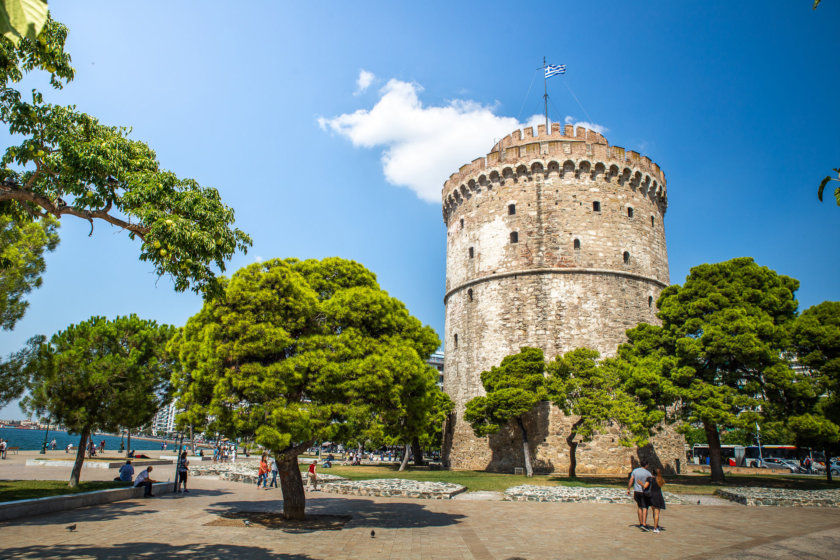
8) Santorini (3 days)
For the next stages of your 3 weeks itinerary in Greece, you will visit 4 islands of the Cyclades archipelago.
So let’s start your Cyclades itinerary ! The first Greek island you will visit is the world-famous Santorini island.
When you arrive in Santorini from Thessaloniki, rent a car for 3 days , then go to your hotel (you will arrive quite late).
Here is the best itinerary to visit the Island in 3 days:
On your 1st day, visit Fira and Oia, the 2 most famous villages of Santorni.
You should do it in this order:
- In the morning, visit Fira as well as Firostefani and Imerovigli , the 2 adjacent towns.
- Then, you can enjoy a very beautiful hike from Fira to Oia in the early afternoon. It takes between 1h30 and 2h. If you don’t want to walk, you can also drive to Oia.
- Visit Oia at the end of the day, and enjoy the sunset there.
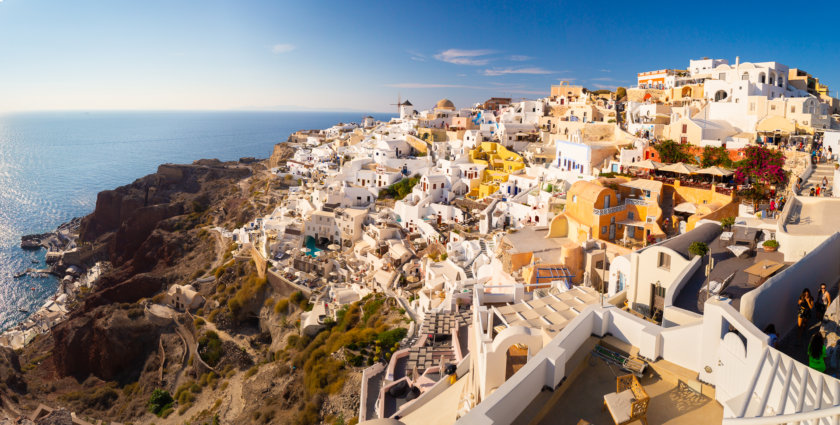
For your 2nd day, The best is to go on a 1-day boat trip and:
- Discover the still active volcano of Nea Kameni
- Swim in Palea Kameni hot springs
- Visit Therasia, the island located right in front of Santorini.
It’s a top attraction of Santorini, so you imagine that most tourists want to do this fantastic cruise! As the seats are limited, you have to book it in advance by clicking on the button below.
And if you want a romantic and luxury trip on a catamaran, it’s right there:
Spend your 3rd and last day in Santorini doing a road trip to discover the rest of the island.
- Discover the villages of Pyrgos, Megalochori and Emporio.
- Visit the 2 ancient sites of the island: Akrotiri (often compared to Pompeii, in Italy ), and the Ancient Thera.
- Wine enthusiasts can also book an oenology tour with a small group, to discover Santorini’s vineyards, with 12 wines tasting included. Book it right here!
- End your day and relax at the beach. The Red Beach and the Black Beach are the most famous. Monolithos Beach is ideal if you’re with children.
For more info to organise your trip, you should read my detailed article: How to visit Santorini in 3 days?
You must know that staying in Santorini, especially in the villages of the caldera like Oia and Fira , is quite expensive.
If you want a less expensive accommodation , it’s better to choose a hotel outside these 2 cities .
And of course, even more in Santorini than in any other place, book your hotels as early as possible!
To help you choose, I have made a selection of the best hotels in Santorini , depending on where you want to stay and your budget.
- Aethrio Hotel: Located in Oia, only a few steps away from the main square. You can rent double rooms, studio flats or apartments with balcony for most of them. The price starts from 160€ per night, breakfast included. Strong points: the swimming pool, the large rooms, the rooftop to admire the sunset. It’s one of the cheapest places in Oia, and it offers a great value for money!
- Caldera Premium Villas: Located in the centre of Oia. You will love the troglodyte suites with a breathtaking view of the sea and the caldera, starting from 290€ per night, breakfast included. Strong points: the pool, the design of the rooms, and the location.
- Theodora Suites Apartment: Located in the heart of the city. Studio flats with small kitchen, fridge, private terrace and hot tub, starting from 350€, breakfast included. What I loved: the hot tubs, the breathtaking view, the kind staff.
- Andronis Boutique Hotel: 5-star hotel located in Oia. You’ll enjoy large suites with a view of the caldera, private balcony and private hot tub or pool, starting from 800€ with breakfast included. Strong points: the idyllic scenery and the calm. It’s my recommendation for a one-week romantic stay in Greece!
- Katikies Hotel – The Leading Hotels of the World: This luxurious hotel offers rooms and suites with a great view, bathtub and spa. The price starts from 1000€ with breakfast included. What I loved: the pools, the spas, the splendid views and the food! It’s my recommendation for a luxury stay in Santorini!

- Galatia Villas: Located 10 minutes away from Fira’s city centre. The double rooms are quite basic but nice, and the price starts from only 80€ per night. Strong points: the hot tub on the roof, the kind staff, the great value for money for Santorini.
- Lilium Santorini Villa: Located on the edge of the caldera. These elegant and modern double rooms with sea view are available starting from 315€, breakfast included. What I loved: the pool, the exceptionnal location, the warm and welcoming staff.
- Cosmopolitan Suites – Small Luxury Hotels of the World: Located in the heart of Fira. You will enjoy lovely rooms with private balcony, decorated in the purest Cycladian style, starting from 550€ per night, breakfast included. Strong points: the infinity pool over the cliff, and the luxury hotel services. This is the perfect place to stay with your lover in Santorini!
- Aria Suites: Located in Fira, this high standard hotel offers only 6 suites and luxury villas, fully equipped (you even get a laptop), starting from 700€ per night. What I loved: the magnificent place, the pool and the staff availability. This is a great choice for a luxurious and romantic stay in Fira!
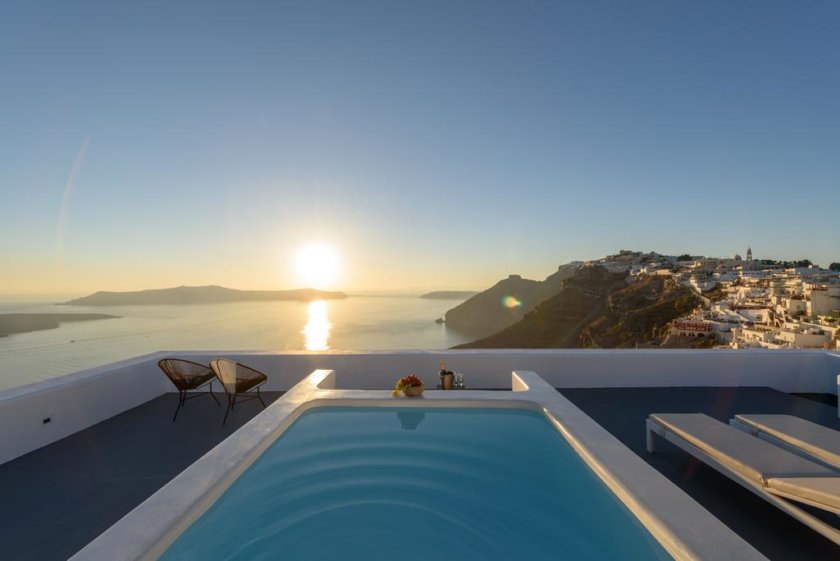
- Memories Beach Hotel: Located just accross Monolithos beach. These comfortable modern rooms starts from 65€ per night, with breakfast included. Strong points: the pool, the calm and the adorable staff.
- Rose Suites: Located in Vourvoulos, only 4 kilometers away from Fira. Those studio flats and apartments are well equiped and decorated, with a small kitchen and a private terrace. The prices are starting from 75€ per night. What I loved: the pool, the calm, the decoration. The fridge is also full with everything you need for breakfast. This is the best choice in Santorini for its exceptional value for money!
- Hippocampus Hotel: Located in Kamari, only 50 meters away from the beach. The rooms, with a view on the swimming pool or the garden, are starting from 85€ per night, breakfast included. Strong points: the pool, the ideal location close to the beach, and the really kind staff.
- Meltemi Village Hotel: Located in Perissa, only 5 minutes away from the Black beach. The rooms and suites with hot tubs are starting from 100€ per night, with the breakfast included. What I loved: the pools, the spa, and the great breakfast. A great choice for a stay on Santorini’s shore!

9) Amorgos (3 days)
It’s now time to visit other islands in the Cyclades.
The 2nd island you will visit is Amorgos, located only 1h from Santorini by ferry boat.
If you want to book your ferry ticket and check the schedules, you have to use Ferries in Greece website .
Be careful, Amorgos has 2 ports, Katapola and Aegiali. Don’t forget to check your port of arrival and departure!
You can’t take the ferry from Santorini with your rental car (as it’s forbidden). You will have to rent a new car on each island. As Amorgos is a small island, you can’t book your car in advance, and you will have to rent it directly when arriving. Don’t worry, there are several car rentals companies just in front of the ferry pier.
For your 1st day, take your car and start discovering the island:
- Katapola, the principal port.
- Hora, the capital, and its many old mills
- Have a lunch break in one of the typical taverns of the village
- The Monastery of Panagia Hozoviotissa
- Agia Ana cove, close to the monastery.
- Kalotaritissa, a great beach to relax and swim a bit. You can also see the ship wreck of “The Big Blue” movie.
For the 2 other days, you can go hiking on the many walking trails of the island. You will find every information you need on Amorgos’ official website.
Amorgos is a real paradise for hiking lovers. And the best is that most hikes will also allow you to discover great beaches and coves to swim and rest! I really loved visiting Amorgos during my Greek island itinerary .
If you want to everything about Amorgos island, you should read my article: Visit Amorgos: the definitive guide.
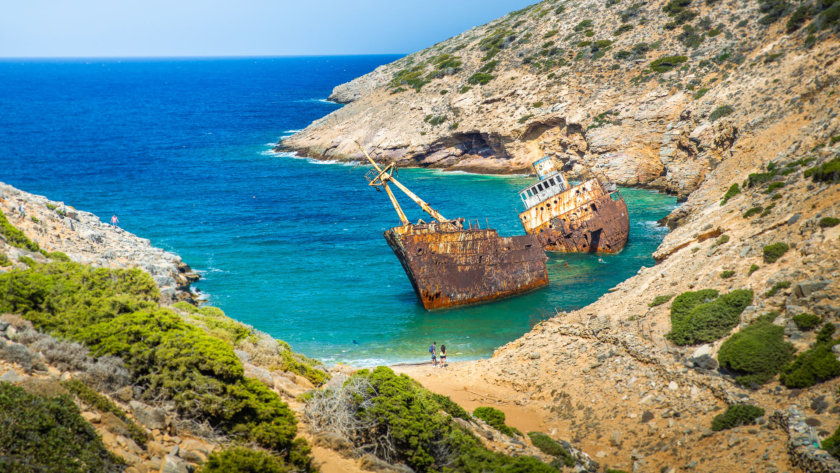
Where to stay in Amorgos
When you visit Amorgos, you can stay in one of the 2 main cities: Katapola and Aegiali. Choose between the 2 according to your port of departure!
Here is a selection of the best places to stay in Amorgos:
- Amorgion Hotel: Located 1km from the port of Katapola, and at only 8-minute walk from the beach. The double rooms with private balcony, and a view of the Aegean Sea for some of them, are starting from 50€ per night, with an 8€ breakfast. Strong points: the pool, the private free parking, the warm welcome. It’s the only hotel with a swimming pool in Katapola!
- Barbara Pension: Located 5 minutes away from the beach, right next to the port of Katapola. The studio flats are equipped with a sink , a fridge and also have a balcony. The prices are starting from 55€per night. Strong points: the cleanliness, the quietness, the very kind owner!
- Diasino Studios: Located close to the port. The studio flats and apartments are modern, with terrace or balcony. The prices are starting from 60€ with a 5€ breakfast. What I loved: the calm, the location close to all the restaurants. It’s the best value for money in Katapola!
- Landeris Hotel: Located 3 minutes away from the beach, and close to the port. The rooms, studio flats and apartments are decorated in a rustic style, with wooden furniture. The prices are starting from 60€ per night with breakfast included. Strong points: the kindness of the owners, the delicious breakfast, the great advice!
- Minoa Hotel: Located 100m from the beach, close to the port. The bright and large double rooms, with balcony are starting from 80€ per night including breakfast. Strong points: the kind staff, the great breakfast.
- Pelagos: Located only 3 minutes from the beach and 100m from the port of Aegiali. The double rooms with balcony and sea view are starting from 35€ per night, with a 5€ breakfast. Strong points: the view, the welcome directly at your boat, the copious breakfast.
- Aelia Studios: Located on the sea side. The modern and cosy studio flats, equipped with a small kitchen with an oven and hotplates are starting from 60€ per night. What I loved: the design and the charm of the apartments, the location. It’s the best value for money in Aegiali!
- Vigla Hotel: Located 10 minutes away from the beach, in Tholaria, above Aegiali. The modern and bright large rooms are starting from 110€per night, with breakfast included. Strong points: the pool, the copious breakfast, the comfort, the quietness, the great restaurant. If you are looking for a nice hotel with a swimming pool in Amorgos, you should definitely try the Vigla!
- Aegialis Hotel & Spa: Located above Aegiali, this 5-star hotel (the only one in Amorgos) offers comfortable rooms with balcony starting from 140€ per night. Strong points: the big pool, the magnificient view of Aegiali and the sea, the spa, the quietness. It’s simply the best hotel in Amorgos!
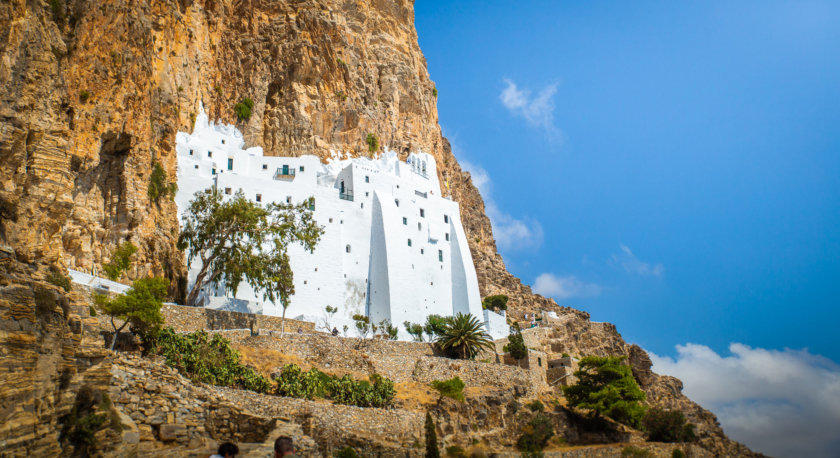
10) Naxos (3 days)
Your 3 weeks itinerary now takes you to Naxos, located 1h15 away from Amorgos by ferry boat.
As Naxos is a quite big island, you should really rent your car in advance. You can check the best prices by clicking the button below:
For your 1st day , you will arrive in Hora, the capital. There, you can discover the Portara and Kastro district. After lunch, enjoy one of the West Coast beaches to relax.
On your 2nd day , take your car and visit the picturesque mountain villages: Halki, Filoti and Apiranthos.
If you like hiking , you have to go to the Aria Spring, close to Filoti . From there, a trail goes to the summit of Mount Zeus, the highest point of the Cyclades!
Then, drive to Moutsouna to enjoy one of the East Coast beaches.
For your 3rd and last day in Naxos, you can go on a 1-day boat trip with visits and swimming. Snorkeling equipment is also included. Click the button below for more details about your excursion:
If you want to visit Naxos during your trip to Greece, you should read my article: The 10 best things to do in Naxos.
If you wish to visit Naxos, the best is to stay in Hora (the capital city) or its surroundings.
- Anatoli Hotel: Located a 10-minute walk from Naxos centre and the beach. The modern rooms with balcony and a view of the pool or the garden are starting from 45€ with breakfast included. Strong points: the pool, the sauna, the hot tub, and the free transfer from the port and the airport.
- The Saint Vlassis: Located only 700m from the city centre and 500m from the Agios Georgios beach. This hotel offers comfortable and large double rooms, with an outdoor hot tub for some of them! The prices are starting from 60€ per night including breakfast. Strong points: the warm welcome, the good breakfast, the free parking. It’s simply the best value for money in Naxos!
- Xenia Hotel: Located in the centre of Naxos. The modern and well equipped double rooms are starting from 70€ with an 8€ breakfast. Strong points: the location in the city centre (really convenient to take the ferry), the kind staff, the comfortable beds.
- Hotel Grotta: Located only 700m from the Portara and 15 minutes from the beach. Those nice and bright double rooms with balcony are starting from 90€ with breakfast included. A great place for a romantic gateway in Naxos!
- Nissaki Beach Hotel: Located on Agios Georgios beach, the closest to Naxos. The double rooms are very well decorated, and with a balcony. The prices are starting from 220€ per night, with breakfast included. What I loved: The pool, the location next to the beach, the amazing breakfast, the staff. It’s the best hotel for a luxury stay in Naxos!
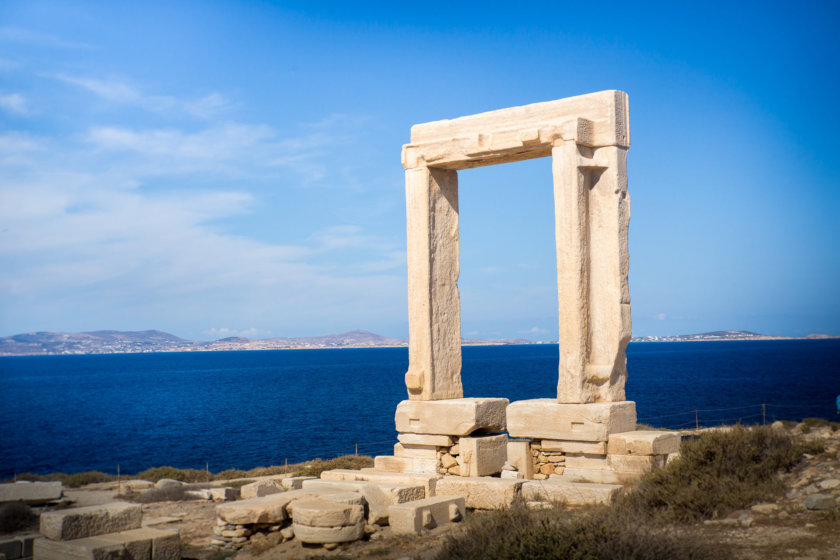
11) Paros (3 days)
The last island you will visit during your trip to Greece is Paros, only 40 minutes away from Naxos by boat.
For your 1st day, focus on the Northern part of the island and visit:
- Parikia, the capital. You will love its old town and the Church of Panagia Ekatontapyliani.
- Paros Park, to have a really nice stroll on the 3 marked trails (it takes around 2 hours)
- After your walk, enjoy the beach nearby.
- Naoussa, Paros’ trendy seaside resort, with its luxury boutiques and nice restaurants
- End your day at the beach: you can choose between Siparos Beach, Stefano Beach, Lageri Beach, Santa Maria Beach or Kolymbithres.
The next day, enjoy the Southern part of Paros.
First, you can drive to the 3 most picturesque and authentic villages of the island: Lefkes, Prodromos and Marpissa. If you prefer walking, you can drive to Lefkes, then take the Byzantine trail that connects the 3 villages.
Have your lunch at the port of Piso Livadi. The restaurants there are famous for their fresh grilled fish dishes.
In the afternoon, you can try one of the beaches nearby, like the Golden Beach, Logaras Beach or Faragas.
For your last day in Paros, book a boat trip around the island and Antiparos.
You can choose between a half-day and a full-day trip. It costs between 40 and 100€.
If you want to know more about the best things to do in Paros, you should read my detailed article: Visit Paros: the definitive guide.
Where to stay in Paros
In Paros, most of the accommodations are located around Parikia (that’s convenient, because its where the ferries arrive), or in Naoussa, the island’s main seaside resort.
You will find here a selection of the best places to stay in Parikia and Naoussa.
- Margarita: Located only 300m from the church of Parikia, and 400m from the beach. The double rooms with balcony are starting from 37€ per night. Strong points: the kindness and the advice of the owners, the warm welcome.
- Nostos Studios: Located only a minute walk from the beach and 1km from the port. The studios for 2 to 4 people, with a beautiful sea view, are starting from 70€ per night. Strong points: the terrace to admire the sunset, the warm welcome.
- Sunset View Hotel : Located only 10 minutes away from the port. The confortable rooms with balcony are starting from 80€ including breakfast. What I loved: the pool, the free shuttle from the port, the private parking. It’s the best value for money in Paros!
- Akrotiri Hotel: Located 2km from the port of Parikia. The clean and comfortable double rooms with sea view are starting from 100€ per night, with breakfast included. Strong points: the pool, the view, the great breakfast, the kind staff.
- Surfing Beach Village Paros: Located directly on Santa Maria’s beach, a 5-minute drive from Naoussa. The nice bungalows, decorated in Cycladian style are starting from 30€ per night including breakfast. Strong points: the pool, the free transfer to the port, the location, the free deckchairs on the beach.
- Hotel Senia: Located 200m away from the centre of Naoussa, on the seaside. The rooms and suites with private balconies and amazing view are starting from 105€, with breakfast included. What I loved: the 2 pools, the free parking, the great breakfast. It’s the best value for money in Naoussa!
- Paliomylos Spa Hotel: Located 800m away from Naoussa. The bright and large double rooms are starting from 110€ per night, including breakfast. Strong points: the pool, the spa with massages, the decoration, the complete and varied breakfast.
- Villa Bellonia: Located 12 minutes away from the beach and 1km from Naoussa. The lovely rooms with balcony or private terrace are starting from 120€ per night, with breakfast included. What I loved: The pool, the comfort, the amazing breakfast. It’s the best choice for a romantic gateway in Paros!
- Saint Andrea Resort Hotel: Located 1.5km away from Naoussa, this hotel offers luxurious accomodation with private terrace and view of the garden and the sea, starting from 200€ per night. Strong points: the location in front of the sea, the kind staff, the big pool. It’s my recommendation for a luxury stay in Paros!
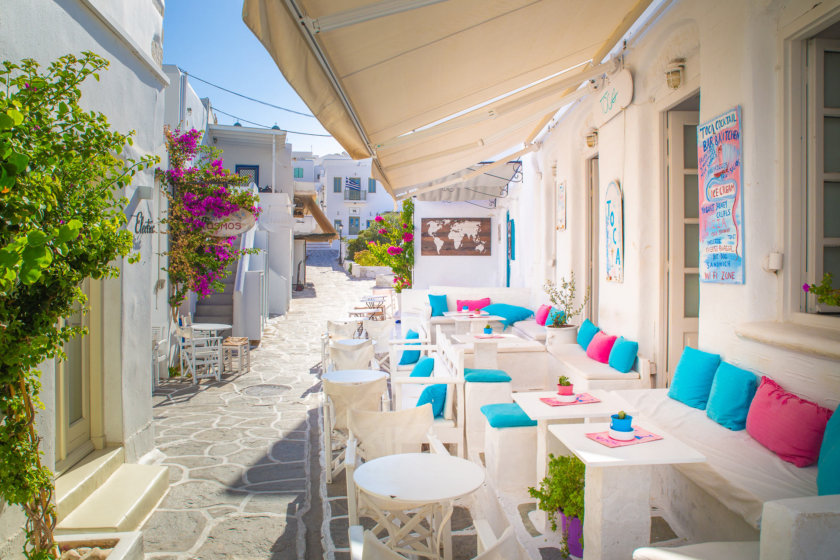
This 3 weeks itinerary in Greece is already over! It’s now time to fly back home.
From Paros, the fastest way is to return to Santorini, then directly fly back home. The ferry trip takes 2 hours.
You can also go back to Athens. In that case, it will take you 3 hours by ferry boat.
Depending on your flight’s departure time, you can also leave Paros at the end of the day before.
For a 20 days itinerary in Greece, you just have to remove a day on one of the islands.
For a 22 days trip to Greece, you can add a day in Athens and book a 1-day cruise to the Saronic islands. You can also add a day in Santorini or in another Greek island.
Now you know how to spend 3 weeks in Greece! If you have any questions about planning your 20, 21 or 22 days itinerary in Greece, don’t hesitate to ask me in the comments section.
On Voyagetips.com , I give you all my best tips and itineraries to plan your trip to Greece by yourself. (Click here to read all my articles about Greece)
However, if you prefer to book a Greece tour with a travel agency , I recommend you to check the 10 best Greece tours by clicking the button below:
If you want to rent a boat for a nice day at sea during your trip to Greece, you should book it with Samboat.
Motorboats, sailboats, yachts, small boats without a license, with or without a skipper: they simply have the most complete offer for boat rental.
So, what are you waiting for to book your boat trip in Greece? 😊
Greece travel guides
- Buy the Lonely Planet Greece guide on Amazon.com or on Amazon.co.uk
- Buy the DK Eyewitness Greece guide on Amazon.com or on Amazon.co.uk
You’re traveling to Greece ? These articles will help you !
Discover all my articles about Greece : All my articles to help you plan your trip to Greece are listed there.
- The 20 Best Things to do in Greece – The Ultimate Bucket list!
- The 15 Best Things to do in Peloponnese – All the must-see attractions
- Athens: The 20 Best Things to do and see
- Thessaloniki: The 12 best places to visit
- The 15 Best Cyclades Islands to visit – With all the must-see attractions
- Itinerary: 1 week in Greek islands – How to visit the Cyclades in 6, 7 or 8 days
- Itinerary: 10 days in Greek islands – The definitive guide to visit the Cyclades in 10 days!
- Itinerary: Greek Island Hopping routes – The best 2 weeks itinerary to visit the Cyclades
- Amorgos: The 8 best places to see
- Andros: The 7 must-see attractions and activities
- Naxos: Top 10 things to do
- Paros: The 10 best places to visit
- Santorini: The definitive guide
- Tinos: The 10 best things to do
- Rhodes: Top 12 best places to visit
You’re using Pinterest? Here is the picture to pin!
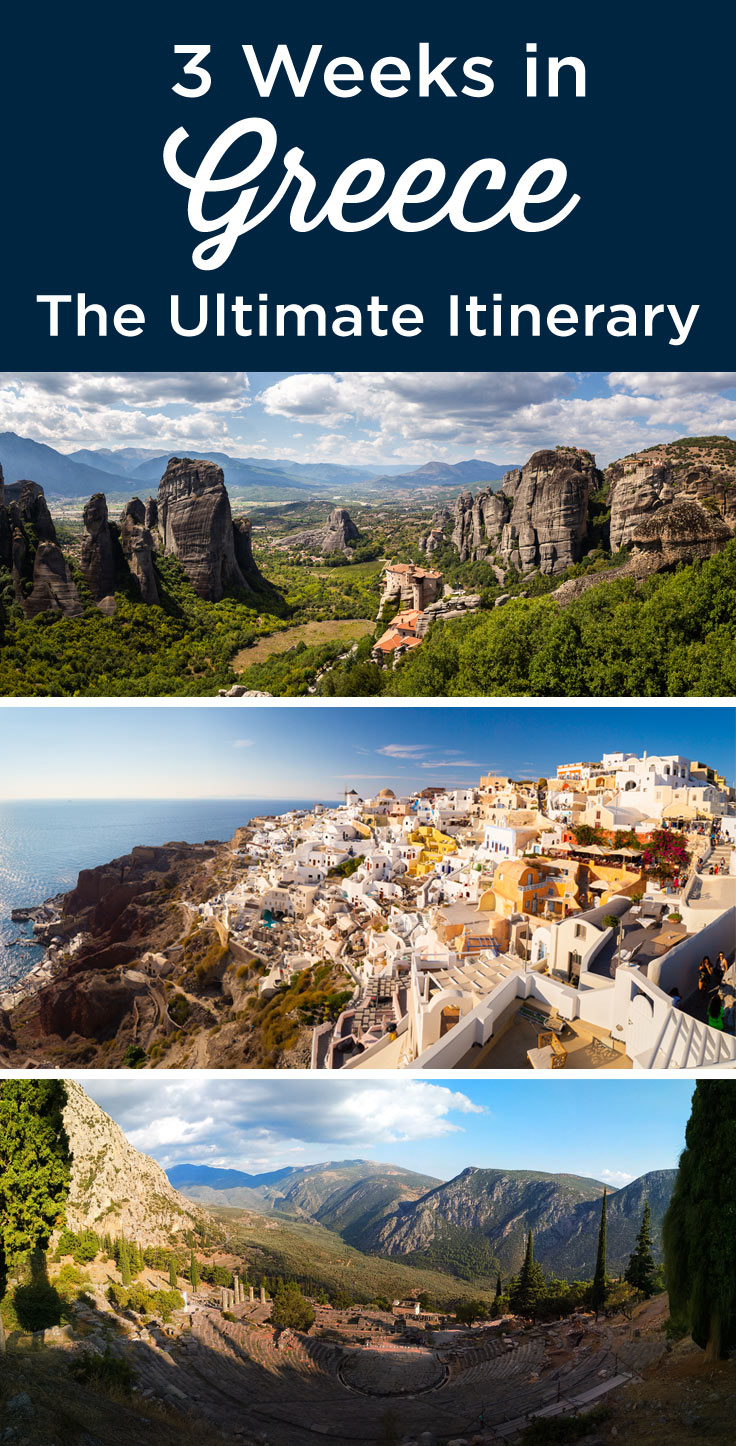
Creator of the Voyage Tips blog, travel and photography lover. I give you all my best tips to plan your next trip.
Related Stories
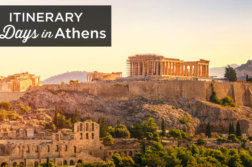
3 Days in Athens: The Perfect Itinerary (First Time Visit)
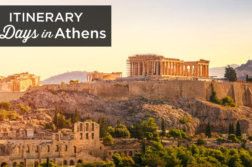
2 Days in Athens: The Perfect Itinerary (First Time Visit)
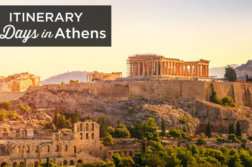
4 Days in Athens: The Perfect Itinerary (First Time Visit)
Discussion 6 comments.
Would the last 3 weeks in March be OK for a 21 day visit to Greece? Using inexpensive car rentals ., meals andhotels what would your suggested holiday cost for two people? Approximately?
Hello David,
For your trip, the part in continental Greece will be ok at the end of March. For the islands however, the ferries service is reduced from October to April (low season), so you will need to check on FerriesinGreece.com if the schedules are ok for you.
About the budget, you should check according to your dates, it’s the easiest. I don’t give a budget in the article as it depends on too many factors: the dates of the trip, the number of people, the type accommodation needed (for some people, “cheap” is a 10 euros dormitory, for others a 50 euros hotel room), the price of the car rentals at that time of the year, the price of the ferries tickets, the exact number of activities you will do, if you eat sandwiches, skip lunch etc…
About food price, you can usually eat a Gyros sandwich for about 3-4 euros, and at the restaurant get a main course for around 10 euros.
Fore the rest, I prefer to give you links to check by yourself, so you can see how much it would cost exactly for your trip!
– You can have a look at the hotels prices at your dates by clicking on the links in the article for every destination, in the “Where to stay in….” sections it’s very simple! Of course, you can then book another accommodation on the website if the ones I talk about don’t suit your needs. – You can see the car rentals prices on Booking.com Cars – And the ferries tickets on FerriesinGreece.com , as mentioned above.
Enjoy your trip to Greece, and if you have other questions, don’t hesitate!
Good morning, afternoon or evening, I do not know where you live! Your presentation is excellent!
I am very interested in your 3 weeks tour in Greece! Is there a way you could send me that itinerary With the suggestions of hotel! To print is a dreadful 30 +/- with half blank pages, adds, etc. I think we would probably spend less time on the islands, which one would you consider avoiding! We are great fans of history and for example spend 2 or 3 nights in places like meteora. My wife worked for many years for the IOC and would off course spend more time near Olympia if needed!
Hello Christian,
Thank you very much! I’m glad that my 3-week itinerary in Greece is helping you to prepare your trip.
Regarding the itinerary, I’m sorry but it’s not possible to send it to you in another format, as I simply don’t have it. It’s only available online. And yes I know about the printing problem, but with this type of blog it’s not really possible. It’s really not meant to be printed but to be viewed in a browser.
If you print it, you won’t be able to access the links for hotel, tour, activity and car bookings. For hotels, just click on the name of the hotel (in orange in the article) you are interested in and you can see the rates for your travel dates and book it.
And what you can do it you want to access this page without internet on your phone, you can save it for offline use.
On Android for example, click on the 3 vertical dots on the top right of your browser window to access the menu. Then click on the little arrow pointing down icon to save an offline version of the page. You will thus be able to access it even if you don’t have internet!
If you want to spend more time in mainland Greece and less on the islands, you can remove either Amorgos or Paros (depending on interests).
Enjoy you 3-week trip to Greece and don’t hesitate if you have any other questions.
Hi I really like this suggested 21 day trip to Greece. Is it possible to do this without renting a car meaning bus or trains? I really don’t like the idea of driving. Would like to enjoy the scenery and sights on a bus or train. We are looking to go end of June 2024 for 3 weeks. Many thanks.
Thank you! I’m glad that my 3-week itinerary in Greece helped you plan your trip.
Car hire is essential for visiting the whole of mainland Greece (from Mycenae to Thessaloniki). If you want to do it by bus (the train is even more complicated) you won’t be able to see everything and you’ll have to cut out a lot of visits.
On the other hand, you don’t need a car to visit Athens, and you can do without one on the Cycladic islands. However, you should bear in mind that the buses do not reach all the beaches for example, and that there is usually only one bus per hour.
Enjoy your (future) stay in Greece!
Leave A Reply Cancel Reply
Your Name (required)
Your Email (required)
Your Website (optional)
Save my name, email, and website in this browser for the next time I comment.
- Middle East
- North America
- Cheap car rentals: my best advice
- Back to Homepage

Greece Travel Guide
Last Updated: June 6, 2024

It’s also one of the more affordable countries on the Euro.
You can travel around Greece for a fraction of what you’d spend in other Western Europe, which is just one of the many reasons why I absolutely love visiting Greece.
I’ve been to Greece many times and have spent months exploring this country. I cannot say enough good things about it.
Visiting Greece is always the highlight of my summer European travels. There’s just something magical about this country. There’s an energy in the air and you can’t help but think, “Maybe I should never leave?” It sucks you in.
And, while the Greek islands get the most attention, the interior of the country — with its small towns, historic ruins, and mountain hikes — is too often overlooked and underappreciated.
So, while you may have a strong desire to stick to the islands, try to get to some of the places in the interior if you can. You won’t regret it.
This Greece travel guide combines all my knowledge and experience to help you plan an epic, affordable trip!
Table of Contents
- Things to See and Do
- Typical Costs
- Suggested Budget
- Money-Saving Tips
- Where to Stay
- How to Get Around
- How to Stay Safe
- Best Places to Book Your Trip
- Related Blogs on Greece
Click Here for Island and City Guides
Top 5 things to see and do in greece.
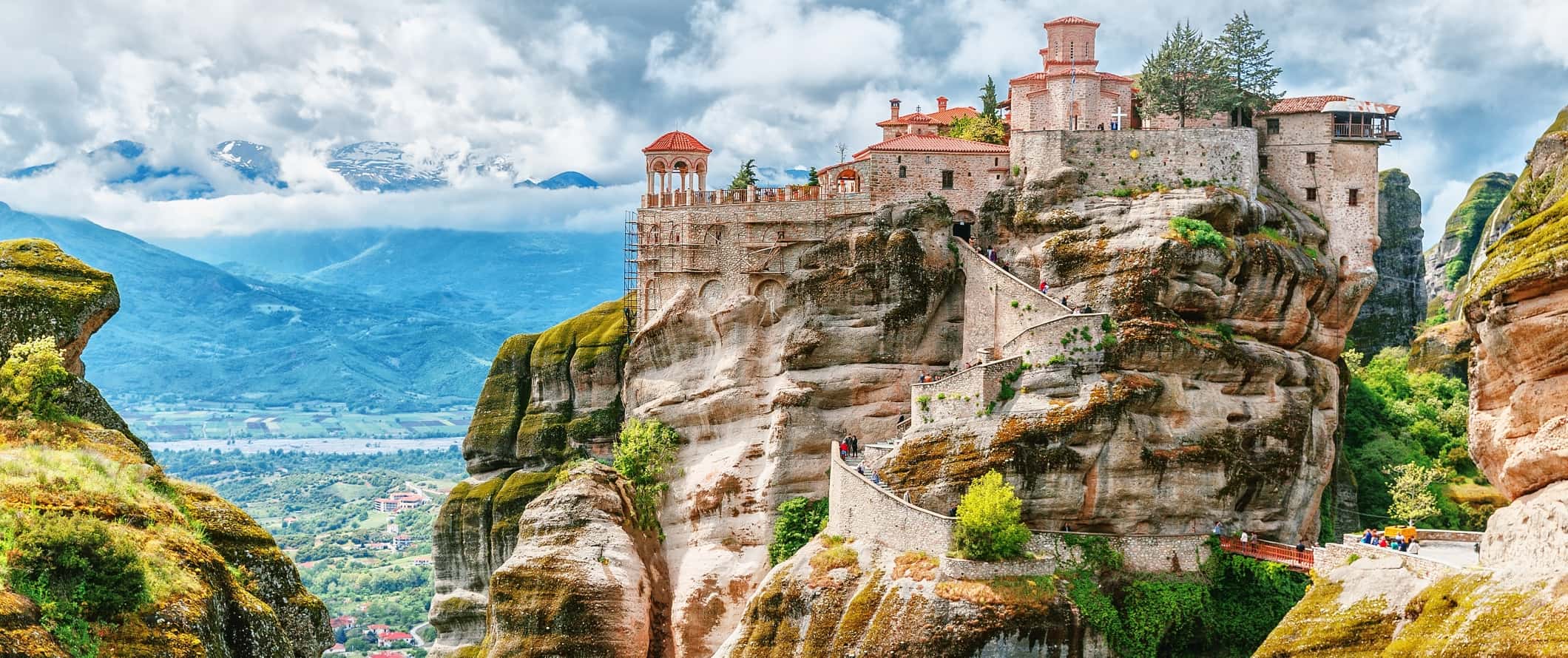
1. Visit the Acropolis
Located in Athens , this magnificent hilltop complex from the 5th century BCE includes ancient buildings and ruins like the temple to Athena and the famous Parthenon. A UNESCO World Heritage Site, this is an excellent place to learn about the city’s history. You’ll also get to enjoy an expansive view of the skyline and the nearby ruins. During the summer, it’s swarming with tourists so get there early. Admission is 20 EUR, or for 30 EUR you can get a 5-day combined ticket that includes many other archaeological sites in Athens. For a guided tour, Athens Walking Tours runs guided tours for around 55 EUR (including admission) that skip the line.
2. Discover historic Crete
Crete has a long, long history. It was once home to the ancient Minoan civilization (which predated Greek civilization), and you can still visit the Bronze Age ruins of Knossos, the ancient capital of the Minoan empire (also considered the oldest city in Europe). The island is the largest in all of Greece and has beautiful beaches (including a beach with pink sand), plentiful hiking, quaint towns, and delicious food and wine. It’s affordable and because of the island’s size, you can still escape the summer crowds. Don’t skip this island!
3. Hike up Mount Olympus
Mount Olympus is the legendary home of the Greek gods. Any climb to Mount Olympus starts from the town of Litochoro, 150 kilometers (93 miles) south of Thessaloniki. At 2,917 meters (9,570 feet) high, it’s the tallest mountain in Greece. The hike up is both strenuous and mystical. As you climb, it becomes abundantly clear why Greeks thought it was this mountain from which the gods ruled!
4. See Meteora’s monasteries
Meteora is famous for its monasteries that sit atop sheer rock mountains . They are a stunning sight to see and worth the steep trek up to the top. The monasteries date back to the 9th-10th centuries when Orthodox Christian hermit monks isolated themselves on the cliffs and in the many caves in the area. In the 12th century, the monastic community became more organized and in the 14th century the Great Meteoron Monastery was constructed (one of the ones that you can visit today). Although more than twenty monasteries used to perch on these sandstone cliffs, only six remain today. They are still active, with around 50 nuns and 17 monks living here. It’s a 3 EUR entrance fee per monastery.
5. Explore the islands
Other things to see and do in greece, 1. learn some history.
Greece is where western civilization began and everywhere you turn, you’ll find ruins that are thousands of years old. Start in Athens with the museums, the Acropolis and surrounding ruins in the Agora, and then set off to explore the ruins of Delphi, Sparta , Corinth, and Crete . There are also great archaeological museums everywhere to see artifacts up close and learn even more. This country is a history lover’s dream!
2. Explore Sparta
Sparta was the ancient rival of Athens and known for its fierce warriors (the entertaining but historically-inaccurate film 300 was based on the Spartans). The city has a long history and plenty of ruins to explore. There is no shortage of things to do , museums to visit, excursions to take, and places to eat when you visit the city. Be sure to check out the King Leonidas statue, visit the Archeological Museum, and explore the Diros Caves. I especially enjoyed the Museum of the Olive and Olive Oil, which takes you through how olives have become a staple of everyday life in Greece. It’s an often-overlooked city even though it’s only a 2.5-hour drive southwest of Athens. It’s a great place to learn some history without the crowds.
3. Attend the Athens Epidaurus Festival
Every summer, the Athens Epidaurus Festival hosts concerts and performance theater, including reenactments of famous Greek plays. There are operas, indie musicians, dance performances, lectures, and more. It’s a unique celebration of the performing arts in all their forms and worth your time if you’re in the city when it’s happening. Started in 1955, it’s one of the country’s top cultural events and runs for the whole summer (May-October). If it coincides with your visit, you’ll see just how proud the Greeks are of their past. Tickets for each performance cost as little as 5 EUR.
4. Soak up the sun in Corfu
The Cyclades Islands may get all the press but sunny Corfu on Greece’s west coast is also a good place to enjoy the beach too. It’s a popular destination for young backpackers, but once you get out of the main town, you can avoid them and their partying ways and get the island to yourself! There are plenty of quiet beaches, ancient ruins, and beautiful villages to explore. I especially recommend checking out the Achilleion a palace from 1890 as well as Nymfes Village, historic Corfu Town, and the incredible views from Angelokastro Castle. You’re just a stone’s throw away from Albania too.
5. Explore the Delphi Ruins
Delphi was a place of spiritual significance to the ancient Greeks. Located around 2.5 hours northwest of Athens, this UNESCO World Heritage Site is where the omniscient Oracle would contact the god Apollo and give his advice to those seeking good fortune. Although the eternal flame no longer burns inside the temple, a visit to the Temple of Apollo is obligatory if you’re nearby. Admission is 12 EUR and includes entry to the museum as well as the archaeological site itself (which includes far more than just the Temple of Apollo). There are a lot of day trips to Delphi from Athens starting around 48 EUR.
6. Explore Melissani Cave
This otherworldly cave grotto can be accessed by a short yet postcard-worthy boat tour. Located on the island of Kefalonia on the western side of Greece, here you can admire the seemingly magical ultramarine waters and the monumental walls that envelope you as you make your way through this hidden underground landscape. I love how you can see the lush forest and trees just above the cave walls. It’s totally surreal and the water is so clear that it looks like the boats are floating on glass. Admission is 7 EUR and includes the boat ride.
7. Hike the Samaria Gorge
Samaria Gorge in beautiful Crete is one of Greece’s National Parks and a UNESCO World Biosphere Reserve. For outdoor enthusiasts, this is considered one of the best hikes in Greece. While it isn’t the shortest or easiest trek (it’s 16 kilometers/10 miles), the gorge does promise beautiful landscapes, fantastic photo opportunities, and a great workout. Along the way, you’ll see the White Mountains and the trek ends at the lovely beach town of Agia Roumeli. The whole trek takes 5-7 hours to complete so make sure you bring water, sunscreen, and a hat as the heat can be overwhelming. The views are worth it though!
8. Experience the Patras Carnival
Every year in mid-January, the city of Patras (located 2.5 hours west of Athens) hosts what is basically a month-and-a-half-long party that starts on January 17th and runs to the beginning of Lent. There’s a slew of events both major and minor, increasingly crazy weekends, treasure hunts, and various costume parades (which even feature floats). It’s a lively time and as the largest such festival in Greece, attracting tons of revelers. If you want to attend, it’s a good idea to make hotel reservations well in advance as things fill up.
9. Tour the Archaeological Museum of Heraklion
The number one attraction in Crete , this museum also happens to be Greece’s second-largest archaeological museum (the museum in Athens is the largest). The artifacts here cover more than 5,500 years of history. One of my favorite pieces was a game board that dates all the way back to 1600 BC. The stunning collection here highlights the Cretan civilization (dating back from Neolithic times through to the Roman empire), with ancient pottery, jewelry, sarcophagi, colorful frescoes from Knossos, and more. Its Minoan collection is the most extensive in the world. You could easily spend hours here — especially if you love history like me. Admission is 12 EUR in the summer and 6 EUR in the winter.
10. Party on Ios
Ios has the wildest nightlife out of all the Greek islands. It is the summer party island where days are spent hungover on the beach and the nights are spent eating cheap food and drinking. If you don’t want to do that but still want to see Ios, it’s best to go to the eastern part of the island where it’s quieter. Don’t let Ios’ party reputation deter you from visiting though, it’s a beautiful, rugged island (and home to the grave of Homer, who wrote The Iliad and The Odyssey). It’s only busy from June-August so you can visit in the shoulder season to escape the party crowd.
11. Visit Thessaloniki
With more than 1 million inhabitants, Thessaloniki is Greece’s second-largest city after Athens. Although it dates back to 315 BCE, a lot of the city was destroyed by fire in 1917 and then by bombing during World War II. The result is a combination of more modern European city urban planning alongside Early Christian, Roman, and Byzantine monuments. In fact, Thessaloniki has more UNESCO World Heritage Sites (15!) than any other city in Europe. Be sure to visit the White Tower, the Rotunda, the Arch of Galerius, and Galerius Palace as well as the many churches (such as the Hagia Sofia and Hagios Demetrios). There are also several great museums here, including the Archaeological Museum, the Museum of Byzantine Culture, the Jewish Museum, and the Olympic Museum.
12. Go to Zakynthos
Just south of Kefalonia in the Ionian Sea is Zakynthos , one of Greece’s most popular islands. With its soft, sandy beaches and charming villages, it’s easy to see why this island is a fan favorite. It can be busy, particularly in the summer, so head away from the main tourist area (go north, west or inland) or visit in the off-season to escape the crowds. Zakynthos is also a breeding area for loggerhead turtles and you can see them on Lagana Beach or on Turtle Island but take care to do so responsibly. Other activities include seeing the Blue Caves, Marathonisi Islet, and Shipwreck Beach (you’ll need to take a boat tour to get there). There are also tons of churches, monasteries, and ruins to check out too.
13. Visit Monemvasia
Monemvasia is a medieval castle town in Laconia on the coast of the Peloponnese, around 90 kilometers (56 miles) southeast of Sparta . It’s a spectacular island to visit as it is built into the side of a huge rock! Monemvasia was founded by the Byzantines in the 6th century and is a quiet town perfect for relaxing on the beach before dining under the stars at seaside taverns or on cobbled streets in the town. There are ruins to explore and a mosque from the 16th century now houses the towns Archaeological Museum. You can also walk out to the lighthouse for incredible sea views. If you’re into hiking, there are some trails that will take you past chapels and settlements up to hilltops to admire the views or down to secluded beaches.
14. Explore Ioannina
Next to Lake Pamvotida in northwestern Greece, Ioannina is a castle town that is bursting with museums. Don’t miss the Byzantine Museum, the Ethnographic Museum, the Archaeological Museum, and the Silversmithing Museum (the area is well-known for its beautiful jewelry). Head to the castle at sunset for a peaceful end to your day. You can use the town as a base for exploring the nearby Pindus National Park, the Tzoumerka mountain chain, the Cave of Perama, and the Byzantine town of Arta as well. You won’t need more than a couple of days here but it is well worth stopping if you are passing through.
15. Go wine tasting
While Greece isn’t as internationally renowned for wine as other European countries such as France or Spain, it should be. The Greek wine-making tradition goes back at least 6,500 years and is still going strong. Wine regions are spread across the country, but Crete has one of the oldest wine-making traditions (and over 30 wineries to visit around the island), while the wineries of Santorini make for an interesting tour due to the way that grape vines must be grown here (to protect against harsh winds). Wine tours start around 50 EUR for a full-day tour.
16. Take a cooking class
Greek food is legendary. If you’re a foodie like me and want to learn more about the cuisine and culture behind it, try a cooking class . Bring a taste of your trip home by learning how to make some traditional recipes (including favorites like tzatziki and moussaka) while learning about the importance of each dish directly from a local chef. Cooking classes generally last 3-4 hours and cost 70-100 EUR.
17. Take a boat tour
A boat tour is one of the best ways to see the islands, especially as some beaches are only accessible by water. You can find these on most of the islands and they’ll take you to incredible places you can’t get to by car. Most tours also have stops for snorkeling and lounging on the beach, and many include drinks and lunch. Half-day tours start at 20 EUR, while full-day tours are around 30 EUR. Prices can vary greatly depending on where you’re taking the tour from.
18. Go diving
Diving has become increasingly popular in the Greek Islands. On Mykonos , Paradise Reef has a large variety of marine life, including sponges, barracuda, octopus, and starfish. Ios is popular with beginners due to its crystal-clear waters and relatively calm waves. On the other hand, Santorini has less marine life but tons of shipwrecks. Shore dives start around 50 EUR, while a two-tank dive on a boat starts around 70 EUR. You can also take a beginner discovery course for around 70 EUR or a variety of PADI courses starting at 65 EUR.
19. Tour an olive oil farm
For more information on specific destinations in Greece, check out these guides:
- Athens Travel Guide
- Corfu Travel Guide
- Crete Travel Guide
- Ios Travel Guide
- Mykonos Travel Guide
- Naxos Travel Guide
- Santorini Travel Guide
- Sparta Travel Guide
Greece Travel Costs
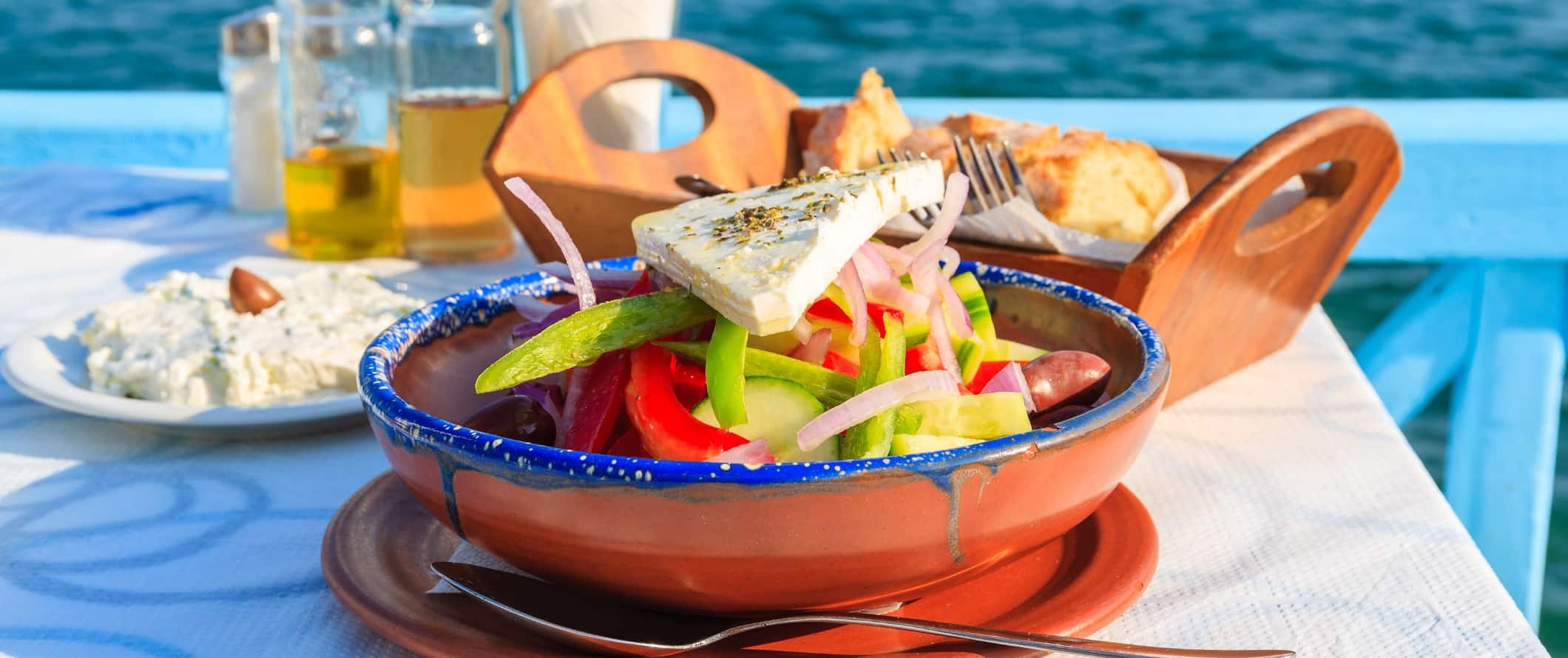
A room in a budget hotel that sleeps two can be found for 40-60 EUR (expect much higher prices — up to 50% higher — during the summer). Amenities at these hotels typically include free Wi-Fi, TV, a private bathroom, AC, and sometimes breakfast as well.
On Airbnb, you can find private rooms for 25-45 EUR in many cities and entire homes (including studio apartments) start at around 50 EUR per night.
Food – Greece is known for its food. Think seasonal vegetables (like olives), seafood, grilled meats, bread, feta cheese, and yogurt — all the staples of a fresh Mediterranean diet. To eat cheap, stick with eating gyros, souvlaki, and kebabs. These cost 3-6 EUR and easily fill you up. If you’re on a budget, you can live off these for as little as 15 EUR per day.
At a casual restaurant that serves traditional cuisine, expect to pay around 8-12 EUR for a main dish like moussaka and about 3-6 EUR for a glass of wine. A Greek salad costs between 6-8 EUR. Fish is more expensive, costing around 17-22 EUR for the catch-of-the-day.
Most restaurants charge for bread. The price is between .50-1.50 EUR. A bottle of water is about 2 EUR.
Fast food (think McDonald’s) costs around 9 EUR for a combo meal. A large pizza costs 8-11 EUR while Indian/Middle Eastern/Chinese food can be found for around 7-8 EUR for a main dish.
If you’re going out for dinner at a traditional taverna, expect to spend between 12-25 EUR depending on how much food you get. After that, the prices go up depending on how fancy the restaurant is!
Beer is 3-5 EUR while a latte/cappuccino is 3-4 EUR. Bottled water from the supermarket is 0.50 EUR.
If you cook your meals, expect to pay 35-50 EUR per week for groceries including pasta, vegetables, chicken, and other basic staples. It’s easy to eat on the cheap in Greece.
Backpacking Greece Suggested Budgets
If you’re backpacking Greece, my suggested budget is 40-60 EUR per day. This assumes you’re staying in a hostel, eating cheap food, cooking some of your meals, doing only free activities like hiking and relaxing on the beach, limiting your drinking, and using local transportation to get around. If you’re visiting the Greek islands or traveling during peak season, expect to spend on the higher amount of that. If you plan on drinking, add 5-15 EUR per day to your budget.
On a mid-range budget of 100-130 EUR per day, you can visit some museums and ruins, stay at a private hostel room or Airbnb, eat out more, enjoy some drinks, take the occasional taxi, and rent a bike or scooter to get around.
If you keep your drinking and costly activities down, you can easily do this closer to 100 EUR per day. On the other hand, if you’re staying on one of the more expensive islands like Mykonos or Santorini and drinking a lot, expect to spend closer to 150-180 EUR.
On a “luxury” budget of 235 EUR or more per day, you can stay in a hotel, eat out anywhere you want, drink as much as you want, do paid tours and more expensive activities (like diving), rent a car to get around, and generally enjoy the finer things in life! This is just the ground floor for luxury though. Expect to pay upwards of 50 EUR more per day on the islands.
Greece Travel Guide: Money-Saving Tips
Greece is affordable. Sure, islands like Santorini and Mykonos are expensive but, for the most part, if you are “keeping it local” you aren’t going to spend a lot of money here. Here are my favorite ways to save money when you travel to Greece:
- Use the Greek salad/bread rule – If the bread cover is .50 EUR or a Greek salad is less than 7 EUR, the restaurant is cheap. If the cover is around 1 EUR and a salad is 7-8.50 EUR, the prices are average. Anything more than that and the place is expensive. Use this rule to figure out how to eat at cheap restaurants.
- Eat super cheap – Gyros and other street snacks only cost a few euros and can keep you full for around 15 EUR per day if you’re on a tight budget.
- Rent a moped – It’s cheaper than a car and a fun way to see the various towns and cities — especially on the islands. You can usually rent a moped for around 15 EUR per day. Just drive carefully as Greek drivers tend to be aggressive.
- Get off the beaten path – Greece is a cheap country and even cheaper when you get away from the touristy islands or popular destinations. Head off the beaten path and you usually see prices drop by 30% or more.
- Book overnight ferries – Greece’s inter-island ferries can get expensive if you are visiting a lot of islands. Taking the overnight ferries can save you up to half off the normal price. Plus, it saves you a night of accommodation. Moreover, if you book the ferries around two months in advance, you can save up to 25% off the cost of your ticket.
- Get a ferry pass – Eurail has a ferry pass that has 4- and 6-trip options. The only caveat is that you can only take Blue Star and Hellenic Seaways ferries. Those tend to be the larger, slower ferries and, depending on the islands, might require you to connect somewhere. You’ll need to research routes in advance to see if the pass is worth it. I would search routes on FerryHopper to see if it works for you.
- Take public transportation – Buses, while sometimes running on inconvenient schedules, are the best way to get around Greece. Taxis are very expensive so minimize their use whenever you can and stick with the buses.
- Visit in the off-season – July and August are the most expensive months, so skip the middle of summer if you’re on a budget. Prices will be significantly cheaper.
- Stay with a local – Couchsurfing is a great way to get a free place to stay and meet locals. There are a ton of hosts throughout the country (I stayed with one in Athens) and it’s my favorite way to get to know the “real” Greece.
- Buy wine at the store – You can buy a great bottle of wine for around 5 EUR at the store. It’s a lot cheaper than drinking at the bar.
- Have an ISIC Card – To save on the cost of admission to museums and other tourist attractions, be sure to present a valid student card. The ISIC is typically accepted in places where a foreign student ID is not.
- Go to museums on their free admission days – Most museums have some days when admission is free. Check the Odysseus Culture website for details as they vary from museum to museum.
- Get combined tickets – Historical attractions in Greece are often priced so that it’s always a better deal to buy a combined ticket. If the sites you are going to offer one, buy it. It will save you money.
- Use points for accommodations – If you have credit card points that can be used for cash, using them to book accommodation can save you a ton of money. This post has more information to help you with the basics so you can start collecting points now and use them on your trip .
- Rent a car – Car rentals can be incredibly cheap in Greece. Prices start at just 20 EUR per day when booked in advance. Drivers need to be at least 21 and have had their license for one year. An International Driving Permit is also required. Discover Cars is an excellent place to find a car for your trip.
- Bring a water bottle – The tap water here is generally safe to drink so bring a reusable water bottle to save money and reduce your plastic use. LifeStraw is my go-to brand as their bottles have built-in filters to ensure your water is always clean and safe.
Where to Stay in Greece
Greece has something for everything and you can often find small family-run operations on the islands. It’s not hard to even find budget accommodations with nice extra like pools either! The specific destination guides have more places but here are some my suggested places to stay in Greece:
- Selina (Athens)
- Athens Hawks Hostel (Athens)
- BedBox (Athens)
- Studio Eleni (Mykonos)
- Caveland (Santorini)
- Bedspot Hostel (Santorini)
- Asterolithos Hotel (Santorini)
- Rethymno Youth Hostel (Crete)
- Intra Muros (Crete)
- The Pink Palace (Corfu)
- Francesco’s (Ios)
- FarOut Beach Club (Ios)
- Castle View Camping and Bungalows (Sparta)
- Lakonia Hotel (Sparta)
How to Get Around Greece
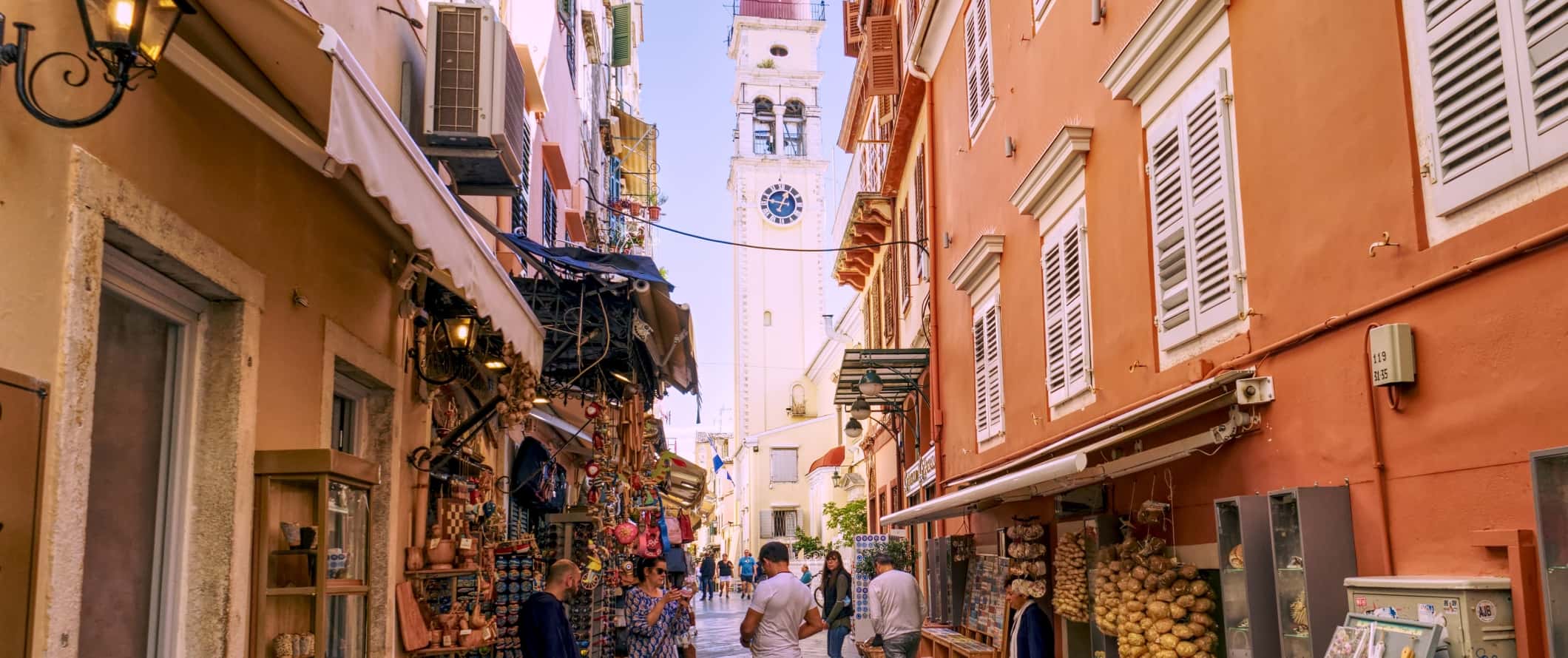
Buses – KTEL is the main bus operator in Greece. You can look up schedules and prices online, but their website is pretty outdated and you’re better off booking tickets at the actual bus station. Getting from Athens to Sparta takes around 3.5 hours and costs around 20 EUR, while Athens to Thessaloniki takes around 5.5 hours and costs around 42 EUR. Thessaloniki to Ioannina takes 3.5 hours and is 24 EUR.
Trains – Train travel in Greece isn’t great. Trains are unreliable and slow and there are only a few routes in the country between Athens and other major cities, like Thessaloniki and Patras. You’re better off driving or taking the bus. However, if you do get the train, a trip from Athens to Thessaloniki takes about 4.5 hours and costs at least 20 EUR.
Ferries – Because Greece has a lot of islands, you have to deal with taking ferries to get around. Expect to spend an average of 35 EUR per trip, though you could spend as little as 10 EUR if the islands are really close together. From Athens, most ferries to the Cyclades Islands start around 40 EUR.
Taking the overnight ferries can save you up to half off the normal price plus save you a night of accommodation so if you’re not in a rush, book those!
There are many different ferry companies, and most are created equal. High speed ferries or catamarans cost a lot more (book in advance). You can research routes and ticket prices using FerryHopper and gtp.gr .
If you’re ok traveling on the slower ferries and your routes match the available routes, the Eurail/Interrail ferry pass is worth considering as you’ll get discounts with this pass. Search routes on FerryHopper to see if it works for you.
Flying – Flying is a quick and affordable way to get around Greece and between islands (though not all islands have airports). A one-way flight from Athens to Santorini or Mykonos takes less than one hour and costs around 25-35 EUR. Flights can dip to as little as 20 EUR when booked in advance.
Scooter/Quad rentals – Renting a scooter or ATV is a really popular way to discover many parts of Greece, particularly the islands. It lets you explore at your own pace and is quite affordable. Scooter rentals cost between 15-25 EUR per day depending on the location and if it is peak season or off-season. ATVs cost around 38-50 EUR per day.
Car rental – Car rentals here are super affordable, starting at just 20 EUR per day for a multi-day rental. Expect manual transmissions. Drivers need an International Driving Permit before renting as well and need to be at least 21 years old. For the best rental car deals, use Discover Cars .
When to Go to Greece
Peak season in Greece is from June-August. Temperatures hover around 33°C (92°F) and popular destinations like Santorini and Mykonos experience a huge influx of visitors. Prices increase during this time as well. But the overall atmosphere and weather are great during this time, so it’s still worth visiting during peak season.
Personally, I think the best time to visit Greece is shoulder season (March-May and September-October). It’s still warm during these times but there aren’t as many crowds and prices are cheaper. It’s also easier to meet locals during this time. There is more rain during this time of year, so pack for that. Overall, it’s a particularly great time to hang out in the Mediterranean.
Winter is from November to February. It gets cold and tourist crowds thin out considerably. There’s quite a bit of rain and temperatures vary quite a bit from north to south, with it sometimes dropping to 11°C (52°F) in some places (Athens sometimes gets snow). Many of the islands — particularly Santorini and Mykonos — almost shut down entirely during the off-season. In short, I’d skip a winter visit unless you’re only planning to visit museums.
How to Stay Safe in Greece
Greece is very safe for backpacking and solo travel. Violent attacks are uncommon. Petty crime is about the worst that could happen to you, specifically pickpocketing in Athens, where it is prevalent. Fortunately, Greek police have really cracked down on perpetrators. Nevertheless, be aware of your surroundings and keep your valuables out of sight when you’re in markets, on busy streets, or when using public transportation.
Solo female travelers should generally feel safe here. However, the standard safety precautions apply (never leave your drink unattended at the bar, never walk home alone intoxicated, etc.). For specific information about a place, check out one of the many incredible solo female travel blogs on the web. They’ll give you tips and advice that I can’t.
You won’t find a lot of travel scams in the country but read this article on common travel scams to avoid so you know what to avoid.
If you go out hiking, always check the weather first. Bring sunscreen, water, and a hat. It can get incredibly hot here!
Be careful when driving as Greek drivers tend to be on the aggressive side and some of the roads aren’t very well maintained.
If you experience an emergency, dial 112 for assistance.
Always trust your gut instinct. Make copies of your personal documents, including your passport and ID.
The most important piece of advice I can offer is to purchase good travel insurance. Travel insurance protects you against illness, injury, theft, and cancellations. It’s comprehensive protection in case anything goes wrong. I never go on a trip without it as I’ve had to use it many times in the past. You can use the widget below to find the policy right for you:
Greece Travel Guide: The Best Booking Resources
These are my favorite companies to use when I travel. They consistently have the best deals, offer world-class customer service and great value, and overall, are better than their competitors. They are the companies I use the most and are always the starting point in my search for travel deals.
- Skyscanner – Skyscanner is my favorite flight search engine. They search small websites and budget airlines that larger search sites tend to miss. They are hands down the number one place to start.
- Hostelworld – This is the best hostel accommodation site out there with the largest inventory, best search interface, and widest availability.
- Booking.com – The best all around booking site that constantly provides the cheapest and lowest rates. They have the widest selection of budget accommodation. In all my tests, they’ve always had the cheapest rates out of all the booking websites.
- HostelPass – This new card gives you up to 20% off hostels throughout Europe. It’s a great way to save money. They’re constantly adding new hostels too. I’ve always wanted something like this and glad it finallt exists.
- Get Your Guide – Get Your Guide is a huge online marketplace for tours and excursions. They have tons of tour options available in cities all around the world, including everything from cooking classes, walking tours, street art lessons, and more!
- The Man in Seat 61 – This website is the ultimate guide to train travel anywhere in the world. They have the most comprehensive information on routes, times, prices, and train conditions. If you are planning a long train journey or some epic train trip, consult this site.
- Rome2Rio – This website allows you to see how to get from point A to point B the best and cheapest way possible. It will give you all the bus, train, plane, or boat routes that can get you there as well as how much they cost.
- FlixBus – Flixbus has routes between 20 European countries with prices starting as low 5 EUR! Their buses include WiFi, electrical outlets, a free checked bag.
- SafetyWing – Safety Wing offers convenient and affordable plans tailored to digital nomads and long-term travelers. They have cheap monthly plans, great customer service, and an easy-to-use claims process that makes it perfect for those on the road.
- LifeStraw – My go-to company for reusable water bottles with built-in filters so you can ensure your drinking water is always clean and safe.
- Unbound Merino – They make lightweight, durable, easy-to-clean travel clothing.
- Top Travel Credit Cards – Points are the best way to cut down travel expenses. Here’s my favorite point earning credit cards so you can get free travel!
- Ferry Hopper – If you’re looking to book your ferries, this website is an easy way to search the various companies, piece together routes, and book your tickets.
- Take Walks – This walking tour company provides inside access to attractions and places you can’t get elsewhere. Their guides rock and they have some of the best and most insightful tours in all of Greece.
Greece Travel Guide: Related Articles
Want more info? Check out all the articles I’ve written on Greece travel and continue planning your trip:
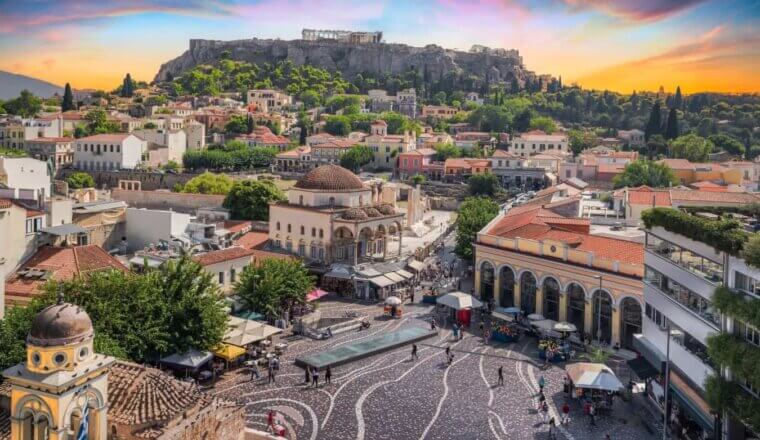
The 6 Best Hotels in Athens
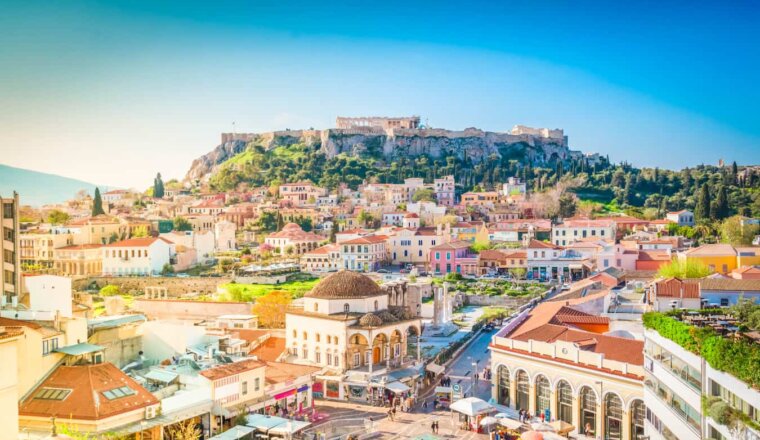
The 6 Best Hostels in Athens
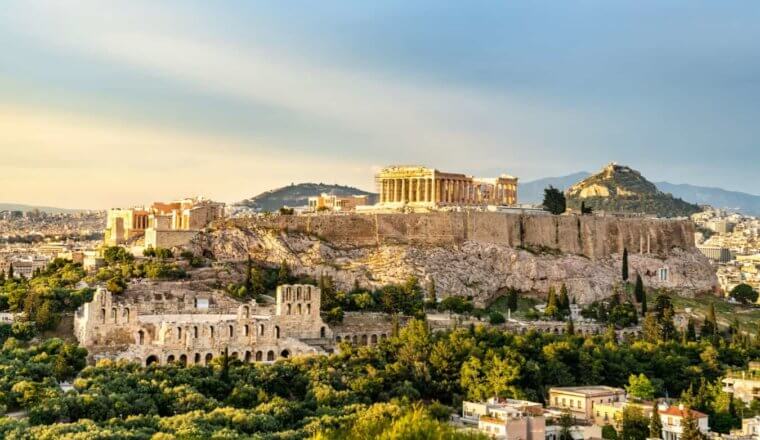
Where to Stay in Athens: The Best Neighborhoods for Your Visit
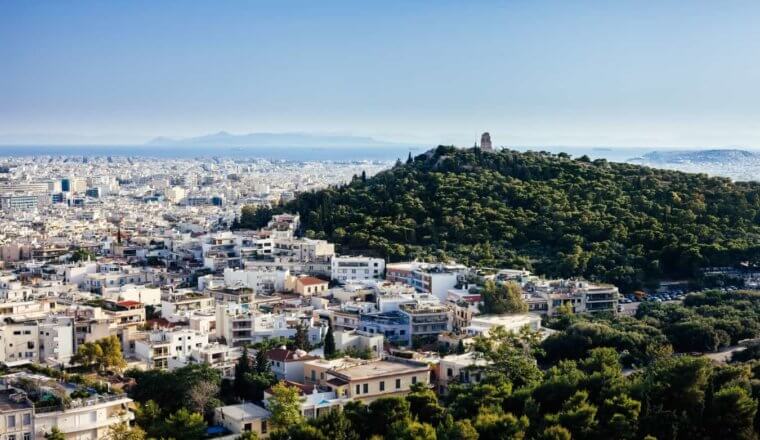
The Best Walking Tours in Athens
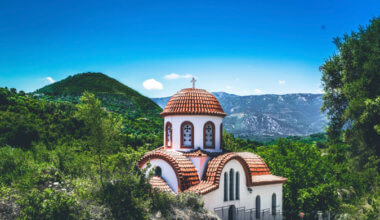
Traveling Greece: How Much Does It Cost?
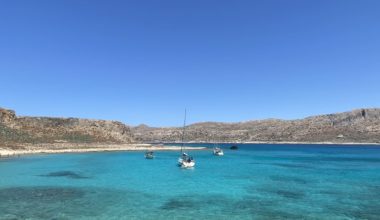
Fulfilling Childhood Dreams in Crete
Get your free travel starter kit.
Enter your email and get planning cheatsheets including a step by step checklist, packing list, tips cheat sheet, and more so you can plan like a pro!

- Where To Stay
- Transportation
- Booking Resources
- Related Blogs
Best Time to Visit
Weather & Climate
Athens International Airport Guide
Cities to Visit
Neighborhoods to Explore
Day Trips from Athens
48 Hours in Athens
Top Things to Do
Top Temple Sites
Best Beaches
Mount Olympus
Ancient Greek Theaters
Foods to Try
Top Restaurants in Athens
Best Bars in Athens
Your Trip to the Greece: The Complete Guide
Your Trip to Greece: The Complete Guide
:max_bytes(150000):strip_icc():format(webp)/FerneArfin-5b6f00c446e0fb0050324e74.jpg)
A visit to Greece can be a dream vacation as long as you know what your dream really is and plan for it. The country's beautiful beaches and world-famous archaeological sites are just two (of many!) reasons to visit Greece . But whatever your reason, use this guide to learn more about the various regions of Greece, how to travel around the country and what to expect of Greece's food, culture, and sights.
Planning Your Trip
Best Time to Visit : Spring and early fall are the best times to visit when there are fewer tourists but the sea is still warm and the weather fine for outdoor activities.
Language: Greek . English is spoken in the cities and areas popular with visitors.
Currency: Euro (€) .
Getting Around: Train service in Greece is limited. An exception is the InterCity Network run by TrainOSE that connects Athens to Thessaloniki and several other cities. Buses, including both local and intercity services, are run by regional cooperatives known as KTEL. The services are not nationally coordinated, so you need to look up KTEL for the region you plan to visit. This KTEL Macedonia website (covering the area around Thessaloniki) is typical. Athens and Thessaloniki have local and suburban public transportation systems. Athen's Metro (expanded for the Olympics) is particularly good, cheap, and clean. Hundreds of ferries connect the mainland to the islands and mainland coastal ports to each other. Private companies run the ferries, and there is no nationwide timetable. Save time and money by using the services of a Greek travel agent to book ferries and for information about buses and trains. Greek websites on these subjects are not well developed for international travelers, but agents are common in ports and city centers.
Travel Tip: Driving in Greece is not for the faint-hearted. Even though many of the highways have been improved in recent years, mountain roads can be hair raising. That, coupled with Greek driving habits, means that the country has a much higher accident rate than elsewhere in Europe.
Things to Do
Eighty percent of Greece is covered in mountains, divided into many peninsulas, and separated by canals . There are also about 6,000 islands, 227 of them inhabited, and thousands of miles of coast. Getting from one part of the country to another can be complicated so it's important to know, in advance, what you want to do and where to find it:
- Two major cities, Athens , the center of Classical Greece, and Thessaloniki , the heart of Byzantine Greece, are hubs of culture, museums, fashion, nightlife, shopping, dining, and festivals. Both are good bases for touring.
- Fragrant woodlands, dramatic mountains, olive groves and sacred sites dedicated ancient oracles and gods cover mainland Greece. Byzantine fortresses and remote monasteries perch between deep, folded mountain valleys.
- Wherever you go in Greece you'll find thousands of years of history, from the earliest signs of democracy to the temples and theaters of the ancient world as well as the remnants of the Romans and the Byzantines. The Parthenon, the Acropolis , and the Temple of Apollo at Delphi are among the most popular sites.
- The thousands of Greek islands and beaches are an essential part of Greece and Greek culture and are surprisingly easy to reach by plane or ferry. Islands like Crete , Santorini , and Kefalonia are worth a trip on their own.
What to Eat and Drink
Though the foodie scene in the cities is becoming pan-European and international, the best things to eat in Greece are still fresh and local. Octopus and kalamari (fried rings of squid) are popular taverna fare. Fresh Greek salads with feta or local cheeses, a squeeze of lemon and tangy olive oil, are part of every meal. Look for sweets flavored with mastic, a gum from evergreen trees. You may be welcomed to your hotel with a spoonful of cherry or apricot jam and a glass of water.
Take some time to stop at a kafenio (cafe) for coffee and honey-soaked Greek pastries, like baklava and kataifi , or the custard pie known as galaktoboureko . A popular outdoor coffee drink, apparently invented accidentally in Thessaloniki, is frappé. It's made of instant coffee, ice water, and sugar beaten with an electric whisk to form a foam.
The Greeks these days are producing outstanding red and white wines from vineyards in Crete and Santorini. Ouzo, flavored with aniseed, is similar to French pastis drinks. It is sweet and robust and, when added to water, turns white. It packs a lethal punch. If you have a taste for firewater, try the raw spirit made from the byproducts of winemaking. It's called raki in Crete and Tsipouro or Tsikoudia everywhere else. As far as local beers are concerned, microbreweries have caught on, and there are excellent craft beer makers. Look for Red Donkey, a fruity amber ale from Santorini.
Learn more about what to eat and drink in Greece, including the top 10 dishes to try in Greece and the best restaurants in Athens .
Where to Stay
Accommodations in Greece range from quirky Athens boutiques in bohemian neighborhoods like Psirri to corporate giants, like the Athens Hilton in the city center or the luxury Hotel Grande Bretagne in Syntagma Square. The area immediately west of Syntagma Square and into Monastiraki has a concentration of moderately priced three and four-star hotels.
Learn more about the best hotels in Athens, as well as top neighborhoods to visit in Athens .
Getting There
The main international airport for Greece is Athens International Airport , with connecting flights to Thessaloniki, Kalamata , and several of the islands, including Crete and Santorini. Athens Airport is on a main highway and is about 20 minutes from the city center by car or taxi (taxi fares are set by law). Car rental, pick up and drop off, is easiest to arrange at the airport. The cheapest and fastest way to get to the airport from Athens is by Metro Line 3. The airport Metro station is well marked. There are also bus services from the airport to the ports of Piraeus, Rafina, and Lavrio.
To find out more about getting to Greece, explore the best ways to get to Athens Airport , how to take the ferry from Athens to Santorini and how to avoid taxi scams in Greece .
Culture and Customs
Outside of the big cities and major tourist resorts, Greece is a relatively conservative country. In small towns and rural areas, women should dress modestly, avoiding bare shoulders, exposed bosoms, tight or very short skirts or shorts. Even in the cities, cover up before entering Greek Orthodox churches. And, if you are visiting monasteries like the ones at Meteora, don't wear trousers. If you do, the monks will give you wrap around skirts to put on over pants.
Nude and topless bathing is tolerated in many parts of Greece, and on some of the islands, like Crete and Spetses, a short walk beyond the end of a popular beach will take you to a nude beach area. But check with your hotel or a local taverna first. Nude bathing is still technically illegal. On the small islands and in more rural places, Greek families from the small mountain villages visit the beach on weekends with their families. Nude bathing that may be tolerated during the week is not allowed on weekends and school holidays.
Check out everything you need to know about nude bathing in Greece and discover Crete's best nude beach.
Money-Saving Tips
- Travel in the off-season: The most popular time to visit, with the highest prices from June to September. Visit in May or October, and the weather is reliably warm, but prices are much lower.
- Consider self-catering: That's what Europeans call vacation rentals. Efficiency apartments and small villas are usually cheaper than hotel accommodation, and you can save quite a bit by cooking some of your meals yourself.
- Rent an electric bicycle or moped: They're cheaper than rental cars and popular for getting around on islands and in coastal resorts. Just be careful. They are very noisy, and you may not be aware of traffic coming up behind you.
- Take advantage of what's free: Most museums and historical attractions have free admission on certain days or for certain groups of travelers. Look up the site you're interested in on the Greek Ministry of Culture & Sports website . In the left column of your attraction's listing, click on "Information," and you'll find all the free days.
Greek National Tourism Organisation . "General Info."
Greek National Tourism Organisation . "Geography."
The Weather in Greece: Climate, Seasons, and Average Temperature by Month
Top 18 Things to Do in Athens, Greece
Planning a Honeymoon in Greece: The Complete Guide
The Best Tours of Athens, Greece
'Mamma Mia!' Filming Locations: The Complete Guide
How to Travel from Venice to Athens by Plane, Ferry, and Cruise
Traveling Safely in Greece
48 Hours in Athens: The Perfect Itinerary
Don't Make These 8 Common Tourist Mistakes in Greece
Cheap Flights to Athens
Visit the Temples of the Greek Gods and Goddesses
Santorini Map and Travel Guide
The Towns of Santorini: The Complete Guide
The Top 8 Greek Cities to Visit
How to Travel from Athens to Santorini by Ferry and Plane
The Top 20 Things to Do in Greece
15 tips for travelling in Greece
Book your individual trip , stress-free with local travel experts
Select Month
- roughguides.com
- travel-tips-greece
Plan your tailor-made trip with a local expert
Book securely with money-back guarantee
Travel stress-free with local assistance and 24/7 support

written by Joanne Owen
updated 24.05.2021
Though arguably best known - and most visited - for its stunning islands, Greece is astoundingly diverse. Beyond its beautiful beaches, Greece boasts mighty mountains and caves, salt marshes and cloud-forests. Its weather ranges from blazing summers to snowy winters. In short, few countries have such varied landscapes and seasonal extremes. Then there’s its ancient history , glorious food , and warm Hellenic welcome.
1. Avoid peak season
2. be inspired by fiction, 3. learn a little lingo.
- 4. Embrace island-hopping
5. Stay put in paradise
6. meander the mainland.
- 7. Take-in the capital
8. Take care in the capital
9. eat and drink like a local, 10. embrace greek time, 11. embrace greek culture, 12. be sensitive..., 13. ...but don’t be shy, 14. share the wealth, 15. use your judgement.
One thing’s for sure, visiting Greece has the potential to deliver all manner of unforgettable trips - you just need to know what you want, where to find it, and to do a little planning. With that in mind, here are our top 15 Greece travel tips - from what to know before travelling to Greece , to top tips for Greece getaways that take you off-the-beaten-track.
Travel ideas for Greece, created by local experts

10 days / from 2632 USD
The Historical and Mythological Cyclades islands
The Cyclades islands include two of the most famous Greek Islands: Mykonos and Santorini. Visit these and some of the smaller, quieter, islands. With white washed houses, narrow cobbled streets, blue domed roofs and stunning beaches, they are what Greece is all about.

9 days / from 2226 USD
A secluded villa stay on Mainland Greece
Stay in a secluded private villa with magnificent views to the sea and explore this beautiful corner of Mainland Greece with your own rental car. Under the impressive Mt Taygetos in Southern Peloponnese, the region of Mani will give you a snapshot of authentic Greece.

10 days / from 2012 USD
Along the Coast of Crete: from Heraklion to Platanias
As Greece's largest island, Crete's culture and atmosphere is distinctly different from mainland Greece. Thousands of years of unique culture and rich history complement the island's untamed natural beauty. Explore Crete at your own pace with this unique self-drive trip!

8 days / from 1594 USD
Cultural and natural sites of Athens and the Peloponnese
Welcome to wonderful Athens for an unforgettable adventure. Enjoy getting lost in this maze of charming streets, where the modern sits beautifully with the ancient. Venture out into the Peloponnese on mainland Greece, and discover historical, cultural and natural wonders the region is blessed with.

10 days / from 3440 USD
An Odyssey Adventure in Ancient Greece
Learn the secrets of Ancient Greek mythology and history visiting the world-renowned site of the Acropolis, explore the unspoiled landscape of Peloponnese, become a true Spartan warrior in Thermopylae and much more - this self drive tour takes you on a real Greek adventure.

15 days / from 2686 USD
Explore Classical Greece: self-drive motorhome trip
This 15-days motorhome road trip will take you to Athens, the city of legends and some of the most fascinating classical sites, such as Epidaurus, Olympia, Delphi and the man-made marvels of the Corinth Canal and Byzantine monasteries of Meteora. A perfect tour for history.
Unless you absolutely have to travel to Greece during high summer because of school holidays, try to visit outside the peak season (late July to the end of August). At this time, the weather is scorching, prices soar, and you’ll struggle to escape the crowds - this is when the Greeks take their holidays too.
For a winter pick-me-up with added colour and culture, you could consider visiting for the February Carnival (Apokriátika). The celebrations span three weeks, ending during the seventh weekend before Easter. For peak pageantry, check-out Patras Carnival - one of the largest and most flamboyant in the Mediterranean (and the third largest of its kind in the world). Patras itself is the largest city of The Peloponnese and its carnival boasts a chariot parade and exuberant costume parties. More of our winter travel tips for Greece can be found here .

Monastery in Metéora, Greece - a peak springtime experience © Shutterstock
It goes without saying that scaling mountain peaks in the peak summer months won’t be a walk in the park. So, the adventurous hikers among you should consider visiting in May - when warmer weather is on its way, but before the mercury has risen. From exploring the Meteora geological marvels and Eastern Orthodox monasteries of central Greece on treks like this , to tackling the iconic Imbros Gorge in southern Crete, spring is pretty much perfect for outdoor adventuring in Greece.
For more round-the-year information, head here to read our full when-to-visit Greece guide.
As well as researching where to go, when to go, and what do to, why not get yourself in the mood for Greece through reading fiction? There’s no shortage of quality material to enrich your understanding of the country - from re-workings of ancient history and culture, to contemporary page-turners.

Ancient Theatre of Epidaurus, Peloponnese - where classics came to life © Shutterstock
To begin at the beginning, you could finally get round to reading Homer’s The Iliad and The Odyssey. For fabulous contemporary novels centred on ancient myths, try Madeline Miller’s The Song of Achilles and Circe , or Mary Renault’s The King Must Die , a magnificent account of Theseus in Minoan Crete. Then there’s Margaret Atwood’s ingeniously inventive The Penelopiad , and Pat Barker’s The Silence of the Girls.

Assos village in Kefalonia island - Captain Corelli territory © leoks/Shutterstock
Moving away from myths, Crete-set Zorba the Greek by Nikos Kazantzakis is considered a classic, while Captain Corelli’s Mandolin well and truly put Kefalonia on the map. Also read our guide to the best things to do in Kefalonia and find some useful ideas for your trip.
For real-life family drama and animal antics aplenty, Gerald Durrell’s Corfu-set memoir My Family and Other Animals is a must-read. Or how about Victoria Hislop’s The Island and The Thread for Greek history and atmosphere?
With literally hundreds of Greek-set literary treasures to choose from (we’ve hardly touched the surface here), you might just find your perfect Greek destination after reading one of them. What’s more, by the time you travel to Greece, you’ll be in the perfect frame of mind - when it comes to pre-trip tips for Greece, they don’t come more inspirational than this.
Related to getting your Greek on through reading fiction before you travel to Greece, why not also learn (at least) a little of the language?
First up, it will make your trip all the more immersive. Secondly, Greeks don’t generally expect foreigners to know any Greek, so they love it when you do know a few words. What’s not to like about impressing (and ingratiating yourself) with locals?

With a few words in your lexicon, you'll be ordering boukáli krasí in no time. Santorini wine and island image © Shutterstock
Given the high levels of English throughout the country, learning Greek isn’t at all necessary. But that's not the point. Your efforts will be rewarded when your status is elevated from regular tourist to honoured “xenos”, which means both “foreigner” and “guest”.
If you’re wondering what to know before travelling to Greece, take a look at the Rough Guides Greek Phrasebook . One thing’s for sure - if you follow this advice (one of our top Greece travel tips) you’ll never have need of the phase “it’s all Greek to me again.” Talking of which, we also recommend reading John Mole’s hilarious memoir, It’s All Greek to Me .
4. Embrace island-hopping
These days most people tend to stick to one island per trip (the golden age of Greek island hopping was back in the 70s and 80s). Having said that, there’s no reason you can’t buck the trend and plan a multi-island adventure. While island-hopping can make travelling in Greece more complex, it can be done. What's more, it can make for a richly diverse experience.

Stunning Sarakiniko beach on Milos, Greece © Shutterstock
For inspiration, you could take a look at our guide to the best Greek islands , and then start researching what’s possible. Ferry services are still plentiful and mostly reliable through the warmer months, so why not choose a group of islands like the Ionians , the Dodecanese or the postcard pretty Cyclades ? Most islands offer trips to see some of their smaller gems, such as this full-day sailing cruise around the Small Cyclades from Paros. Or, if you’re flying into Athens, you could take a tour of the scenic Saronic Islands (Hydra, Poros and Aegina). Our Greece experts share some itinerary ideas here .

Paxos, the smallest group in Greece's Ionian Islands © Shutterstock/Heracles Kritikos
Related articles from the blog

If you don’t the fancy multiple moves that come with island-hopping, why not look to park yourself on a lesser-visited island for the duration of your trip? For travellers looking to discover the country beyond the trappings of resort-life. this is one of our best tips for Greece.
Take lovely Lesvos , for example. It might be the third-largest island behind Crete and Evvia, but it’s surprisingly little visited. Its coastline boasts a bounty of beautiful beaches, while main town of Mytilini has an impressive seafront, an extensive fortress, plus plenty of places to eat and drink. The island isn’t short of pretty small towns either, among them Molyvos and Ayiassos. What’s more, the large shallow Gulf of Kalloni includes salt marshes that are a birdwatcher’s dream.
Of course, there’s nothing wrong with taking a well-travelled path. It's hardly a hidden gem, but with stunning sunsets, beautiful beaches , volcanic hiking trails, and lively nightlife, Santorini is the perfect place to enjoy a varied Greek Island getaway . Known for its iconic blue-domed churches, white houses carved into cliffs, and epic caldera views (not to mention the sunsets that will take your breath way - really), it’s no wonder that Santorini’s Oia is one of the most photographed spots on all the Greek Islands.
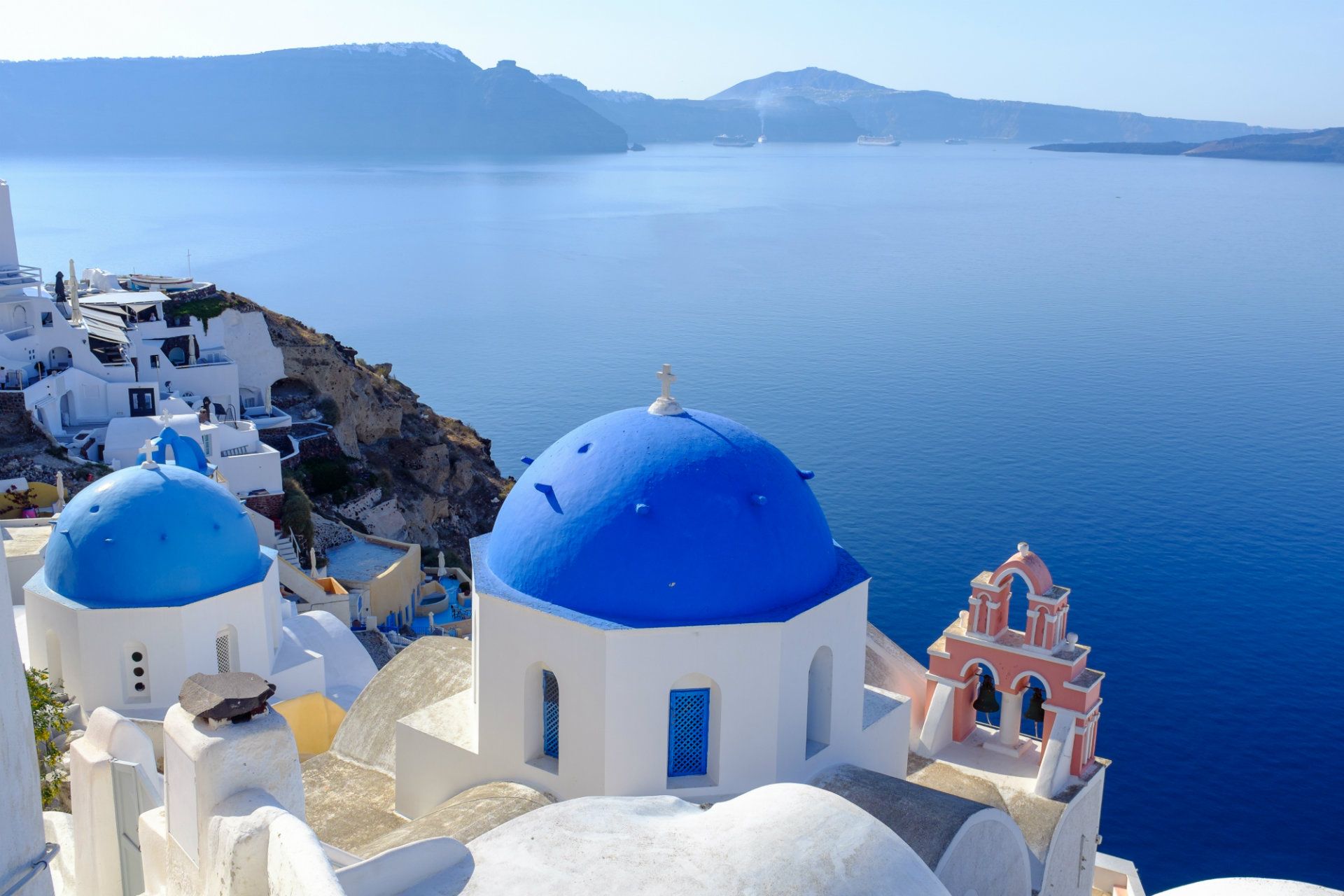
The iconic blue-domed churches of Oia, Santorini © Shutterstock
While you’ll most likely want to amble enchanting Oia in your own time, booking a boat trip to view that legendary sunset comes highly recommended. While building up to the main event, this sunset sailing cruise sails past the Indian Head Mountain and Venetian Lighthouse into the picturesque Caldera. It also offers views of the Ancient City of Akrotiri, with swimming and snorkelling stop-offs at secluded bays along the way. And if you give this a read , you might just discover some of Santorini's secret gems.
As with planning an island-hopping adventure, you’ll want to take time to research which island to make your “stay-put-Paradise” - but all that prep will be more than worth it when you find your Greek El Dorado.

Get your glow on - a (typical) stunning Santorini sunset © Shutterstock
Though we've waxed lyrical about the joys of island-hopping, and about staying put on your preferred island paradise, don’t fall into the trap of associating Greece solely with its islands (as Greece travel tips go, this is up there with the best of them). The mainland has a whole lot to offer too, from the imposing northern mountain ranges, to the all-but-empty golden beaches of the western Peloponnese . Talking of which, the Peloponnese is also perfect for culture vultures who are keen to discover Greece’s archaeological treasures, among them the ancient site of Olympia .
If nature and outdoor adventuring is more your bag, be sure to investigate visiting the Pindus Mountains. Known as the spine of Greece, this 160km long mountain range borders northern Greece and southern Albania. Hiking to the Vikos Gorge is an unforgettable experience - famed for its unique natural beauty and crystal-clear waters, the gorge is listed in the Guinness Book of Records as the deepest gorge in the world.
Travelling between the main towns can be done on the extensive KTEL bus network, with local services radiating out to villages, but if you're interested in historical and cultural highlights and maybe pressed for time, consider a private guide and driver, or hiring a car .
For more information about getting around Greece, check out our guide to exactly that. If you’re wondering how to travel to Greece in the first place, read this .
7. Take-in the capital
Where ancient myth meets modern metropolis - historic Athens is as multi-layered as an archaeological excavation, or a serving of flaky baklava. For history buffs, visiting this bustling city is one of our top tips of Greece, with exploring the Acropolis and Parthenon a literal and metaphoric highpoint of any visit. This guided walking tour is a great way to see the city’s major sights - including the Acropolis - with entry fees included in the price.
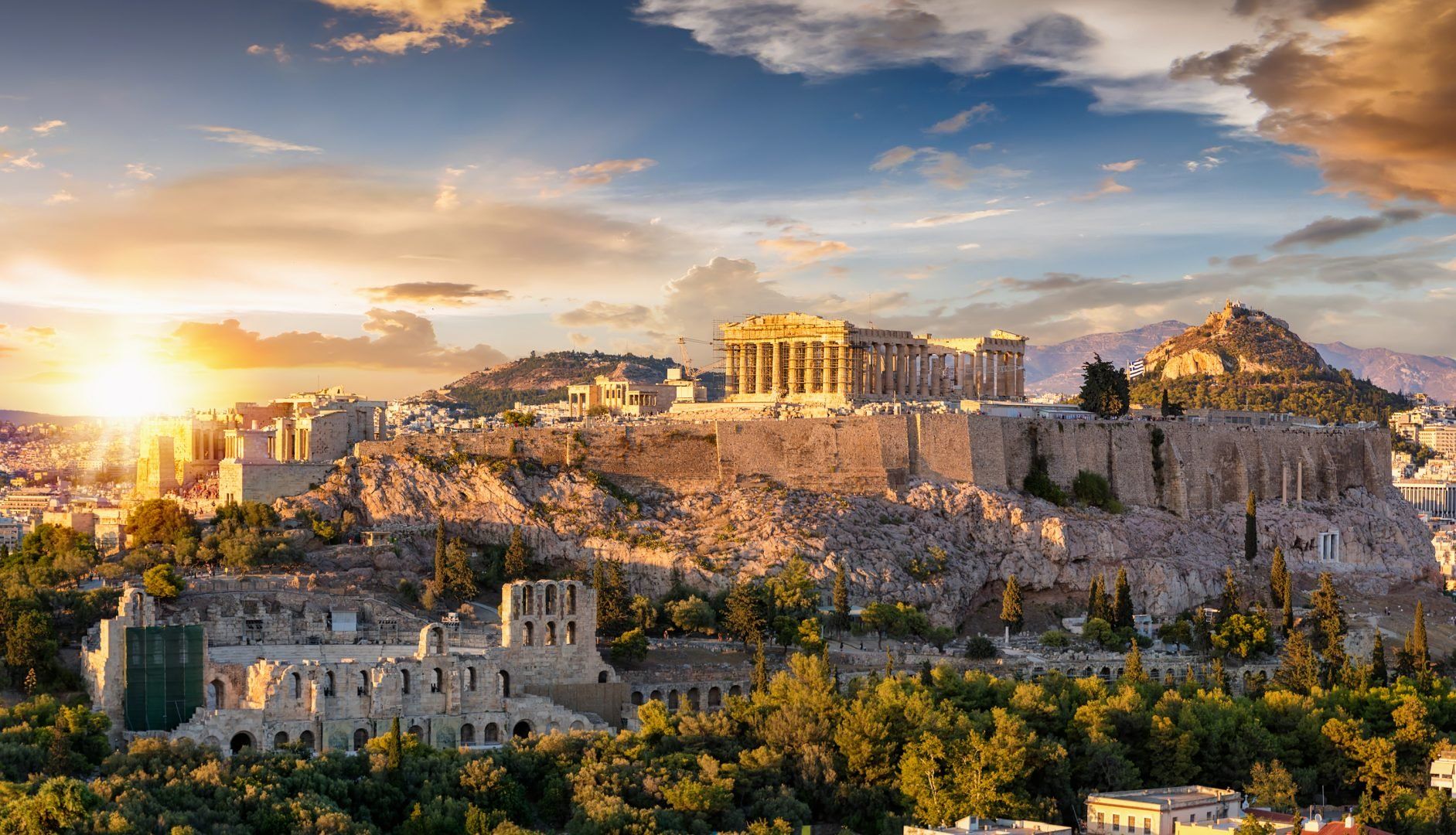
The Acropolis resplendent at sunset © Shutterstock
One of our favourite spots in Athens is picturesque Plaka. Straddling the ancient and modern city, Plaka was the hub of Athens’s population from Byzantine times through to Greek independence. Today its tangle of winding thoroughfares is a delight to explore. Dappled with neoclassical mansions, fragrant with gardenias, and chock-a-block with street musicians, it’s the perfect place for a pre-dinner stroll. You could even blend Plaka’s ambience with Greek culture and great food on this deliciously entertaining dance-and-dine experience .

Picturesque Plaka in Athens © Shutterstock
If you’re looking for a room with a view in Athens, they don’t come better than Electra Metropolis . It's elegantly appointed, conveniently located, with panoramic views over (you’ve guessed it) the Acropolis.
The Rough Guides to Greece and related travel guides
In-depth, easy-to-use travel guides filled with expert advice.
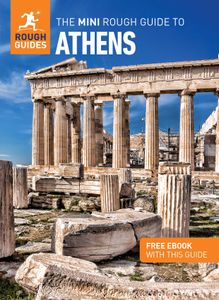
Discover the diversity of Athens with our guide to the best things to do in Athens .

Caryatids at the Acropolis, Athens © Shutterstock
Athens is where you’re most likely to encounter the effects of Greece’s twin crises of recent years (financial and immigrant), with an increase in shuttered buildings and homelessness.
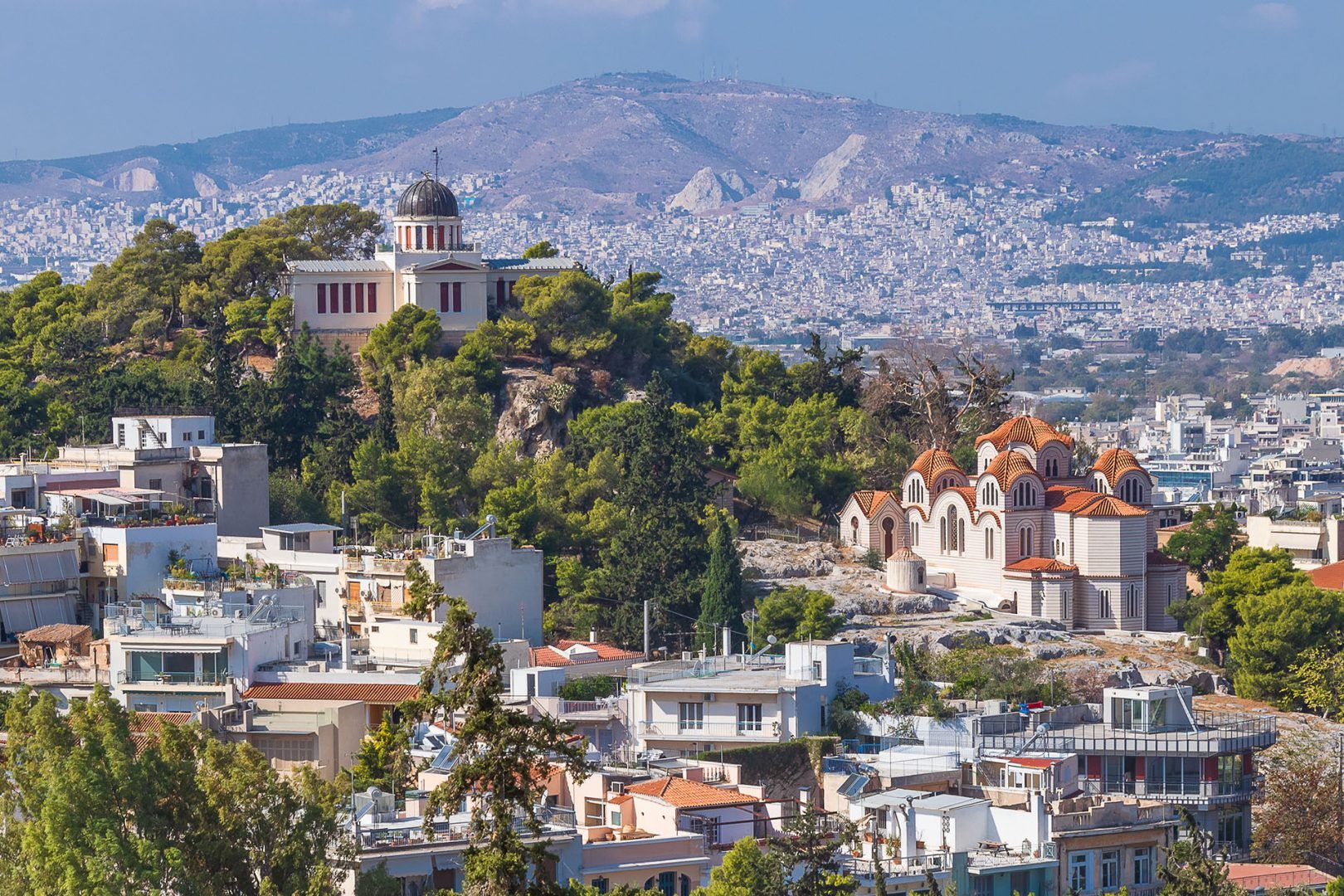
Classical Kerameikos in Athens © Shutterstock
While it’s not generally unsafe, you should watch your valuables, especially when travelling on crowded transport such as the metro. And, as with travel in general, look into taking out insurance before travelling in Greece, or to Greece for that matter. Better safe than sorry.
While Greeks love their grub, eating out in Greece is a delectably casual affair. And, rather than sticking to three square meals a day, they tend to eat more often - good news for travellers wanting to sample the country’s many culinary delights. It goes without saying that when you’re away, it’s better to look out for restaurants that locals dine in - not only will the food be much better, but it’ll be better for your pocket too.
Experiencing Greek food is a great reason alone to travel to this country. Read our guide to the Greek dishes you must try during your trip .

Al fresco dining Greek style at Paros island's Naoussa Old Port © Shutterstock
Another way to embrace that dine-like-a-local ethos is to ask for local barrelled wine, (cheaper than bottled), or to try a fiery spirit like ouzo or tsipouro. And don’t be fobbed off with bottled water - tap is fine.
You could get into Greek grub through taking a tasting tour, like this gourmet food walking tour of Athens , or this Crete wine and food tasting tour . You’ll find similar experiences all over the mainland and islands.

Mouth-watering Greek Moussaka © Shutterstock
From breakfast koulouri (soft bread rings covered in sesame seeds), to mouth-watering moussaka, to perfect pastries (spanakopita is especially sensational - phyllo pastry layered with feta cheese and spinach), there’s plenty to whet your appetite. For more food recommendations, read our guide to must-eat dishes.

Flaky phyllo spanakopita stuffed with feta and spinach © Shutterstock
Leading on from eating and drinking like a local, it’s worth knowing that punctuality isn’t held in the highest esteem in Greece. Greeks tend to hold the healthy Mediterranean belief that most things can be put off until tomorrow, and nothing needs to be done in a hurry - Spanish “mañana” equals Greek “avrio”.
So, don’t expect snappy service in restaurants, or transportation to run like clockwork. In fact, this might just be one of our best tips of Greece - don’t sweat the small stuff (like getting annoyed if your dinner’s a bit late). Instead, save your energy for the good stuff - like discovering (yet another) secluded cove, exploring (yet another) awe-inspiring ancient ruin, or making it to the top of that mountain peak.
Alongside eating like a local, you’ll get a whole lot more from your trip if you seek out the likes of local festivals, feasts and craft and food markets during your stay. Even better if you take part, or get a guide to show you the ropes. With options running from taking a weaving class in Crete’s traditional Arolithos village to learning the art of traditional breadmaking , you won't be short of activities.

Get close to culture at Knossos Palace ruins, Heraklion, Crete © Shutterstock
And of course, don’t pass up the chance to see Greece’s rich ancient history up close. In all likelihood, there’ll be a host of amazing ruins to explore whenever you are.

A fine fresco in Knossos Palace, Crete, Greece © Shutterstock
While most younger Greeks regard themselves as open-minded, the older generation are pretty conservative. Also, the Orthodox Church still holds great sway. Nudity is frowned upon away from designated beaches, and it’s not advisable to visit churches or monasteries in skimpy shorts or tops.

Church of Agios Ioannis (as seen in Mamma Mia), Skopelos © Shutterstock
It might be useful to be aware of two gestures that could cause offence, or misunderstanding. First, hand gestures. Don’t hold your hand up, palm out, to anybody, and don’t make an OK sign by forming a circle with your thumb and forefinger - both are extremely rude. Secondly, nodding and shaking your head for "yes" and "no" are also likely to be misinterpreted. Greeks use a slight forward inclination of the head for yes, and a more vigorous backward nod for no.
For our full guide to Greek etiquette, take a look at this.
Greeks are mostly extroverts and love exchanging views and opinions with anyone and everyone. So don’t hold back on asking people about their beliefs and opinions, or expressing your own.
If travelling with children, you’ll soon see how much they're adored - and indulged. Children often act as natural icebreakers too, especially at restaurants, where nobody minds them running around and making a bit (or even a lot) of noise.

Definitely not shy - the flamboyant changing of the guards in Athens © Shutterstock
While resort packages - especially all-inclusive ones - can be very cheap, not much of the money you spend stays in Greece. So, you might want to give a little back and stay in independent accommodation - a local guest house, or locally owned villa. Not only are there great deals to be had, but you’re also more likely to have a more authentic experience. As an example, Home Sweet Hotel in Plaka is a lovely option if you're in Athens.
If you are set on staying in a resort, why not head beyond the confines of your holiday retreat to eat? Firstly, eating the same buffet every day can get a little boring. And secondly, as we mentioned above, there are plenty of local eateries serving excellent food at excellent prices.
There’s a lot of truth in the maxim that if you ask five Greeks how to get somewhere you’ll get five different answers. So, take what you’re told with a pinch of salt. Ask, listen, get a second option - but don’t be surprised when that second opinion advises driving in the opposite direction. Above all, don’t worry - getting a little lost is part of the fun.
Greeks tend to have a similarly divergent, flexible attitude to rules and regulations - like having to wear seatbelts or crash helmets, and not smoking in public places. These are all regularly ignored, but it’s up to you whether you follow suit. Take your cue (or not) from others around you.

Famous shipwreck bay, Zakynthos island, Greece © Michail Makarov/Shutterstock
At Rough Guides we’ve always taken pride in telling it like it is - whether we’re updating details in our guide books, or researching emerging destinations. With that in mind, we want you to know that when you click on links that lead to our affiliate partners’ sites, we can earn a small commission (at no cost to you). This is one of the ways we’re able to keep doing what we do best - provide you with travel advice and inspiration you can trust. Speaking of which, you can trust what we link to - our travel writer experts are exactly that (experts) and have highlighted them to share ideas that might make your trips all the more satisfying.
Header image: idyllic Agios Stefanos on the Greek island of Corfu © Shutterstock
Joanne is a Pembrokeshire-born writer with a passion for the nature, cultures and histories of the Caribbean region, especially Dominica. Also passionate about inspiring a love of adventure in young people, she’s the author of several books for children and young adults, hosts international writing workshops, and has written articles on the Caribbean and inspirational community initiatives for Rough Guides. Follow her @JoanneOwen on Twitter and @joanneowenwrites on Instagram.
- Authentic Experiences
- Coasts & Islands
- History Culture Heritage
- Off the Beaten Track
- Inspiration
- Travel Tips
Planning your own trip? Prepare for your trip
Use Rough Guides' trusted partners for great rates
Travel advice for Greece
From travel safety to visa requirements, discover the best tips for traveling to Greece
- Culture and Etiquette in Greece
- Eating and drinking in Greece
- Getting around Greece: Transportation Tips
- How to get to Greece
- Travel Tips Greece for planning and on the go
- Best time to visit Greece
- Crete Itinerary - how to spend 5, 7, 10 or 14 days in Crete
- How to get from Athens to Crete
Find even more inspiration for 2 here
Ready to travel and discover greece, get support from our local experts for stress-free planning & worry-free travels.
- Where to stay
- Itineraries
- Travel advice
11 things I wish I knew before visiting Greece

As the travel industry reopens following COVID-19 shutdowns, TPG suggests that you talk to your doctor, follow health officials' guidance and research local travel restrictions before booking that next trip. We will be here to help you prepare, whether it is next month or next year.
When it comes to deciding where to go next, Greece is a usually a slam dunk. Whether it's a beachy island getaway you're after or an Athens (or perhaps Thessaloniki) city break that blends sightseeing by day with ouzo gulping by night, the mythic Mediterranean country ticks all the right boxes for classic holidays but wait -- there's more. Lots more.
Landing in Athens is the easy bit, but once you're on terra firma you'll find yourself immersed in both an epic history and some rather iconic landscapes, too. How you navigate this richness is largely up to you, but the more you know before you go, the more capably you can decode all those big fat Greek travel mysteries. Keep the following things in mind to help you steer clear of the cliches and make the most out of your experiences in Greece.
1. Don't just make the Acropolis in Athens your priority
Making the Acropolis the focus of a jaunt to Athens is like making a trip to Paris about visiting the Eiffel Tower -- so don't do it. Instead, do like the Athenians do and drink in views of the sacred rock from any number of rooftop bars and restaurants in the vicinity, or better yet wake up to a view of it from your hotel room . And the best views of Athens as a whole are actually from the top of Mount Lycavittos anyway (take the funicular in the Kolonaki neighborhood to the top).
Dodge the tourist crowds marching up to the Parthenon and instead inspect the arguably more evocative ruins at the foot of the Acropolis in the ancient agora area. I'd also suggest skipping the Acropolis Museum and diverting your cultural hours to the National Archaeological Museum across town. It's a bit fusty but still the best museum in Greece. Essential smaller museums include the Benaki Museum and Museum of Cycladic Art, both of which blend ancient artifacts with excellent contemporary exhibitions. If you fancy a Picasso or Van Gogh fix, the brand-new Goulandris museum is a must.

2. Don't just feast on gyro
I've seen this over and over (and over) again: tourists who enjoy a hearty international-style buffet breakfast at their hotel and then opt for a gyro or souvlaki platter for lunch and then again for dinner. Don't get me wrong, authentic Greek gyros are pretty scrumptious and at about three euros each are fiscally attractive dining options too. But Greek gastronomy is more diverse than that and experiencing at least some of it can be a highlight of your trip.
To savor a Greek breakfast staple you'll almost never find at a hotel buffet, try strapatsada, a delectable dish made with eggs (usually scrambled), feta cheese, fresh tomato sauce and a dash of olive oil. One of the best is served at the restaurant of the Acropolis Museum (you don't have to pay for museum admission to eat at the restaurant). For the best seafood, shun the touristy tavernas around the Plaka and head instead to Piraeus, where the seafood is generally cheaper, fresher and comes with sea views, too. Vegan restaurants are also taking off, particularly in Athens.

3. Find your nearest laiki
The spirit of ancient Greece lives on in the weekly laiki, or outdoor fruit and vegetable market that takes place rain or shine throughout the year on Fridays. A visit to a laiki is a great way to get an eyeful and taste of nature's bounty for which Greece is justly famous for. Every neighborhood in Athens has its own laiki and some are bigger and better than others. One of the best is in Pagrati, on Archimidous Street right behind the Panathenaic Stadium (the world's only stadium built entirely of marble). Besides organic produce you'll find plenty of traditional comestibles like extra-virgin olive oil, halva and honey for sale.
4. Greece isn't just for the summer months
One of the greatest Greek myths is that the many islands are strictly for summertime escapes, but that's far from the case. True, many islands rock their Greek summer vibes best in the peak months of July and August (the months that also pull the most crowds), but swimming season heats up as early as May and in many places doesn't wind down until November. Little islands near Athens like Hydra and Spetses are worth visiting even in winter and big islands like Crete have plenty of cultural attractions and historic sites to keep you busy throughout the year.

5. Don't take a three-island day cruise
When you are in the Piraeus port you'll see many advertisements for three-island cruises that promise you a mini-odyssey to a trio of islands close to Athens. Generally these are Aegina, Hydra and Poros. Focus on one island instead. Packing three islands into a single day trip is something that Greeks themselves would never do, it diminishes both the quantity and quality of your time. If you are really into ancient ruins, spend time on Aegina. For dramatic scenery, Hydra's the spot. Among all the islands within an easy ferry journey from Athens/Piraeus, Poros easily qualifies as the quiet charmer where you could linger for hours over Greek coffees and delightful harbor views.
6. Greek islands aren't just for hitting the beach
Greece has some 6,000 islands, of which about 227 are inhabited. That represents a lot of geographical diversity. Some islands have gorgeous beaches -- think Mykonos, Kefalonia and Corfu -- while others have a mix of decent beaches and landscapes that offer up the possibility of more varied activities. Kalymnos is the place for rock climbing and bouldering, Paros is ideal for windsurfing and kite surfing, Sifnos and Tinos (and to a certain extent Santorini) are much favored by foodies and so forth. The shoulder season, April to June and also October, is often ideal for these beyond-the-beach pursuits.
7. Skipping Santorini is not a sin
Two essential Santorini travel facts: the first is that yes, it's a geologically unique island and the second is that yes, you should probably also skip it. How dare I? Well, due to far too many cruise ships disgorging way too many people onto such a small place, the wisp of an island has degenerated into a sort of hyper-sanitized Selfie Island and really, how much fun is that? The views over the volcanic caldera are cool as are the Minoan ruins at Akrotiri but the beaches aren't great and the good hotels and restaurants tend to be overpriced.
So check it out if you must but make sure you avoid the months of June, July, August and now all of September too. Other Aegean islands beckon with their own brand of gorgeousness, whether that be breezy Andros, volcanic Milos and myriad others.
Read more: Which European countries don't use the euro currency and why?

8. You should visit Greece during Easter
Greeks celebrate Easter with a fervor most Europeans reserve for Christmas -- and the enthusiasm has a distinctly noncommercial flavor at that. The Greek Orthodox Church still holds sway over many aspects of contemporary Greek life and Easter week is when some of the more celebratory aspects really kick in, with all manner of feasts and public processions that begin on Palm Sunday and vary from location to location but that are particularly colorful on islands like Corfu.
9. Think of Crete as a separate country
Because in many respects it is. Starting with size: Crete is 160 miles from one end to the other and is the fifth largest island in the Mediterranean Sea. That means it's difficult to see it all in a single take, nor should you try. The landscapes are stunningly varied and unlike the more stereotypical Greek island getaways the Cretan economy is not wholly dependent on tourism: historic cities like Heraklion and Chania also have a youthful vibrancy that's hard to resist.
There are numerous nonstop flights from Crete's two major airports in Heraklion and Chania in the peak summer season and year-round connections from Athens. From Athens/Piraeus there are also daily ferry departures, they typically leave around 9 p.m. and arrive in Crete at 6 a.m. While these ferries resemble small cruise ships with plenty of seating options (including cabins), a flight on Aegean will you get from Athens to Crete in just about an hour.

10. Remember the mainland
Greece is more than Athens and the islands. The region of which Athens is a part, Attica, is home to some of the most important sites in antiquity from Marathon to Cape Sounio and the Temple of Poseidon. South and east of the Greek capital, the Peloponnese offers a dramatically chiseled coastline and plenty of historical gems too, like the city of Nafplion -- the first capital of Greece -- and the remarkable fortress isle of Monemvasia. The northern city of Thessaloniki, named after Alexander the Great's half-sister, is worth a detour for its history, museums and excellent restaurants.

11. You needn't spend a fortune to have a blast in Mykonos
Stick around Greece for any length of time and you're bound to hear Greeks bemoan how Mykonos has become an enclave affordable only for the likes of Arab princes and their consorts (who may or may not include Lindsay Lohan). While there is some truth to that, don't let it put you off a visit because the cosmopolitan Mykonos vibe is something you won't find anywhere else. The small Cycladic island has some of the best beaches, restaurants, hotels and nightclubs in the Mediterranean. July and August are the months to avoid, but if you can manage to hit Mykonos in June or September, you'll probably have a great time and without necessarily breaking the bank.

Bottom line
Greece is a country with attractions that are so iconic everybody thinks they already know the place and to varying degrees maybe they do, but not unlike Madonna, there is a lot more to her than meets the eye. It's when you avoid insisting on the cliches -- you probably don't need a whole day to snap selfies at the Acropolis or an overpriced seafood lunch in the touristy center of Mykonos town -- that the colors of Greece really begin to reveal themselves. And if you can avoid those peak crowded months of July (especially the second half) and August you'll very likely have a better holiday experience in Greece overall.
- Search Please fill out this field.
- Manage Your Subscription
- Give a Gift Subscription
- Newsletters
- Sweepstakes
- Destinations
3 Incredible Itineraries for Travelers Heading to Greece This Year
Three Greece travel experts weigh in on how to craft the perfect trip — top hotels, informative tours, and Cycladic islands included.
Paul Brady is the news director at Travel + Leisure and the brand's expert on cruise travel. He has been covering the travel industry for more than 15 years for outlets including Condé Nast Traveler , Skift , and The Huffington Post .
:max_bytes(150000):strip_icc():format(webp)/Paul-Brady-3744fd514a6045708c9dfc18375122af.jpg)
Monica Farber/Travel + Leisure
In the past few years, tourism to Greece has boomed. With the summer high season only a few months away, now’s the time to lock in your own plans, whether they call for a tour of the classics or something a little more adventurous. Here, a collection of trips from the three Greece experts on Travel + Leisure ’s A-List .
A Classic Crowd Pleaser, Arranged by Petros G. Zissimos of Hellenic Holidays
Ian Dagnall/Alamy
This quintessential itinerary includes visits to some of Greece’s most iconic destinations, Zissimos says, adding that “it’s our most popular trip for 2023 so far.” Touch down in Athens, where you can hit highlights such as the Acropolis and Areopagus with a guide, then explore neighborhoods like Kolonaki and Plaka on your own. Zissimos recommends staying two nights at the well-situated Electra Metropolis before heading off to the Cycladic island of Mílos, accessible either by air (45 minutes) or by ferry (from three hours).
Seux Paule/Hemis/Alamy
“Mílos has dozens of beaches to visit, with different combinations of sand, stone, and shells,” says Zissimos, who’s especially partial to Sarakiniko. He also recommends a sailing excursion to Kleftiko, where volcanic rock formations make for spectacular photos, and an evening in the town of Adamantas, where tavernas line the waterfront. The seaside Melian Boutique Hotel & Spa , on the northeastern tip of the island, is a go-to for Zissimos.
Matteo Colombo/Getty Images
You’ll need a morning for the four-hour ferry ride to Naxos, an island offering a solid combo of archaeological sites and contemporary adventures. “There’s a beach for everything here,” Zissimos notes. “Agios Georgios is known for windsurfing, while Mikri Vigla is the place for kitesurfing.” In between, Zissimos can arrange guided visits to the Temple of Demeter and the Portara, the 2,500-year-old marble gate that stands at the entrance to Naxos Harbor. His preferred place to stay is Villa Marandi Suites , with its whitewashed ocean-view rooms.
Courtesy of Auberge Resorts Collection
After breakfast, catch a high-speed ferry (90 minutes) to Santorini, then check in to the cliff-top Grace Hotel, Auberge Resorts Collection . Spend the next day on a sailing excursion, complete with snorkeling stops. Zissimos can also set up wine tastings and recommend hikes, like the coastal path from Fira to nearby Imerovigli, with its jaw-dropping views of the caldera. Zissimos suggests leaving time for dinner in the ever-in-demand village of Oia, known for its sunsets. From there, ferry or fly back to Athens for the trip home.
Something Less Expected, Planned by Christos Stergiou of TrueTrips
P Tomlins/Alamy
The capital is a must-see, Stergiou says, “because its classical history has so distinctly influenced modern thought.” He suggests a guided tour that takes in both the ancient and the contemporary, with visits to the Acropolis Museum and the Temple of Olympian Zeus as well as landmarks around central Syntagma Square, including the Greek Parliament. Conveniently, his hotel pick, Hotel Grande Bretagne, a Luxury Collection Hotel , is located on the same square. “It’s the grande dame of Athenian hotels,” Stergiou says.
Izzet Keribar/Getty Images
From Athens, head for Patmos, “an island that exudes a unique aura thanks to its seemingly untouched natural beauty,” Stergiou says, adding that it’s a Christian pilgrimage site, as it is believed to be the place where the Book of Revelation was written. His favorites include the village of Chora, a UNESCO World Heritage site and “one of the best-preserved medieval settlements in the Aegean.” Stergiou can also arrange for private boat excursions for sightseeing, swimming off uncrowded beaches, and dining in a hyperlocal family-run restaurant. His go-to hotel is close to his heart: the Petra has been in the Stergiou family since 1989. The 11-suite inn is now part of Small Luxury Hotels of the World.
Courtesy of Cosme, A Luxury Collection Resort
After a late checkout, hop aboard the overnight ferry from Patmos back to Athens — in a private cabin, of course. In the morning, it’s an easy one-hour flight to Páros, a place Stergiou calls “up-and-coming, or maybe already there.” Make your way, with a guide, to the island’s north and the Environmental and Cultural Park of Páros. The area “is filled with fascinating attractions, including the old shipyard and the Monastery of Agios Ioannis Detis, built right above the sea.” Check in at Cosme, a Luxury Collection Resort , where Stergiou likes the Aether suites, with their sea views. Spend the rest of your time either lounging on Páros’s sandy beaches or making day trips to nearby islands like Antiparos, before taking the ferry (from 90 minutes) over to Santorini.
Ståle Eriksen/Courtesy of Canaves Oia Epitome
“It’s not exactly under the radar,” Stergiou notes of Santorini, “but with the right guides, you can still tap in to the more traditional side of the island.” He recommends spending one day exploring Assyrtiko vineyards, such as Domaine Sigalas; he also suggests a guided walk through Oia, the picturesque if popular village that still conceals a few lesser-known corners. As for where to stay, the Canaves Oia Epitome strikes the right balance between proximity to the island’s best restaurants and seclusion — particularly when you’re booked in a one-bedroom pool villa. Stergiou suggests one last night back at the Grande Bretagne before your flight home.
Off the Tourist Trail, Recommended by Mina Agnos of Travelive
Joanna Kalafatis/Alamy
Start in Athens, Agnos says, “but unless you’ve never been to the Acropolis, I’d suggest instead a tour of the stunning archaeological site of Cape Sounion, south of the city, where there are spectacular sunsets.” Spend another day on a guided tour of the city’s cafés and ouzeri, low-key bars that serve the anise-flavored spirit along with platters of meze. Agnos loves the centrally located and newly opened hotel Xenodocheio Milos , from the group behind the Estiatorio Milos restaurants.
Spiros Papadakis/iStockphoto/Getty Images
Your next stop is Sérifos, “a Cycladic island that has some of the most stunning beaches in Greece, including sandy Psili Ammos, which is often on lists of Europe’s best,” Agnos says. More rugged and lesser-known than nearby spots such as Mílos, it’s nevertheless easily accessible by ferry (from two hours). Agnos suggests taking time to explore the island’s mythological sites, such as the ancient construction known as the Throne of the Cyclops, before spending time swimming or hiking. She recommends the Hotel Rizes overlooking the port.
Emi Cristea/iStockphoto/Getty Images
From there, it’s onward by ferry (from 6 1⁄2 hours) to Naxos, the beachy island that’s also a favorite of Zissimos. For her part, Agnos recommends the island’s many hikes (like a half-day round-trip from the village of Chalki) and can also arrange for cooking or pottery classes. Stay at the hilltop 18 Grapes , with its two pools and views of the sea, or Naxian on the Beach , which has 10 seafront suites.
Athina Psoma/Alamy
From Naxos, it’s an easier ferry (from 90 minutes) west to Sífnos, a less-visited Cycladic island with a growing reputation for food. “It’s famous in Greece for having some of the country’s best culinary experiences,” Agnos explains, as it’s the birthplace of distinctive dishes such as revithada, a chickpea stew, and mastelo, red-wine-braised lamb. The island also has its share of hikes, from easy three-mile loops to challenging nine-milers. Agnos recommends a stay at the Elies Resorts , on Vathi Beach.
A version of this story first appeared in the February 2023 issue of Travel + Leisure under the headline "The Best of Greece, Three Ways."
Related Articles

15 Essential Greece Travel Tips: Things to Know For Your First Visit
From golden sandy beaches and dazzling blue skies to mouth-watering food, Greece offers a plethora of charms and irresistible attractions all year long.
What’s more, the country is filled with warm-hearted and hospitable people who will help you enjoy a fabulous escape from your overworked and hectic life.
That said, we wanted to share some essential Greece travel tips with you to help ensure that your trip goes smoothly. We also don’t want you to miss out on any of the classic Greek experiences!
15 Essential Greece Travel Tips
Table of Contents
1. Don’t forget to buy Travel Insurance
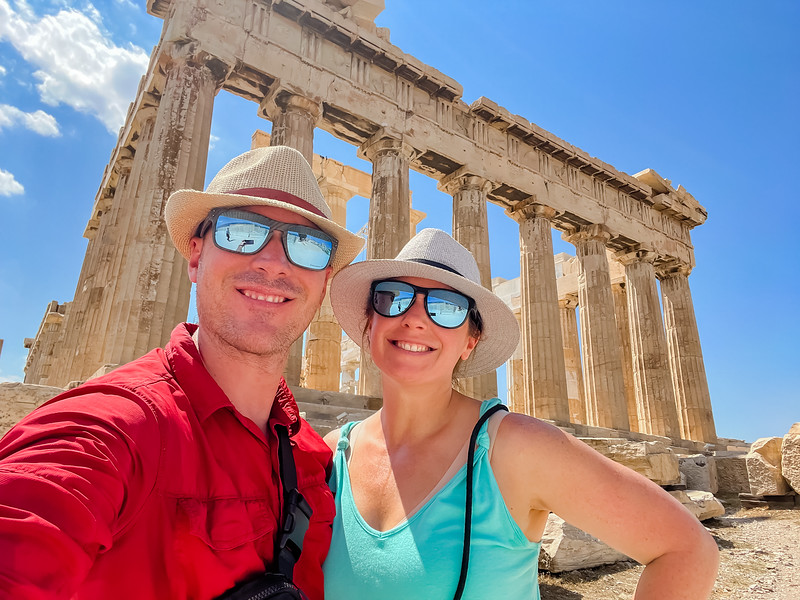
With all that’s been going on in the world, we can’t stress enough how important it is to protect your trip and the money you spent on it. We do not travel without travel insurance.
There are a lot of options out there for insurance, but we use and stand by Allianz Travel Insurance . Full disclosure, we receive financial compensation as ambassadors for their company.
That said, we’ve been purchasing plans through them for the past 7 years and they have never let us down. Canceled flights, delayed flights, lost luggage, and a global pandemic, they’ve been there for us.
We always renew their AllTrips Premier annual plan that covers all of our trips over a 12-month period. If you take more than 2 trips a year, it’s worth considering an annual plan.
For single trips, we recommend looking at their OneTrip Prime or OneTrip Premier plans.
2. Be prepared for the heat during Greece’s summer
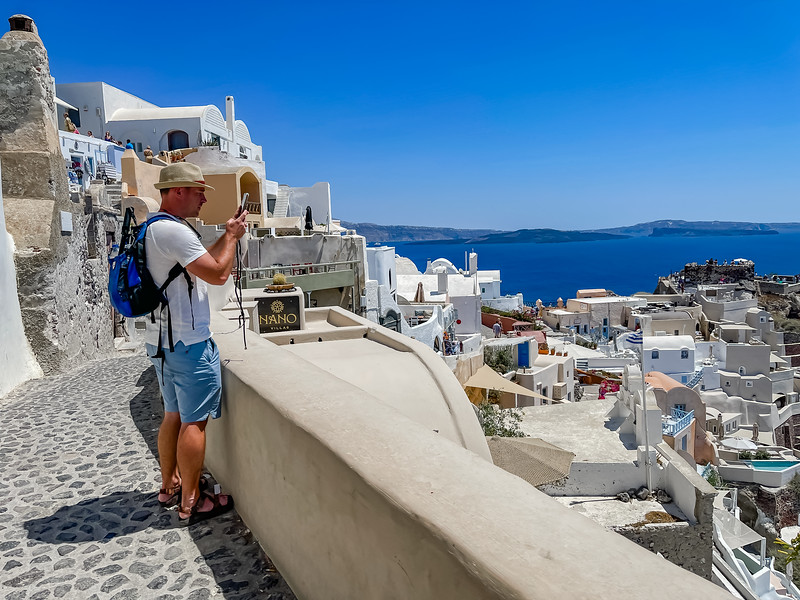
Greece’s summer sun isn’t forgiving for tourists who don’t protect themselves against its scorching heat. Heatstroke and sunburns are common for tourists visiting Greece in the summer. As is dehydration, which commonly presents as a stomach bug.
In Greece, summer temperatures can go beyond 95 F (35 C). On some days, it even rises above 104 F (40 C).
To protect yourself, always wear a wide-brim sun hat, and a pair of sunglasses. Bring a refillable water bottle, and drink frequently to help keep yourself hydrated on your sightseeing and beach trips in Greece.
Sunblock is a must too, especially if you’re hitting the beaches and outdoor archaeological attractions in Greece. And, even if you’re wearing sunblock, try to avoid direct sunlight as often as possible.
Wearing light-colored clothes is one of the most important Greece travel tips. Black is cool, but it’s not ideal in a place as sunny and warm as Greece in summer. Also, opt for skirts, or loose long wide pants, and wide, airy, and long sleeves.
If you’re visiting ancient sites in Greece, do it as early as possible, to avoid walking under the heat of the sun. Afterward, you can stop by a couple of museums, and take advantage of their air-conditioning as the temperature gets hotter during midday.
3. Consider visiting Greece in September or June

June and September are truly the best months to visit Greece. With lower rates for accommodations and flights, these months are perfect for those who want to save some cash on their Greece vacation.
Last-minute ferry tickets to the Greek islands are easier during these months, too. Don’t get me wrong, June and September are still part of the country’s peak season, but most Greece attractions and places have fewer crowds during these months. The weather is also less windy and cooler.
4. Buy your ferry, airplane, and train passes in advance
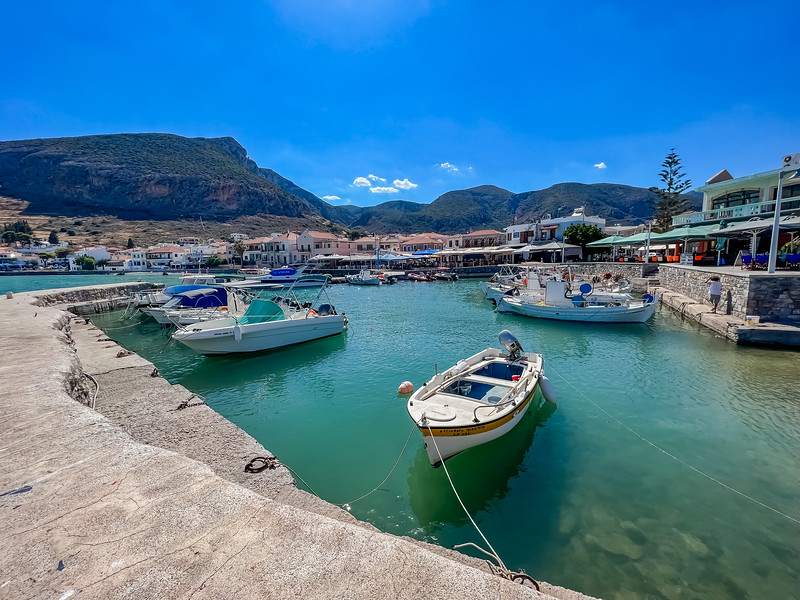
Greece is an extremely popular destination, especially in the summer months. And, that means you should expect tickets for ferries to be sold out weeks in advance, especially if you’re visiting Greece in June, July, August, and September.
Try to plan as far in advance as you can and book all the needed tickets in advance. A lot of Europe travels during the summer holiday season, so it’s not just overseas tourists you’ll be up against when it comes to accommodation, ferries, tours, etc.
5. Spend more than a week in Greece
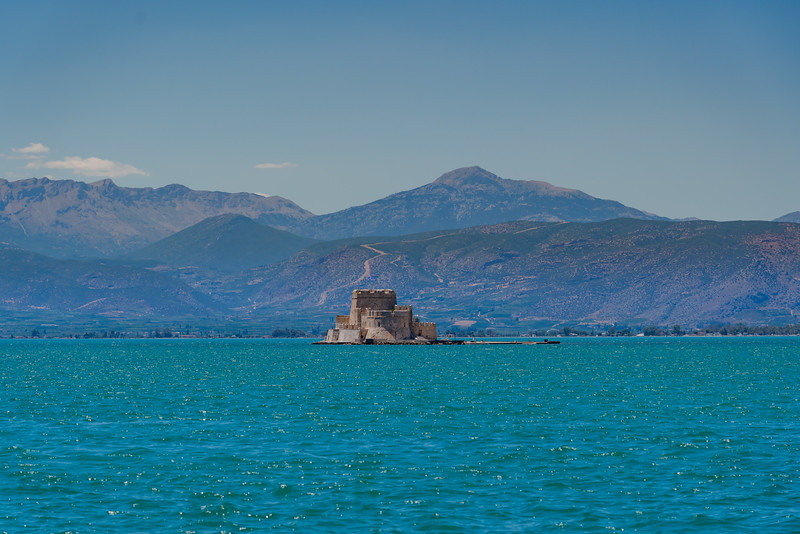
Despite the country’s small size, it is packed with attractions and places to visit. I honestly think this is one of the most overlooked aspects of Greece travel.
People don’t do enough research and only realize once they are in the country that they don’t have the time they need for everything that interests them. Don’t make this mistake!
Also, don’t try to do too much in a short period of time. If you have less than a week to explore the country, focus on 3 destinations instead of trying to fit in 6 or 7 areas. Travel between the islands takes time and is often met with delays or even cancellations due to the wind.
For a first-time visit to Greece, we’d recommend 2 weeks if you can. This will give you time to visit Athens, a couple of sights on the mainland, and spend a week in the Greek Isles.
6. Learn a little Greek lingo

Learning some Greek phrases will do wonders for your Greece vacation. To me, it’s one of the most important Greece travel tips we can offer.
Not only will it make your vacation more immersive, but Greeks also love it when you can speak a few of their phrases or words.
Since English is prevalent in Greece, learning their lingo isn’t exactly necessary. But, they will have a deeper level of respect for those who show effort in speaking their language.
7. Check out the less explored beaches in Greece
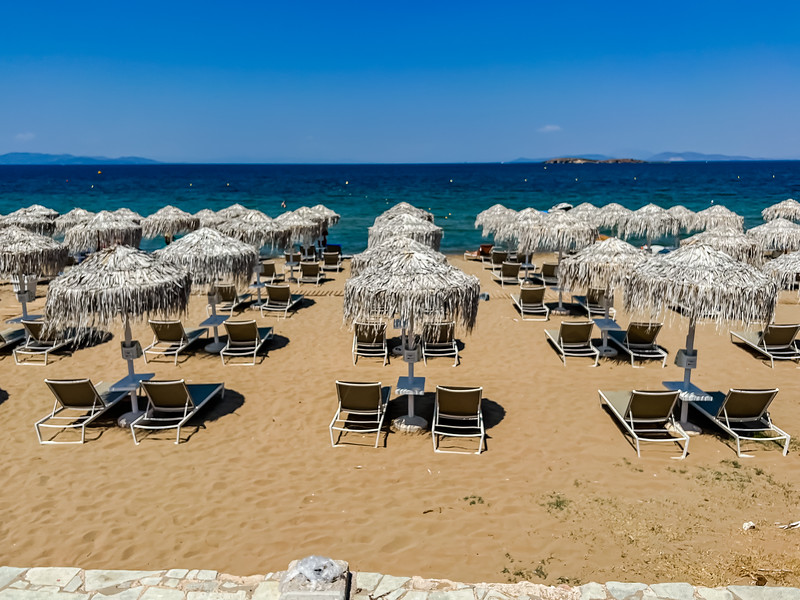
The beaches on Greece’s most popular islands, like Santorini and Mykonos, can be extremely crowded. No matter when you visit.
If you want to steer clear of the crowds, head to the more serene islands, like Astypalaia, Ithaca, Donoussa, Sikinos, Kimolos, Tinos, and Andros.
Furthermore, you can enjoy a road trip along Greece’s coast in South Crete, Evia, Chalkidiki, Pelion, Epirus, and Peloponnese.
8. Consider visiting during an annual festival or event
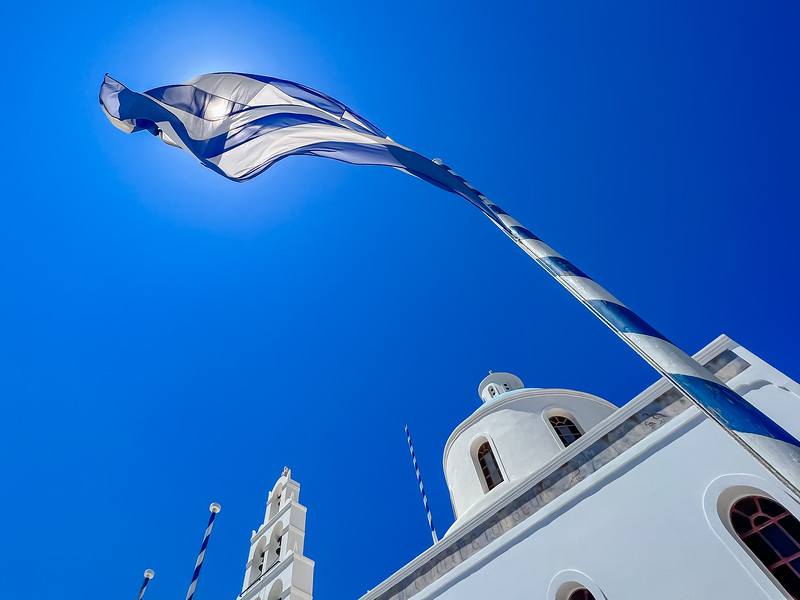
Some of the best and most exciting festivals in Greece take place in summer. The Athens Epidaurus Festival, for one, is one of Europe’s oldest performing arts festivals.
Inaugurated in 1955, this festival features numerous shows of music, dance, and theater. Even better, this festival gives you the chance to enjoy the ancient Greek Epidaurus amphitheater, which is known for its acoustics and is fully operational.
The amphitheater’s acoustics are so phenomenal that performers won’t need a microphone to be heard in the remotest tier.
You can also experience Panyigiria (Greek folk festivals). These folk festivals are scattered throughout the country in summer and are fun social gatherings.
9. Bring a refillable water bottle
Luckily, tap water in Greece is, in general, safe to drink. So, bring a refillable and reusable water bottle to reduce plastic use and save money during your trip.
This practice goes a long way toward being a mindful traveler and engaging in the principles of Leave No Trace while you travel.
10. Greece safety tips to be mindful about
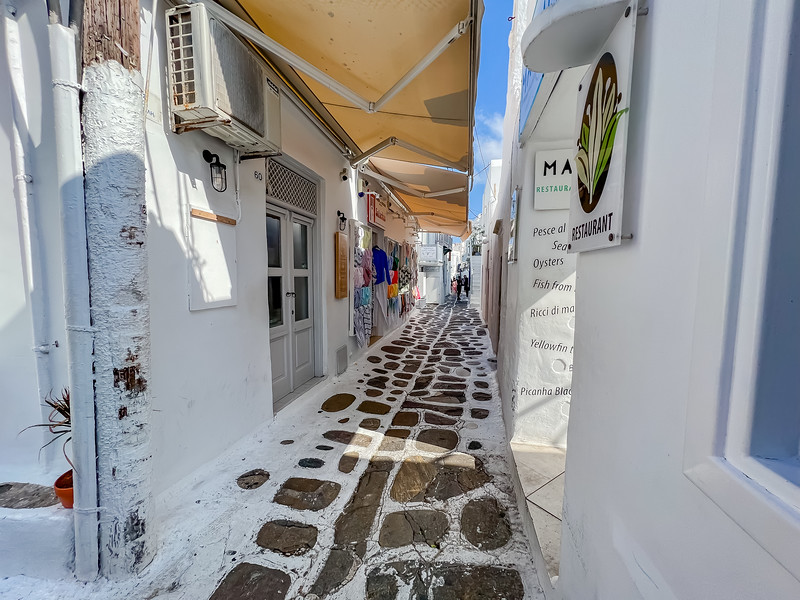
Greece is generally a safe destination, even for female solo travelers. Violent attacks in Greece are a rarity. Still, there are a few important safety tips you should take note of.
Pickpocketing is prevalent, specifically in Athens. Though Greek police have cracked down on some of these perpetrators, you should be aware of your surroundings, and hide your valuables when you’re in busy streets, markets, or using public transportation.
11. Give Athens at least 3 days
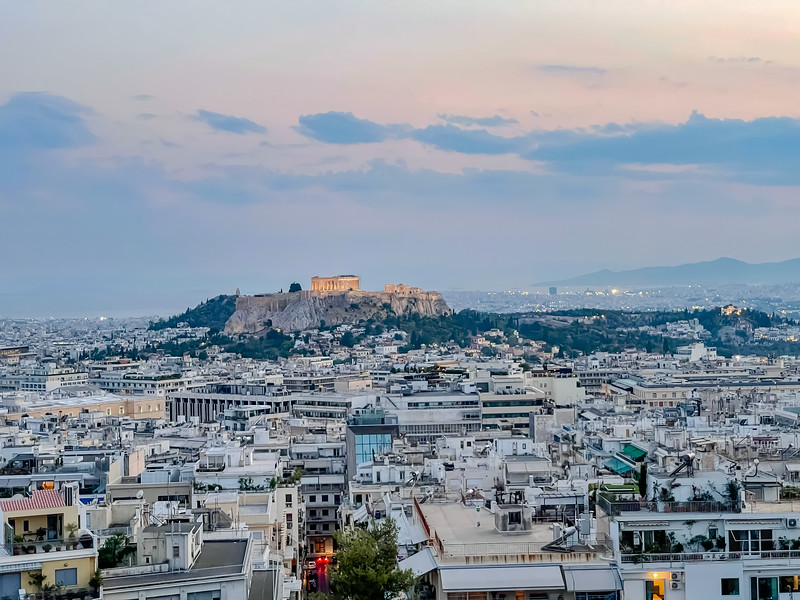
There’s no better place to start a Greece vacation than Athens. Not only is it the main international gateway to Greece, but it also has a host of fantastic, world-class attractions.
You could spend an entire week in this city, hitting known attractions, such as the Ancient Agora and the Parthenon.
Athens is also home to tons of first-rate museums. And, luckily, most of these attractions are air-conditioned, giving summer visitors a respite amid the scorching summer heat.
If it feels too hot outside, step inside the National Historical Museum and the National Archaeological Museum of Greece. You may also stop at Monastiraki’s covered markets, and pick up some Greek souvenirs.
Spending 3 days gives the perfect balance to see the main sites, hit up a few museums, and slow down just enough to enjoy the cafe life.
12. Don’t miss the Greek Islands
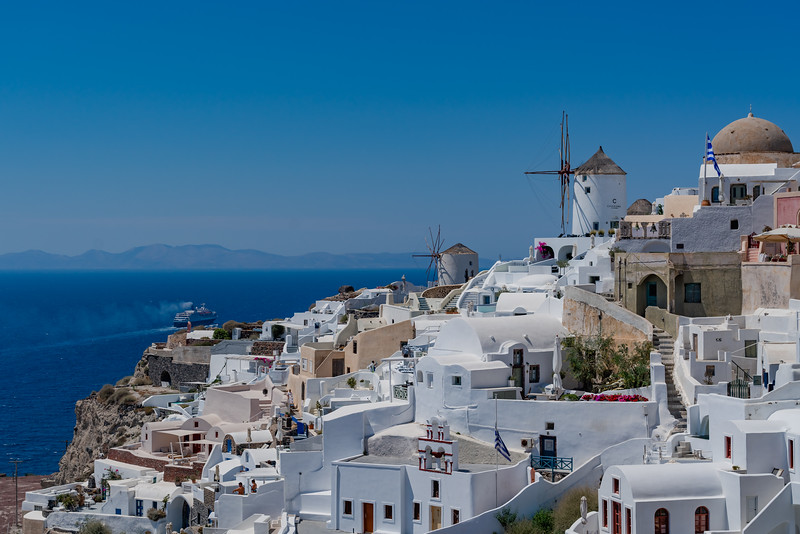
Greece is home to around 1,200 to 6,000 islands. And, these islands are divided into six island groups: the North Aegean, Saronic, the Cyclades, Ionian, Sporades, and the Dodecanese.
No matter what your travel style or interests are, you’ll find a Greek island that suits you. Some islands offer tranquility, peace, and solitude, while others have raucous nightlife and a party ambiance.
While Santorini and Mykonos are the typical poster children for the Greek Islands, and their beautiful, we also love Samos and Patmos for a quieter experience.
13. Eat Greek Salad

One of the most delicious things you can eat while in Greece is a Greek Salad. I am not exaggerating when I say that every time we set foot in Greece, we eat weight in these salads!
Made from plump ripe vine tomatoes, red onions, cucumbers, and green peppers, this salad is topped with a generous brick of Greek feta cheese. It is then sprinkled with a seasoning that contains a variety of herbs, salt, and pepper. It is then dressed with olive oil and vinegar.
It is not only refreshing but insanely delicious!
14. Try a Cappucino Freddo

Or as we like to call it, Greek rocket fuel. Coffee is a rite of passage, and with the heat of the summer months, it’s best to drink it ice cold. Enter the Freddo.
You can have it straight up or with milk – we prefer it with milk. They also offer it sweet or unsweet. But be warned, the sweet option is very sweet.
This national drink can be found pretty much anywhere and we suggest you try it in one of the charming street cafes you’ll find in Athens or on any of the Greek Islands.
15. Bring good shoes
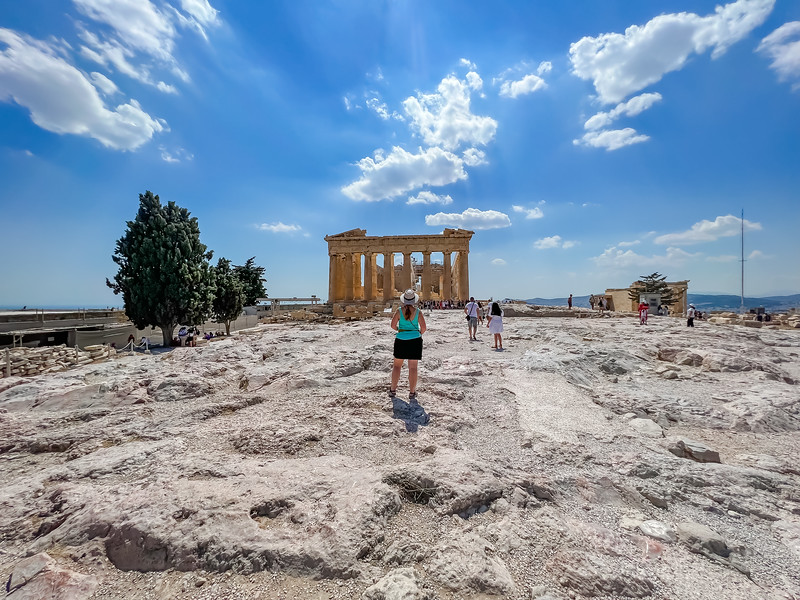
Lastly, and in my opinion, most importantly, make sure you bring solid shoes with you to Greece! You’re going to be exploring ancient ruins and walking on cobblestone streets.
I can’t tell you how many people I saw wearing shoes with heels or slippery soles struggling to enjoy their time in Greece. Not to mention, bad footwear is dangerous and can lead to injury.
We both lived in our Chaco sandals while in Greece. They offer the coolness of a sandal but have an insanely good grip for exploring. They also have comfortable soles and give good support for long days of walking.
This article is sponsored by Allianz Travel Insurance. As ambassadors we receive financial compensation. However, all opinions, stories, advice, and insane love for Iceland are 100% ours, as always.
You might also like:
- The Only Europe Packing List You Need (For Any Season!)
- When is the Best Time to Visit Europe? (Not when you think!)
- 10 Cheapest Places to Travel in Europe
- Train Travel in Europe: Ultimate Eurail Pass Guide
Did you like this story? Share it!
Travel planning resources, about lina stock.
Lina is an award-winning photographer and writer that has been exploring the world since 2001. She has traveled to 100 countries on all 7 continents. Member: SATW, NATJA, ATTA, ITWA
Leave a Comment Cancel reply


Real Greek Experiences
Greek Culture, Travel Information, Itineraries, Life in Greece
Plan A Trip To Greece – Travel Tips And Advice From A Local
Plan a trip to Greece with these travel tips and advice by a local. Includes when to visit Greece, travel costs, where to go in Greece and more, to help you plan the perfect Greek vacation itinerary.
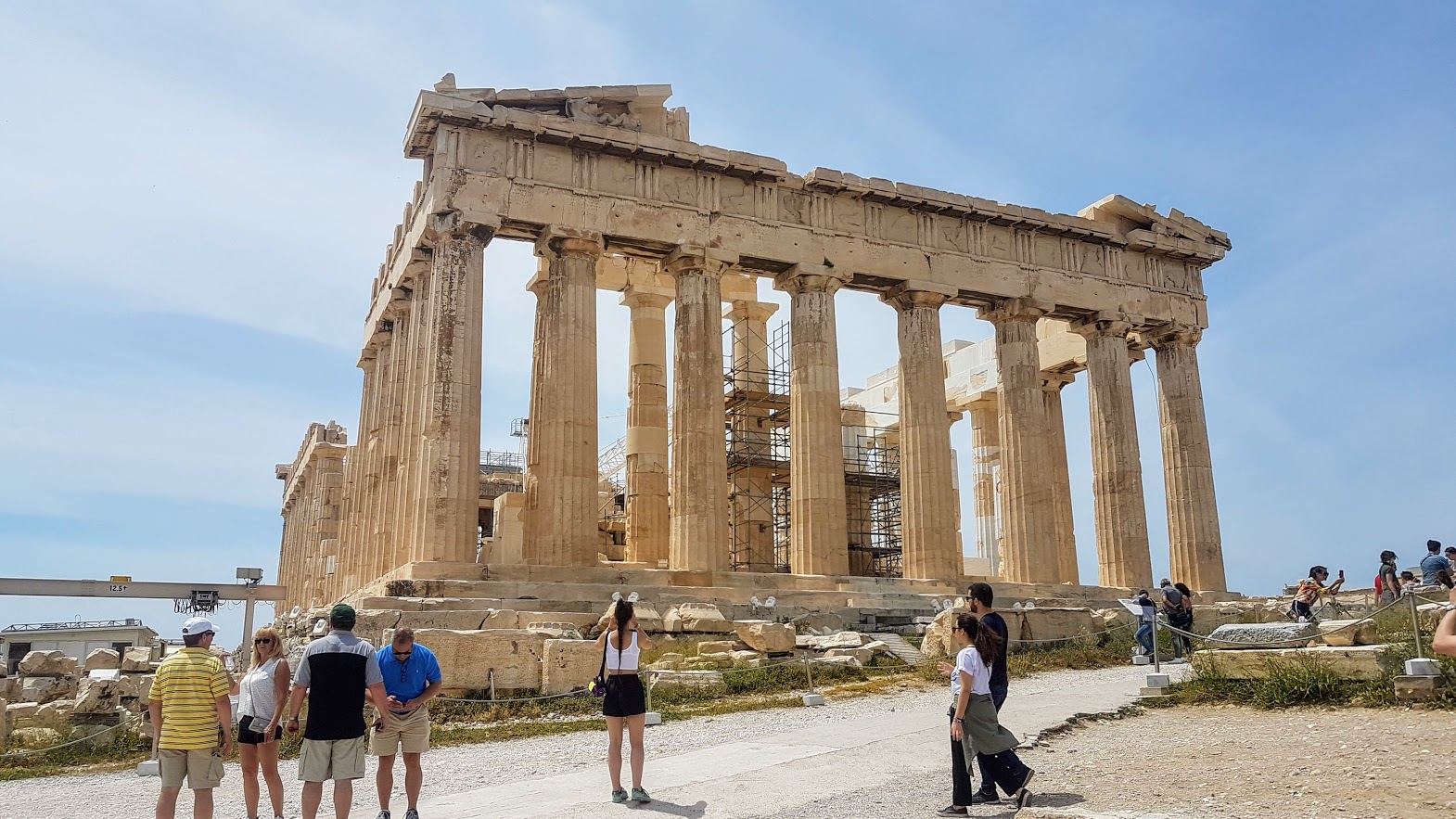
How to plan a trip to Greece
Greece! The birthplace of western civilization, the land of the Acropolis and the famous Santorini, Mykonos, Ancient Mycenae and Ancient Delphi.
There are dozens of Greek islands, tons of UNESCO sites, hundreds of beaches, ancient history and natural wonders, all waiting to be discovered by you.
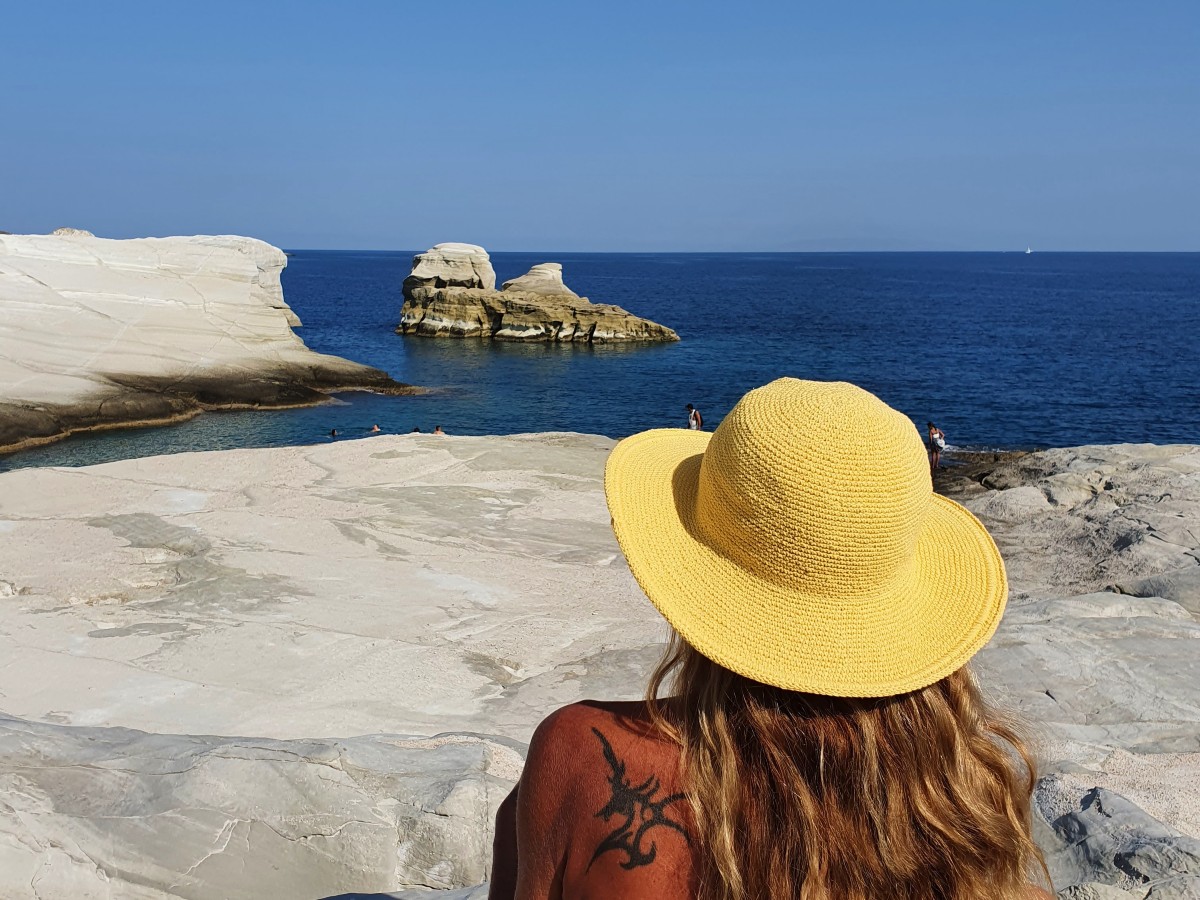
With so many choices of places to visit, deciding where to go in Greece can be overwhelming. Where on earth are you supposed to start? The short answer is, right here!
I’ve created this post to help you make the best Greece travel plan on your own, even if you have never been here before. Let’s start with a brief introduction to Greece.
Introduction to Greece and the Greek islands
Greece is a small, mountainous country in South Europe. It is most famous for its incredibly long coastline with hundreds of Greek islands , most of which are clustered in different island groups .
However, mainland Greece has an extremely varied landscape with mountains, gorges, plains, lakes and rivers.
First-time visitors are usually overwhelmed by the abundance of places to see, in combination with the number of ancient sites. This article about the famous attractions in Greece is a good starting point to find out about Greece’s highlights.
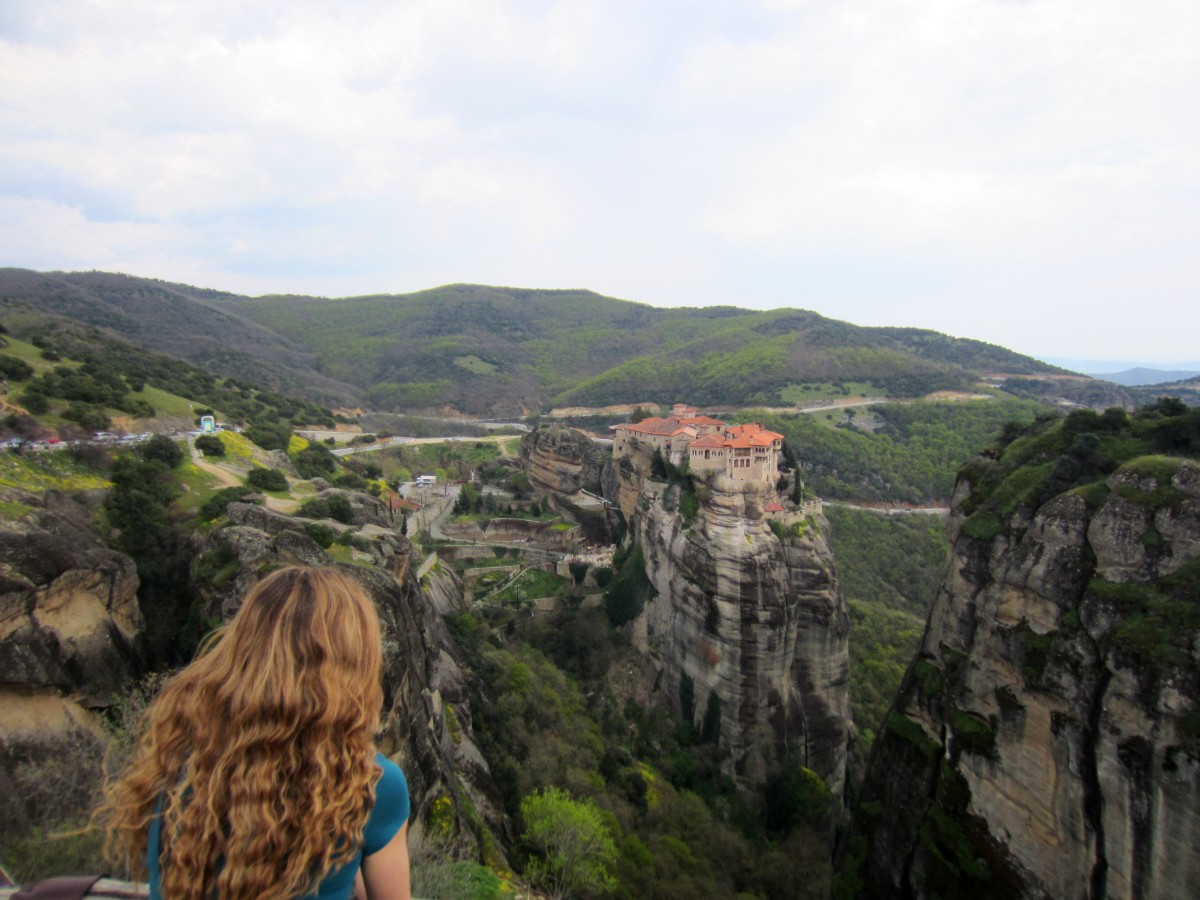
Many areas in Greece are famous for their winding streets, hilly terrain and hundreds of steps. If you are travelling with children or people with limited mobility, you will need to take that into account.
Let’s follow a few simple steps to build your perfect Greece vacation itinerary.
Step 1: Decide what you want out of your Greek holiday
The first and most important step when planning a trip to Greece is to decide what you want out of your holiday.
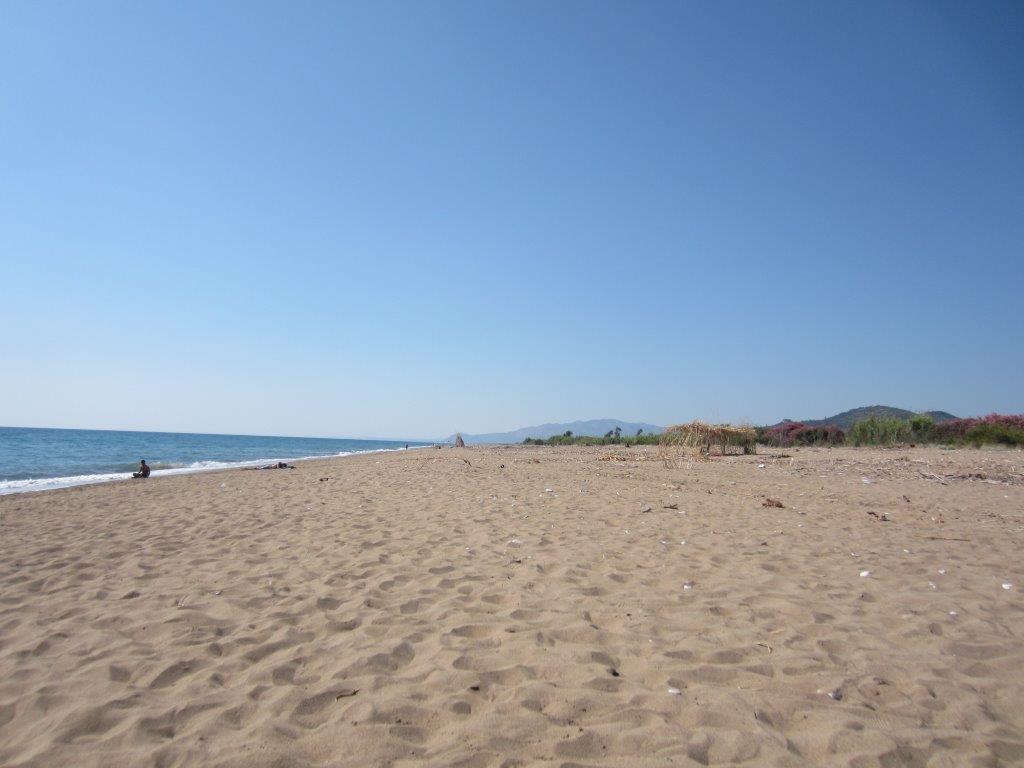
As an example, you could ask yourself these questions:
- Am I interested in history and culture, or do I prefer to relax on the beautiful beaches?
- Do I want lots of nightlife and crowds, or am I after nature and quietness?
- Am I interested in visiting the bigger cities, like Athens , the capital city, and Thessaloniki , or is the idea of Greek island hopping more appealing?
- Do I want to see the popular destinations, like Santorini and Mykonos , or would I rather visit some quiet islands ?
- If I go to any Greek islands, am I happy to take ferries or do I prefer to fly?
- Do I want to drive in Greece?
- Am I planning to travel around independently, or is it better to use one of the numerous Greece tours?
Most travellers will probably want a mix of the above. At the same time, some people might not be too interested in beach time, while others won’t care about our museums. Everyone is different, and there is no right or wrong preference.

Answering these questions, and any others you can think of, is crucial when you are planning a vacation to Greece. Your answers will determine how much of the country you can see during your trip, and where to go.
Step 2 – Study a map of Greece
If you want to plan your own Greece travel itinerary, the first thing to do is to study a map of Greece. Thankfully, with Google Maps, this is very easy these days.
If you are flying from overseas, you may be arriving at the Athens airport first. Central Athens is a 40-60 minutes drive from the airport, and you can easily get there by metro , bus , taxi or pre-booked transfer .
You can reach any Greek island with an airport on a 40-50 minute flight from Athens. By contrast, islands without an airport can take several hours to get to on a ferry .
In addition, some places in mainland Greece, like Ancient Delphi or Meteora , can only be reached by land, and are a few hours away from Athens.
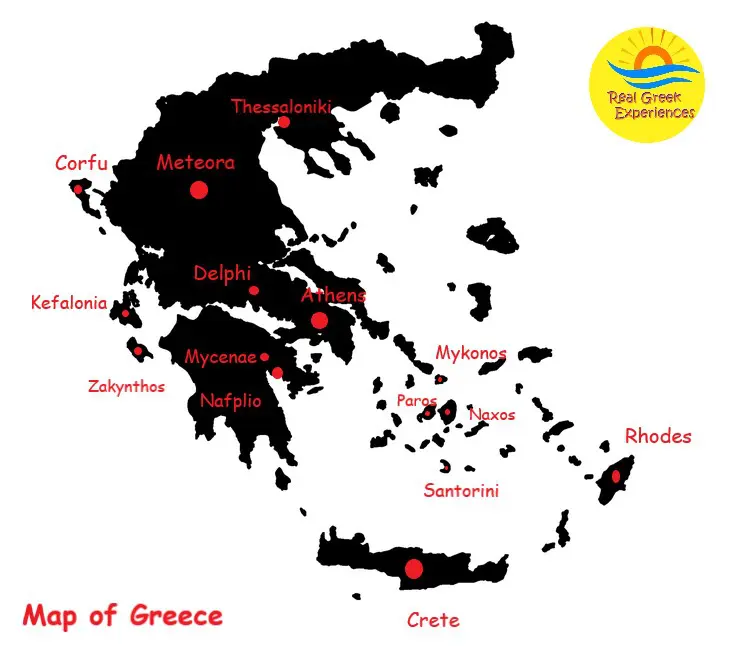
Your friends who have been to Greece will come up with different islands that they fell in love with. They may mention Santorini, Mykonos, Corfu, Kefalonia, Crete or Rhodes.
Check out all these places on the map, and you will find that they are all in different areas.
My best advice – Choose a combination of places in Greece that are relatively close to each other, or at least are not too far away. Then, check if direct connections exist between your dream destinations.
Related article: Best apps to use for your trip to Greece .
Step 3 – Do you really want to include Athens, Mykonos and Santorini in your Greece itinerary?
The combination Athens – Mykonos – Santorini is the most common route that first-time visitors to Greece think of, and a very popular itinerary.

In fact, if you are planning a trip to Greece through your local travel agency, you might not even be presented with an alternative choice. So what do I think to this combination?
Is Athens worth visiting?
I am an Athenian, and therefore biased, but I think you should really include the Greek capital in a first-time Greece itinerary.
Apart from the world-famous Acropolis, Ancient Agora and Acropolis museum, Athens has a lot more to offer in terms of history. Or if you don’t want to visit the ancient ruins , you can simply walk around them for free and enjoy the ambiance.
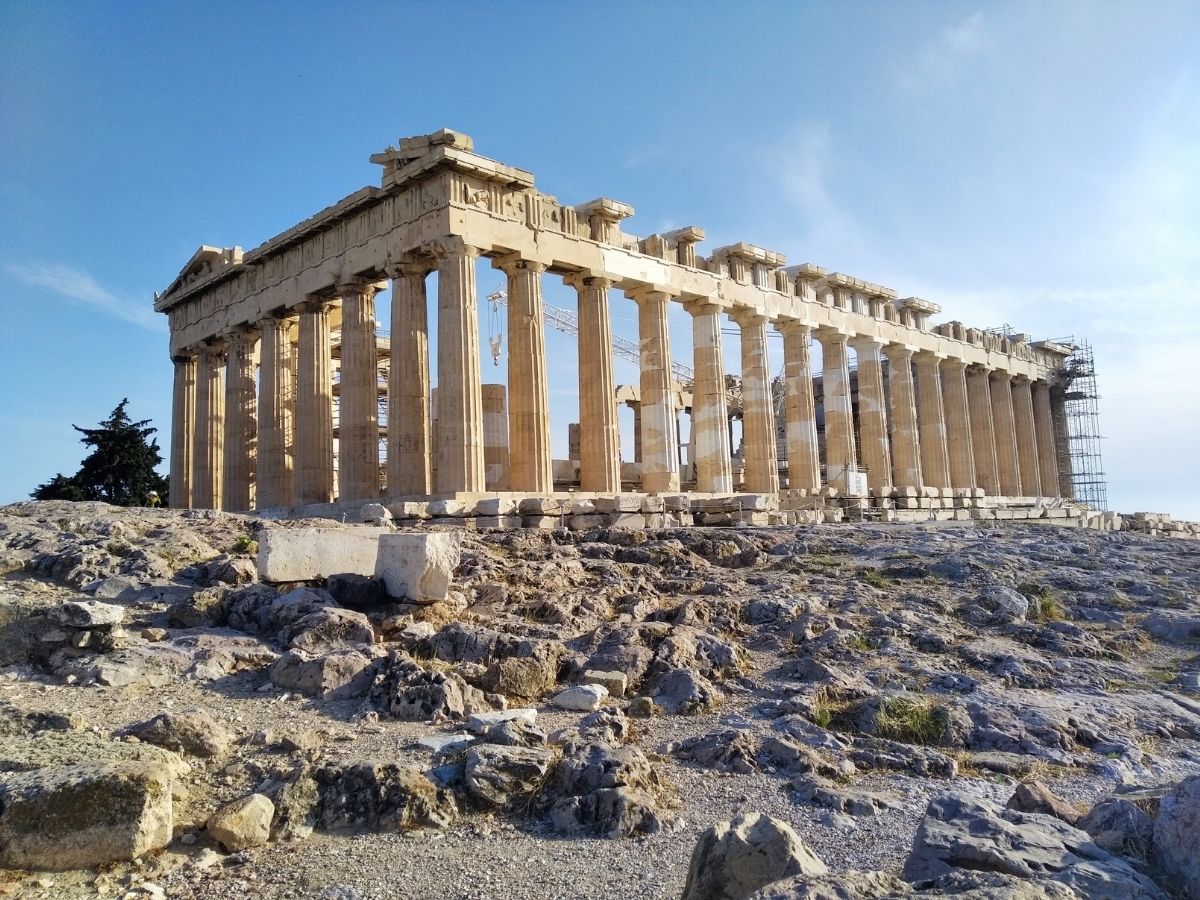
You can discover more about Athens and its magic in this article with the 30 best things to do in Athens . It includes tips on the most picturesque neighborhoods, like Plaka , Anafiotika and Psiri .
Of course, like most major cities in the world, Athens is not perfect. Many visitors find it too noisy, too messy and too dirty. They probably have a point – but I see it as part of its unique charm!
Are Mykonos and Santorini the best Greek islands to visit?
Most travelers will want to visit Santorini and Mykonos. Our two most popular islands, which are both in the Cyclades group, have almost mythological status in people’s minds, and are on everyone’s bucket list.
Let’s face it though – The original charm of these two islands is tainted somewhat by the high prices and huge numbers of other tourists, many of whom arrive on cruise ships.
There are many other islands that I personally like a lot more than Santorini and Mykonos, as they are quieter and more authentic. Here’s an introduction to the Cyclades islands , where I’m also listing my personal favorites.
However, if it’s your first time visiting Greece, you will probably want to include Santorini and / or Mykonos in your Greece itinerary. Here is some more information.
Should I visit Santorini?
The Greek island of Santorini is really a very unique and romantic place. The landscapes and views to the volcano are stunning, and the famous Oia sunset is worth seeing once in your life.
This 4-day Santorini itinerary will introduce you to the best things to do on the Cycladic island.
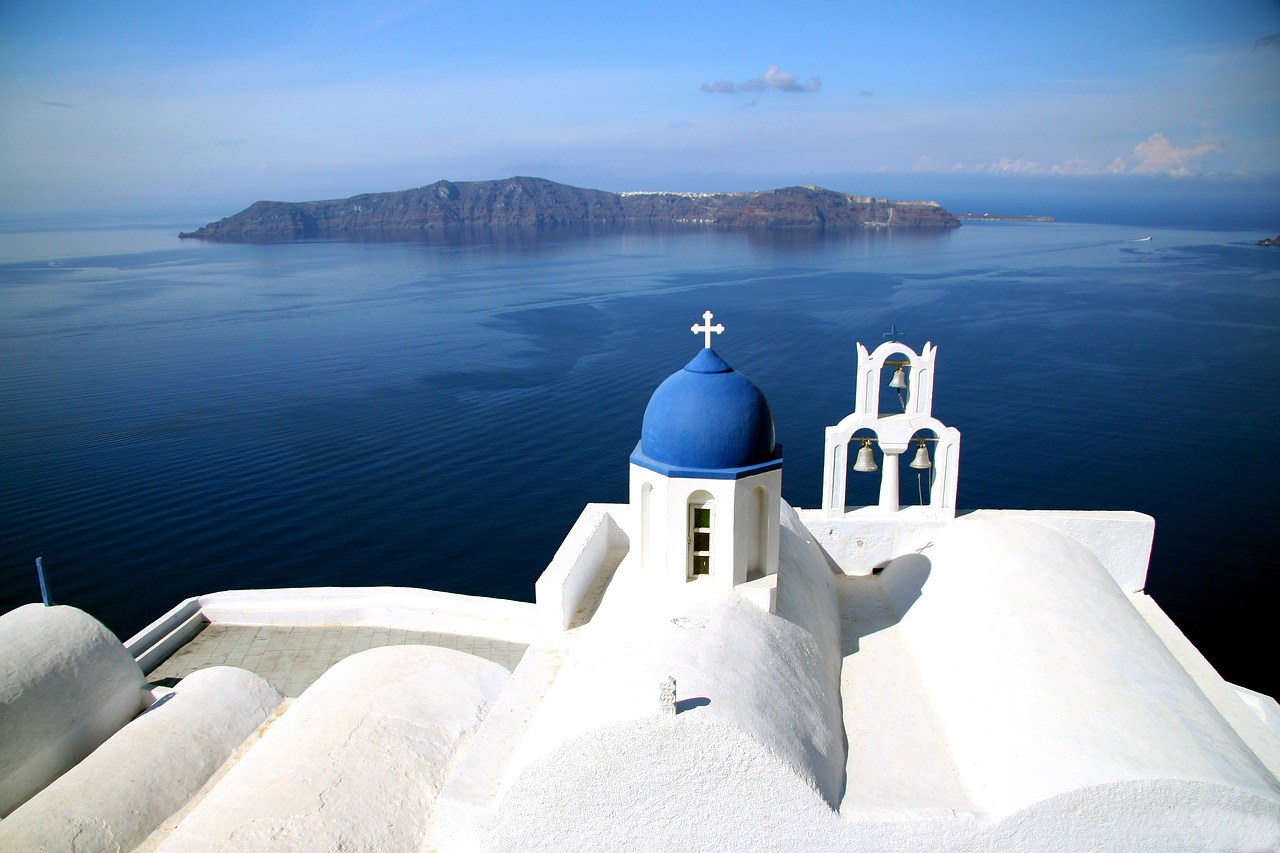
However, bear in mind that Santorini usually receives about 2 million visitors a year. If you can, try to visit Santorini in winter , or at least shoulder season, when it’s relatively quieter.
This is when I did the popular hike from Fira to Oia , on the west coast, and had an absolute blast.
If you visit in summer, be prepared for crowds, high prices, traffic and lack of parking space. Here’s a fun guide with things to avoid when visiting Santorini .
Is Mykonos worth the hype?
If I had to choose any of the Greek islands in summer, it wouldn’t be Mykonos. Quite a bold statement, isn’t it!
Now, don’t get me wrong. Mykonos is a pretty island, and it has some of the best sandy beaches in the Cyclades.
I was lucky to visit Mykonos without the crowds in June 2020, and couldn’t believe how fantastic the beaches were! I took a great kayak trip , and a day-trip to Ancient Delos , so I loved my time there.
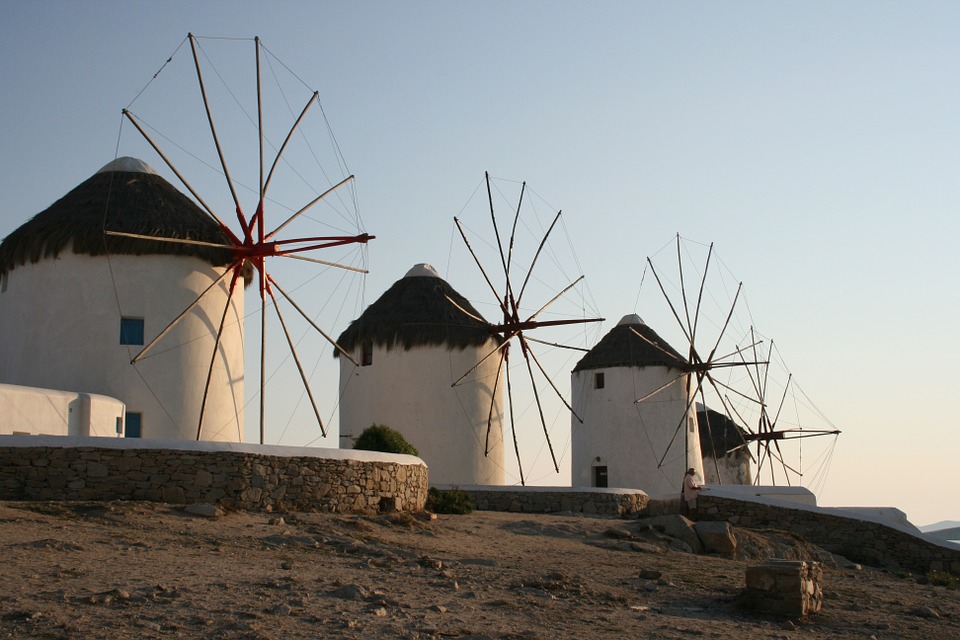
However, on most years, Mykonos can get extremely crowded and insanely expensive. Many of the beaches are packed with loud bars, loungers, umbrellas and various water sports.
I have met dozens of foreign visitors who didn’t think much to Mykonos Town, the island’s capital, and thought it was overpriced and overrated.
At the same time, I know people who return to Mykonos every year to enjoy the famous party scene and busy beach clubs.
All in all, it’s your call. If you decide to visit Mykonos, I’d love to know your opinion, so feel free to leave a comment down below.
Step 4 – How long to spend in Greece
How much time you have is one of the most important factors when you are planning your vacation to Greece – or anywhere for that matter.
As an example, if you only have one week in Greece, it’s unrealistic to plan trips to seven different areas. You will end up seeing lots of airports, ports and highways, but you won’t see much of the country.
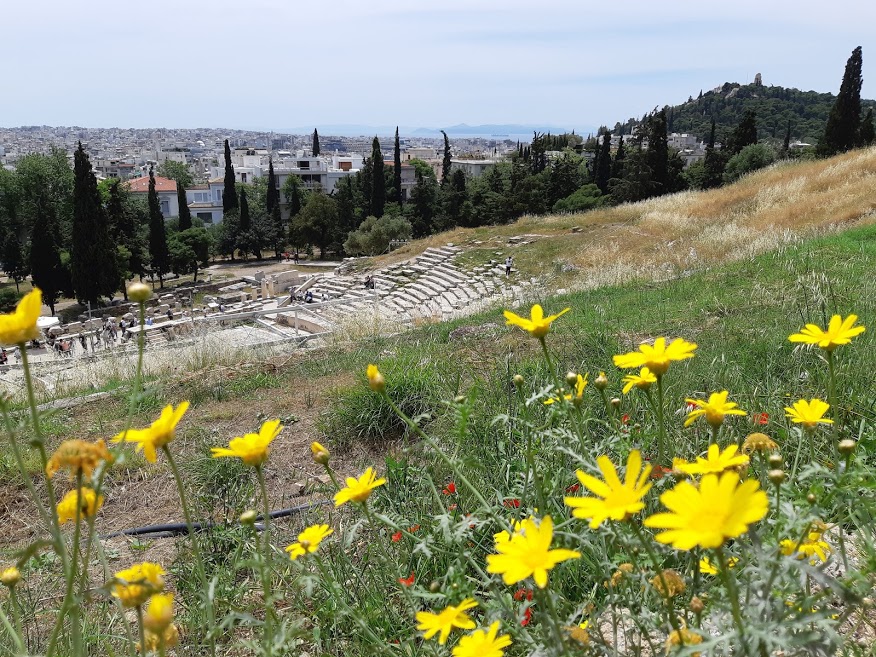
That said, few people have more than two weeks in Greece. Many visitors only have a week, and they try to squeeze in as much as they can.
If this is your style of travel by all means do it, at the same time try to appreciate the “ siga siga” Greek culture – slowly slowly.
Example itineraries for Greece
If you have a week in Greece, starting and ending in Athens, my suggestions are:
- Spend a couple of days in Athens, and visit one or two of the Greek islands
- Allow for a couple of days in Athens, and hire a car to tour around the Peloponnese and visit Ancient Mycenae , Nafplion and Ancient Epidaurus
- Spend a couple of days in Athens, and take a couple of day trips from Athens , or visit one of the islands close to Athens .
If you have two weeks in Greece, you can visit multiple islands on an island hopping trip , or go for a longer road trip including Western or Northern Greece.
Here are a few more ideas for a 2-week Greece itinerary .
Step 5 – When to visit Greece
Greece enjoys the so-called Mediterranean climate. We have warm, dry summers, with blue skies and very low rainfall.
Due to the warm weather, Greece is predominantly thought of as a summer destination. The busiest months are July and August, followed by June and September.
However, some visitors avoid the peak months as the crowds are bigger and prices are higher.
If you have a flexible schedule, visiting Greece outside peak season might work in your favour. Hotels will be cheaper, you will meet fewer crowds, and the temperatures are actually more pleasant.
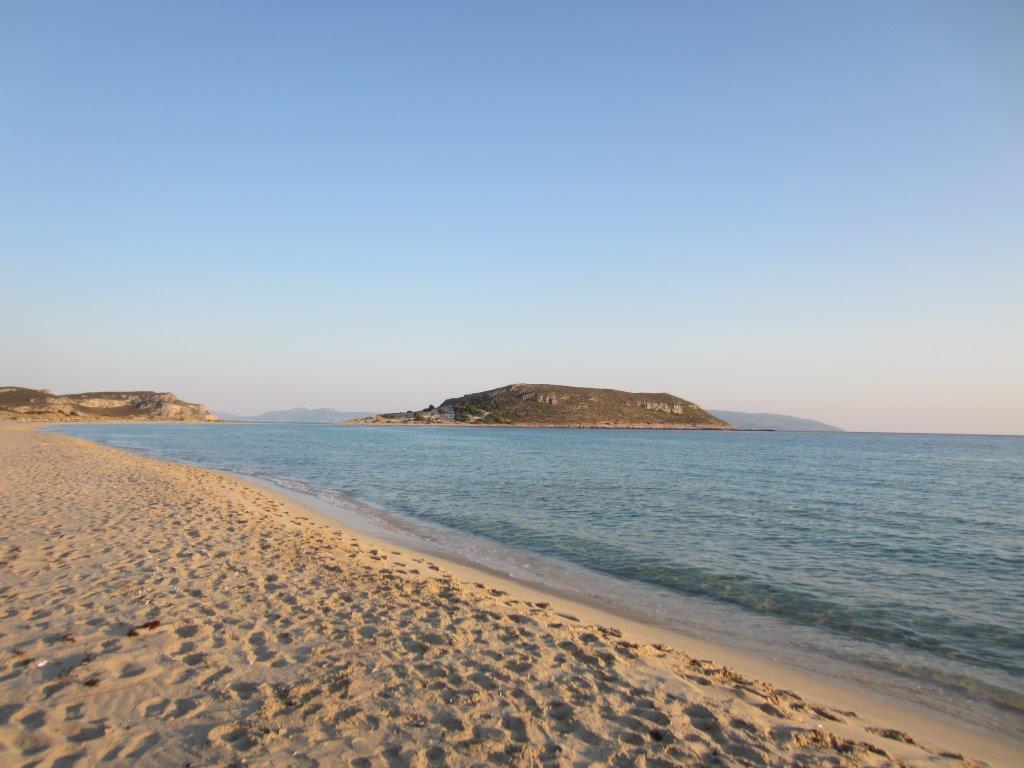
With the exception of Santorini, Crete, Corfu and Rhodes , most islands will be fairly quiet outside the summer months. Swimming might be a bit of a challenge in spring, but will be fine in autumn.
In my opinion, if you want to take full advantage of the beaches in Greece, the best month to visit is September. The water temperature is warmer than during the summer months, and you will enjoy some quiet time.
As for spring and autumn, even though the weather can be variable, with a few rainy days, it will be pleasant for the most part. This is the best time to visit the archaeological sites in Greece, as you won’t get the scorching summer sun.
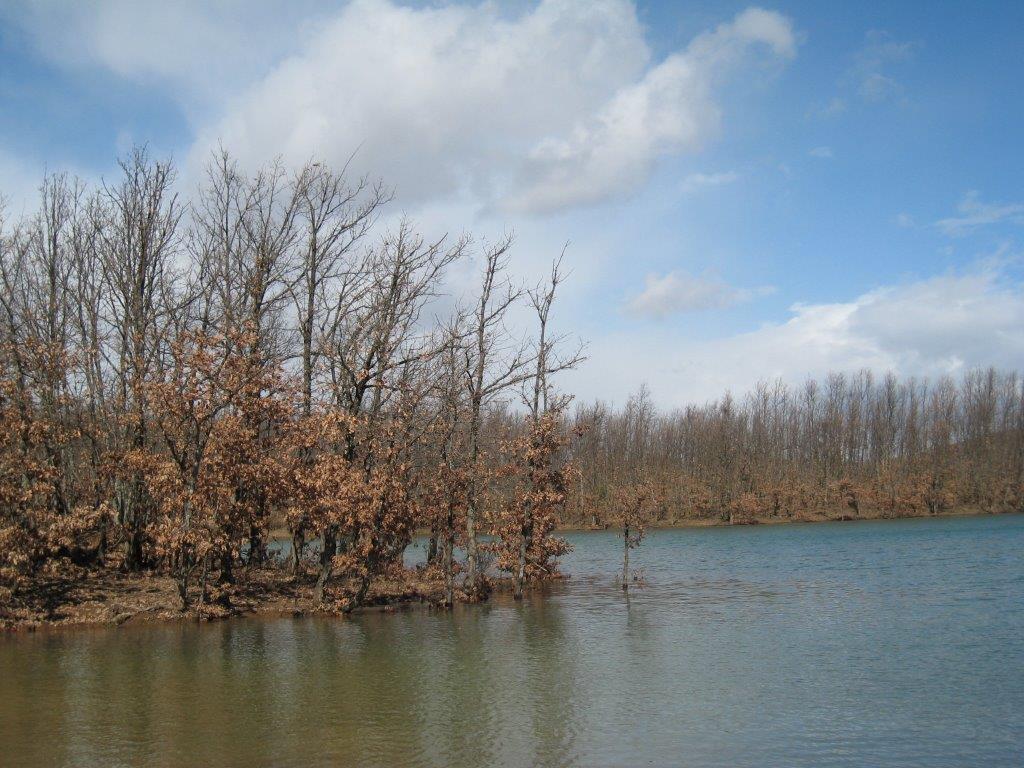
Here are some more tips on the best time of year to visit Greece . Note that our winters are much milder than other European countries, but they can still be be surprisingly cold and rainy.
If the only time you can travel to our country is summer, check out these tips for travelling to Greece in summer . And if you can visit later in the year, check out the hottest Greek islands in October .
And finally, check out my ultimate guide with what to pack for Greece , for all four seasons.
Step 6 – Budget for your vacation in Greece
Another thing that is crucial when it comes to planning your Greece vacation is your budget.
Contrary to popular belief, your Greece trip cost doesn’t have to be sky-high. Let’s break down possible costs when travelling to Greece.
Cost of accommodation in Greece
Accommodation in Greece can be fairly inexpensive. Depending on where you go and what time of the year you travel, it is possible to find a budget room for a couple for around 30 euro.
Realistically, if your Greek trip is in summer, you would want to budget for at least 50-60 euro for a decent room, though you might be able to find something more wallet-friendly.
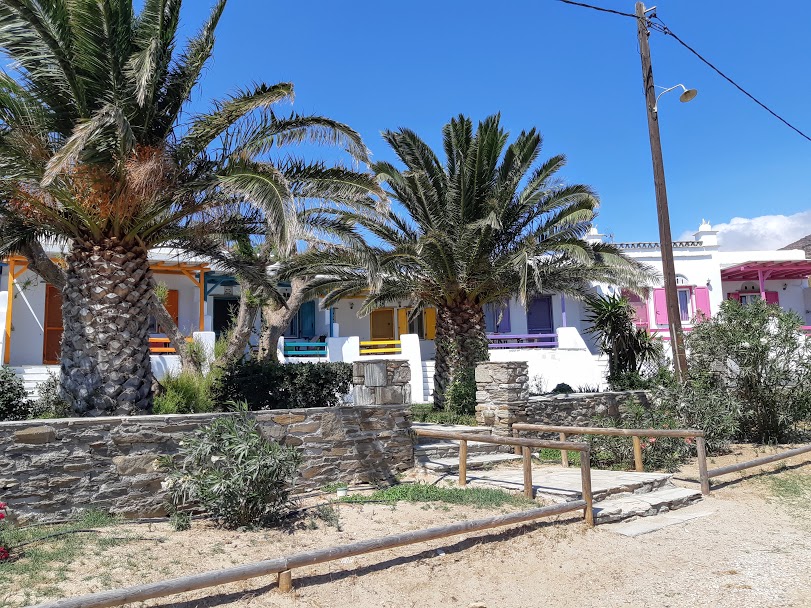
If you are on a tight budget, you will notice that hostels are not as popular as in other countries. However, there are a few in the bigger cities and the most popular islands.
On the other hand, if you want to splurge, you will find plenty of opportunity, especially in places like Santorini and Mykonos. Santorini hotels with a view to the caldera can easily climb up to over 1,000 euro a night – but you will remember that vacation forever!
I personally use Booking.com to find apartments and rooms to let in Greece. In my experience, it has a much wider selection and better prices than other platforms, and usually offers better terms.
Cost of road transportation in Greece
Transportation in Greece is not always wallet-friendly – certainly not for Greeks. In fact, if you decide to rent a car and drive around Greece , transportation might actually turn out to be your highest cost.
While many of the motorways in Greece are brand new and fantastic, there are also many toll stations. Also, the price of gas is rather high, compared to other countries in the EU, and much higher than in the US.

If you prefer not to drive, public buses are pretty good. Prices vary a lot, so you will have to check the price for the trip you want to take. As an example, a bus ticket from Athens to Delphi is about 15 euro.
Due to serious flooding in September 2023, the trains in Greece are not running properly, and it’s not certain when services will resume. You can check the latest info on the train website .
Another option is to take an organized tour, that will take the hassle away. Here is a popular organized tour to Delphi and Meteora , which includes transportation to and around the Meteora monasteries.
Cost of ferries and flights in Greece
Ferries and flights are popular ways to get around Greece and the Greek islands.
The cost of ferry tickets depends on the distance and the type of ferry you are using.
Generally speaking, there are two types of ferries: the slow ferries and the fast ferries.
- The slow ferries are much more comfortable to travel on, you can go for a walk on the deck, and behave better on windy days. A well-known operator running slow ferries is Blue Star Ferries. One-way tickets from Piraeus to most of the Cyclades islands start at around 35-40 euro.
- The fast ferries, many of which are run by a company called SeaJets, take less time. However, there is no outdoors seating. Plus, the ride will be bumpy, or might even get cancelled, on a meltemi wind day. One-way tickets start from about 70 euro and can cost over 100 euro.
Overall, I use slow ferries whenever I can, as they are bigger, more comfortable, and also cheaper. If you are pushed for time, at least try to avoid the smaller fast ferries, which have no vehicle capacity.
You can check ferry routes and book your tickets on Ferryscanner .
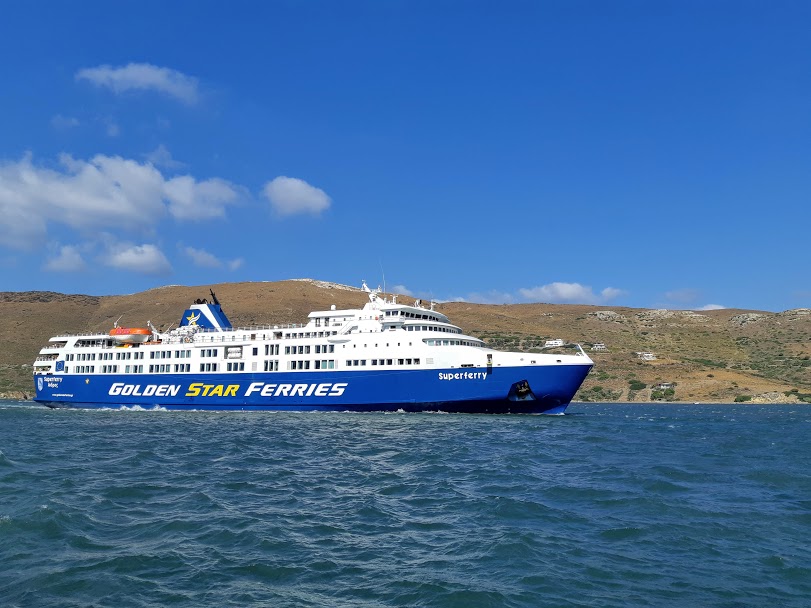
Domestic flights in Greece can be quite costly. If you are flying from the Athens International Airport to an island, book your connecting flights as early as possible. Last minute prices can get really high.
Note that, with a few exceptions, there are no direct flights between the Greek islands, and you would have to connect in Athens. The best way to visit islands in the same island group is usually by ferry.
Cost of meals in Greece
Most visitors find that food in Greece is generally good value. Obviously it depends on where you are and what you are eating, but it’s easy to eat at a nice Greek taverna with about 15 euro per person.
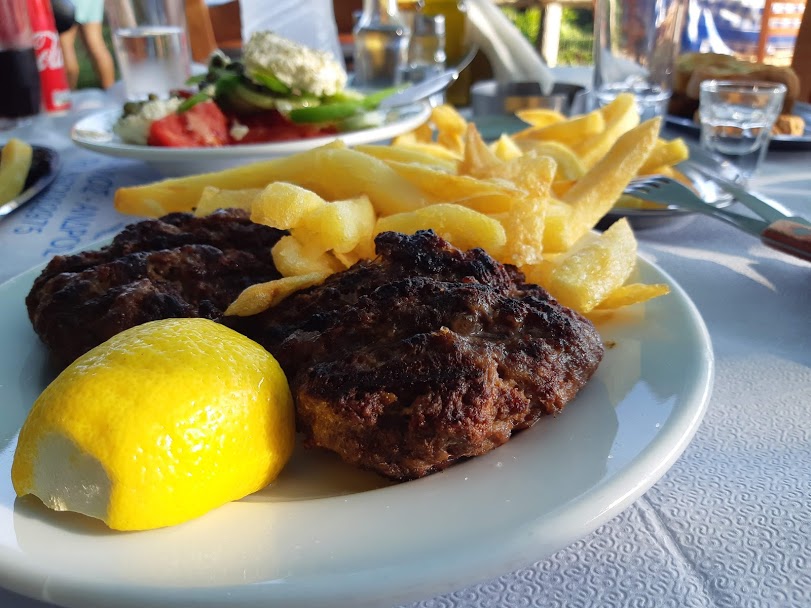
If you are interested in fresh fish or gourmet cuisine, you will need to budget a lot more for a meal in Greece. Similarly, if you are visiting places like Mykonos and Santorini, you could easily spend 100 – 200 euros per person for just one meal.
People who are on a budget can always stick to street food or fast food, like souvlaki , gyros and bakery goods. You can also do some shopping at street markets or supermarkets, and cook at the place you are staying.
Cost of sightseeing in Greece
The cost of sightseeing in Greece depends on the individual attraction. The most popular archaeological sites and museums are more expensive.
As an example, the combined ticket for the Acropolis and the other sites in Athens costs 30 euro. Prices for the individual sites decrease during the winter months.
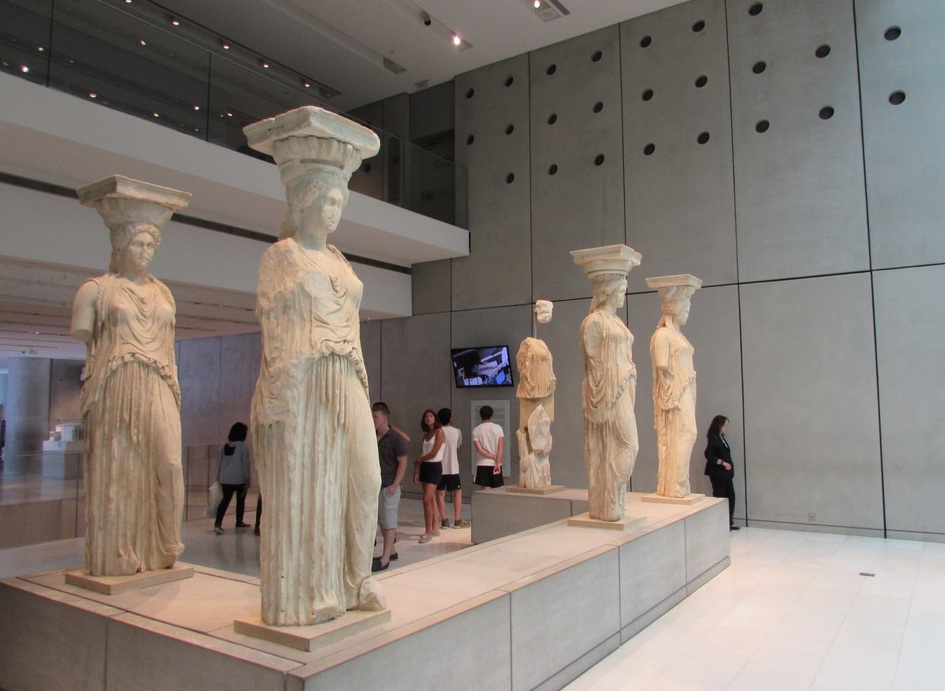
If budget is not a concern, you should visit the sites and museums with a guide, who will help you understand more about our fascinating history and life in Ancient Greece.
If you are travelling with children, you could consider doing some sort of Greek Mythology travel itinerary. There are several tour companies specializing in guided tours and Greek mythology tours .
At the same time, there are usually some free activities in most destinations. Here are some free things to do in Athens .
Greece is not expensive
From all the above, you have probably seen that you can easily explore Greece, appreciate its natural beauty and enjoy some beach life on a budget.
My partner and I usually end up spending about 40-50 euro per person per day. Here is an article with our budget on a month-long island hopping trip around the Cyclades, including a couple of day trips to small islands. I’m sure you will agree that Greece isn’t expensive !
Step 7 – Prepare for the occasional strike
You may have heard about it, and it’s absolutely true – sometimes, there are strikes in Greece . These generally affect public transportation, including ferries, trains and the Athens metro and buses.

The strikes are often announced only a couple of days in advance, and there is no way to predict when a strike is going to happen. That said, the 1st of May is always a strike day for ferries and most means of transport in Athens.
The most valuable suggestion I can give you is the following: If you are arriving to and leaving from Athens, it’s best to spend the last few days of your trip in the capital. This way you won’t be stuck on an island if a last-minute ferry strike is announced.
You could also consider getting travel insurance, which will cover you in case of strikes.
Have a look at this list of things you should know about Greece , apart from strikes.
Step 8 – Learn a few words in Greek
And now for something fun! While English is widely spoken in Greece, I would recommend trying to learn a few words and phrases in Greek .
You could also have a look at the Greek alphabet . Believe it or not, our alphabet has remained the same since the times of the Ancient Greeks. Then you may be able to read some of the inscriptions you will see in the museums and ancient sites.
Or, you might be keen on learning how to swear in Greek !
FAQs about planning a trip to Greece
Here are some questions often asked by people planning to visit Greece:
How much does it cost to plan a trip to Greece?
The cost of a trip to Greece can vary significantly, and it depends on the places you visit as well as the time of year. While it’s possible to travel for about 40-50 euro per person per day, it’s advisable to budget for more than that. Expect to pay around 100-150 euro per person per day, especially if you are visiting the most expensive destinations.
How do you plan a trip to Greece?
If you want to plan a Greek vacation, begin by asking yourself what you want out of your holiday. Afterwards, study a map of Greece, read about the attractions and best places to go, and decide how many of these places you can visit in the time you have.
What is best time of year to go to Greece?
The best time of year to visit Greece is spring, the beginning and end of summer, and early autumn. If you can, avoid peak season (July and August) as it tends to get more crowded (and expensive).
What is the cheapest month to travel to Greece?
Two of the cheapest months to travel to Greece include November and February. While this is not the best time to go to Greece if you want to spend time on the beach, you will see a totally different side of the country.
What should I avoid in Greece?
The number one thing you should avoid in Greece, is throwing toilet paper in the toilet. The sewage system in many areas is a bit dated, and the last thing you want on your Greek holiday is a clogged toilet. Just use the bin, and everything will be fine!
Here’s why you shouldn’t flush paper down the toilet in Greece .
Have a look at these other articles:
- 22 beautiful places to visit in Greece
- Athens to Thessaloniki by train
- Athens in November
- Little Kook in Athens
Start planning your trip to Greece today
With all the above in mind, you will hopefully be a little closer to planning your dream Greek trip. So why don’t you start putting your notes together!

Hi, I’m Vanessa from Athens and I hope this guide has helped you think about your future trips to Greece! If you have any specific questions, please ask in the comments section, and I’ll get back to you with personalized suggestions and advice! Feel free to follow my FB page for news and ideas about Greece.

3 thoughts on “Plan A Trip To Greece – Travel Tips And Advice From A Local”
Useful and succinct info for people. Thank you. I like the suggestion of a 1-week stay best staying IN Athens and day tripping out. Does that also apply to staying on the outskirts, or periphery, of the city and tripping in to the city for site-seeing as well as island excursions? Kevin
Where were you thinking to stay? Some people plan to stay on the Athens coast (e.g. Faliro, Glyfada, Voula or Nea Makri on the other coast) and take day trips into the center. This would require a lot of driving / taxis. If your main aim is to sightsee in the centre, I would personally suggest staying in the centre, but if you are only interested in the highlights that can be covered in two or even one days it would be fine to stay on the coast.
That’s an amazing information, Vanessa. You are right, planning for Greece gets overwhelming with so much choice and information. I’m glad I found your blog. Thanks for simplifying.
Leave a Comment Cancel reply
Save my name, email, and website in this browser for the next time I comment.
inspectgreece
inspect Greece
Travel · June 28, 2023
39 Essential Greece Travel Tips You Must Know
Just a heads-up: Some of the links in this post are affiliate links. That means if you click and purchase, I might earn a tiny commission (at no extra cost to you). Read more on my Disclaimer Page .

Having worked in the travel industry for more than 10 years and having spend a good portion of that time living off my suitcase, in preparation for their vacations in Greece, my friends from abroad often ask me: What are my top Greece travel tips?
Now, don’t expect to see things like, “My best tip is that Greece has beautiful beaches”. Or, “Greece has delicious food”! Since you’ve decided to vacation in Greece, I’m assuming you already know that Greek food is amazing and our beaches are dreamy.
In other words, my goal with this post is not to ‘sell’ you Greece. Instead, I’m going to give you my most practical and most useful Greece travel trips. That is, everything you need to know to enjoy a stress-free , surprise-free , memorable holiday in Greece.
I’m covering everything from cultural differences you need to be aware of, safety tips , money-saving tips , and all my best Greece travel tips as a local and travel industry expert .
Money-Saving Greece Travel Tips

Here are a few tips and tricks to help you manage your vacation budget more efficiently and help you save money when you travel to Greece.
Take seasonality into consideration
I’ve worked in the travel industry in Greece for more than 10 years now, and this is one of the most important Greece travel tips I can give you: Seasonality can make or break your vacation budget.
Seriously, the same hotel room can cost 50 EUR in the shoulder season and 150 in the high season.
Seasonality also impacts how much you’re going to spend on a meal, a sun lounger, your ferry tickets, a rental car, and pretty much everything.
For me, the best time to visit Greece is in September. It is (usually) not too hot, not too busy but busy enough, and the prices are much more reasonable than in August. And if you’re looking to relax and switch off and be off the grid for a little while, then a good idea would be to visit Greece during low-season.
Bottled water has a fixed price
Tap water is ok to drink in many areas , especially in mainland Greece.
However, if you prefer bottled water or if you’re visiting an area in Greece where tap water isn’t drinkable , like in the Greek islands, know that bottled water has a fixed price.
Small (500 ml) bottles of water cost 50 cents, large (1L) 1 EUR, and extra large (1.5 L) 1.5 EUR. These are the prices from most waters apart from some very fancy ones like Fiji Water or Evian.
Unfortunately, some people take advantage of the much higher prices of water in other countries and try to charge tourists more than that.
Well, now you know and you won’t be taken advantage of .
Take local advice with a grain of salt
Raise your hand if you’re ever asked the receptionist of your hotel or your Airbnb host to suggest a good restaurant nearby. Or maybe you asked them to hook you up with a rental car or something?
My experience traveling around Greece for work on a regular basis has taught me that often the locals will suggest their friend, cousin, or father’s taverna/bar/rental car service or whatever it is that you need.
And unfortunately, that doesn’t necessarily mean that this is the best place or that it’s the best value-for-money option.
So, do your research and don’t rely solely on local advice .
You may also like: Find The Cheapest Greek Island To Visit In 2024
Cultural Greece Travel Tips

I don’t know about you, but for me being aware of certain cultural differences when I visit another country is very important.
First and foremost I think it shows respect towards the locals and the local culture.
It also means that you will be prepared, you’ll know what to expect, and you won’t put yourself in danger.
Tipping isn’t mandatory but encouraged
I know that in some cultures tipping is almost mandatory but in Greece, it’s not.
However, those in the hospitality industry are often overworked and underpaid so tipping is highly encouraged.
Greeks take hospitality very seriously
It is in our blood to go above and beyond to make sure our visitors are happy.
We Greeks take serious pride in our hospitality skills , and we can actually get offended if someone doesn’t welcome our hospitality.
For example, the owner of the BnB you’re staying in might bring you some fresh fruits and vegetables from their garden. And if you didn’t accept them, let’s just say it wouldn’t sit well with them.
Catcalling is common
Unfortunately, Greek society is still very much patriarchal and macho .
This means that you can expect to get a lot of catcalling from random men on the streets, and possibly find yourself in uncomfortable situations.
Greek people speak English
Most Greeks speak good English , especially in touristy destinations.
Overall, you shouldn’t encounter any communication problems.
Also, most bars, restaurants, and tavernas have English menus too.
Greek people don’t like queuing
Don’t be surprised if you are at the beach bar in Paros trying to figure out where the end of the queue is. There probably isn’t one.
Be prepared that you may have to fight for your right to a nice cold drink !
No, I’m joking. Just beware that you may have to either wait longer or become a bit more ‘aggressive’ to get served,

Dress appropriately for religious sites
If you’re planning on visiting churches or monasteries make sure that you dress appropriately .
For men, this means long trousers and at least a T-shirt. They won’t allow you to go in if you show up in shorts and a tank top.
For women, a long skirt or dress with short or long sleeves.
The idea is that you should show as less skin as possible .
Keep in mind that in most monasteries they can lend you appropriate clothing to go in. So, if you’re ok with wearing clothes that other people have worn before you then you don’t need to worry about your clothes.
Nudism is acceptable
Even though Greece is in many ways a rather conservative country , you will find that there are certain areas where it is also quite progressive .
Don’t be surprised if you see topless women at the beach. It is quite common. As is wearing tanga bikini bottoms .
In Greece, both in mainland Greece and on the Greek islands, you will find many nudist beaches where being naked is totally acceptable.
You may also like: Why Do We Celebrate Name Days in Greece?
Greece Travel Tips For Your Safety

I’m sure that many of these tips are relevant to all tourist destinations but I think it’s important to reiterate them here as safety is key when you travel.
Beware of pickpockets
I guess this is true of all busy and touristy places but I feel it’s necessary to point it out.
Do what you need to do to keep your belongings safe during your trip because there is nothing worse than having your passport and credit cards stolen when you’re on holiday. It can really spoil your amazing bucket list vacation.
I love traveling with my anti-theft backpack because it makes me feel safe and keeps my mind at ease.
People may try and take advantage of you
That’s another piece of advice that I guess is universal when it comes to traveling abroad but I’m pointing it out as a reminder for my readers.
Overall Greece is a safe country and, as I mentioned above, Greeks are very hospitable . But you may find yourself in situations where people try to take advantage of you because you are a tourist .
Well, the joke’s on them because you’ve read my post on the best Greece travel tips and you’re a pro now!
According to the latest ILGA-Europe rating Greece ranks 13th amongst Europe’s 49 countries.
This means that Greece is relatively safe for the LGBTQ+ community but there is a lot of room for improvement .
As a local and an LGBTQ+ ally, first of all, I would say that there are places that are more welcoming than others. According to travelgay for example, Mykonos is the most popular gay destination in Europe. And Lesvos is where the International Eressos Women’s Festival takes place every year to bring together women of the LGBTQ+ community.
Though incidents of extreme violence towards LGBTQ+ persons are luckily not common in Greece, there is unfortunately still a lot of stigma and judgment of the LGBTQ+ community.
This means that openly LGBTQ+ persons may still experience incidents of being made fun of or being asked not to be openly affectionate in public spaces.
Quality of alcohol
This is one of the Greece travel tips that only a local can tell you. And it’s a big one.
It is not uncommon in Greece for bars and clubs to serve alcohol of bad qualit y. And I don’t just mean cheap or watered-down alcohol. Rather, I’m talking about tainted spirits where they replace ethanol with methanol in order to maximize profit. This is of course dangerous for the consumers and I honestly don’t understand how people can get away with it.
Unless you drink the same alcohol regularly it is unlikely that you will recognize it the moment you drink it. Unfortunately, it’s not until the next morning when the really bad hangover symptoms kick in (even if you haven’t had so much to drink) that you realize you’ve been served what we call ‘a bomb’.
My best tip? On the islands, you’re better off drinking bottled beer and wine . In cities like Athens, it’s best to visit bars where you see many locals (let me know in the comments section down below if you need any advice on which bars and clubs to visit in Athens).
Emergency Numbers
It’s always good practice to know the emergency numbers of the country you visit and for Greece, these are: 100 for the police, 166 for an ambulance, and 199 for the Fire Department. Alternatively, you can call the European Emergency number at 112 for any type of emergency you encounter.
Greece Travel Tips For Moving Around

Ok just a heads up…in this section, I’m bashing Greece quite hard. I love Greece and I think it’s one of the best places in the world. However, as much as I love it, I have to be honest about its flaws and I think that this is one of the areas where we can improve the most.
Driving in Greece can be scary
A few years back I was in Cyprus for work and I had to rent a car. I was so scared because not only was I driving abroad for the first time but I had to learn how to drive on the left-hand side of the road. The guy at the rental car company saw how worried I was and in an effort to calm me down he said “If you can drive in Greece you can drive anywhere”. And boy was he right!?
Honestly, it wasn’t until I drove in Cyprus that I realized how hard and how exhausting it is to drive in Greece. Drivers don’t respect the red lights or the stop signs, they are aggressive , their hand is glued on the horn, and motorcyclists pop out of nowhere all the time, need I go on?
At the same time, renting a car in Greece is in many ways the best way to travel especially because our public transport isn’t great (I told you I was going to bash Greece in this section).
So if you decided to rent a car in Greece my best tip is to be extra careful, and to pay the extra fee for the Full Protection insurance .
Pack your walking shoes
This is one of THE most essential Greece travel tips so take notice.
Pack a good-quality, comfortable, and durable pair of walking shoes.
If I had a penny for every tourist in flip flops I’ve seen trying not to fall down in the slippery ancient ruins of Athens, I’d be rich enough to quit my job.
If you’re more of the walking sandals type of person, you may want to consider wearing them with socks as the Greek sun is so hot that can easily burn your toes in a matter of minutes.
Your high heels may have to stay back home
Most of the Greek islands have cobblestone streets . And trust me, it is so easy to strain your ankle if you’re trying to walk down a cobblestone street in heels.
A pair of flat sandals or espadrilles are perfect for a summer night out on the islands.
People with mobility issues will find Greece hard to navigate
Although in recent years there have been many efforts to change that, the truth remains that Greece is not friendly to people with mobility difficulties .
One big issue is the lack of infrastructure . For example, very few archaeological sites are friendly to people with impairments. The pavements of big cities are often nonexistent or completely damaged, and on the islands most of the streets are made of cobblestones, there are steps everywhere, and disabled access is rare.
Moreover, locals often display an outstanding lack of empathy . For instance, as shocking as it may sound, it is common to see cars parked on wheelchair ramps.
Unfortunately, if you do have a mobility impairment you need to plan your vacation to Greece very carefully and down to the T.
Strollers are hard to use
For similar reasons, if you are a parent with a stroller you may find Greece frustrating.
My best advice as a parent is to either use a Yoyo stroller that is very lightweight and folds easily, or a baby carrier. Or, you know, make that baby walk!
Public transportation isn’t great
This isn’t the case everywhere in Greece but it’s definitely true for many of the islands.
The problem is that there aren’t many buses and they don’t run regularly. So if you visit during peak season you may have to wait a lot under the hot Greek sun for the bus to come.
Also, buses usually cover the very basic spots . This means that if you wish to really explore the place you visit, then you’re better off renting a car or a scooter.
Taxis are cheaper
Greece’s taxes are cheaper than in most European countries or the United States.
There are some hidden fees, for instance the extra cost you pay when you get picked up or dropped off at the airport or port, but in general, they are definitely cheaper.
To ensure you don’t get scammed by a taxi driver though (not that it’s a common thing, but it can happen), you can use an app called Free Now . It’s the cheapest and safest way to get around in the big cities in Greece.
Unfortunately, don’t expect to see many taxis on the Greek islands . However, you can use the app Welcome Pickups which is available in the most famous Greek islands like Mykonos, Santorini, and Crete.
Try the hop-on hop-off bus or the walking tours
The hop-on hop-off bus tour is a great way to see Athens especially if you’re just staying for a day or two on your way to the islands.
There are also many walking tours organized by locals that are worth booking. I particularly like walking tours because you can choose one that is tailored to your interests and schedule. For example, you can choose a gastro walking tour or an early morning walking tour.
Practical Greece Travel Tips To Be Aware Of

Credit cards and debit cards are widely accepted but…
Up until the pandemic cash payments were far more popular than card payments. However, in the past few years, this has changed completely and credit card and debit card payments are widely accepted almost everywhere.
Nonetheless, having a bit of cash on you is good practice.
In remote places, the internet connection is unstable rendering credit card machines useless . Also, some shops have a minimum amount you need to spend to be able to pay with a card. And finally, though rare, there are still places that don’t have a credit card machine.
Now speaking of cash, bear in mind that getting cash on some of the islands isn’t always easy .
The very small islands usually have one or two ATM machines. And very often they run out of cash or are out of order.
In other words, get your cash before you get to the islands to avoid disappointment.
Another tip I can give you is to avoid the so-called international ATMs because they have high transaction fees.
Instead, prefer the local banks’ ATMs such as Eurobank, Piraeus Bank, or the National Bank of Greece.
Getting supplies on the islands can be challenging
I know so many people that have been shocked by the remoteness of some of the Greek islands that I feel obliged to share this as part of my best Greece travel tips.
The smaller the island, the more limited the options. This means that if you take any specific medications, or use a specific brand of shampoo or toothpaste or whatever, it’s highly likely that you won’t find it. So get your supplies before traveling to the islands especially if you’re planning on visiting the smaller islands.
You may have no signal on your phone
Yes, I know it’s 2023, but it’s true. The signal on your phone may be off when you are on the Greek islands.
Many people may find this frustrating, but I choose to be the glass-half-full type of person and see this as a great opportunity to do a social media cleanse and a rare opportunity to completely switch off from the internet (that is until my Google Maps isn’t working and I go around the island for hours..).
Visit the ancient ruins early in the morning
A lot of people will tell you to avoid visiting ancient Greek sites like the Acropolis when the sun is at its peak. In fact, many people will tell you to go in the afternoon right before the sun sets, which coincidentally is when archaeological sites close.
Personally, I think that’s bad advice. And here’s why.
The marble that these monuments are made of is really good at absorbing heat . So yes, if you visit near sunset you avoid the hot sun but you don’t actually avoid the heat. In fact, at this time the marble radiates all the heat making the whole place unbearable.
Ideally, you want to go very early in the morning which is the cooler it gets at these ancient sites.
Environmental Greece Travel Tips

The Greek sun is strong
Please don’t mess with the Greek sun. It’s strong and dangerous .
Use SPF , sunglasses , and a hat with high UPF protection, and avoid being in the sun from at least 12 PM to 5 PM.
Water shortage on the islands
It goes without saying that water is precious and we shouldn’t waste it.
When it comes to the Greek islands there is an additional reason why you should be very mindful of your water usage.
Fresh water is actually shipped to most of the islands as they don’t have water springs.
This means that water is expensive and hard to get so please do keep that in mind.
You shouldn’t flush toilet paper down the toilet
I know that for many people that’s an ick factor. The truth though is that our sewer system isn’t built for it .
So to avoid blocking a toilet – which is so much ickier – you should use the little bin for your toilet paper, cotton pads, baby wipes, sanitary products, and anything else you may use in the bathroom.
Stray animals
There are many stray animals in Greece despite the rigorous efforts of animal welfare groups.
In fact, stray cats have become somewhat of a symbol of the Greek islands making their appearance on Greek postcards.
I would advise you to avoid petting the stay dogs in the cities. Most of them are friendly, however, some of them can be aggressive, often due to the fact they have experienced abuse.
Don’t ride the donkeys
Riding the donkeys on the islands of Santorini and Hydra is a popular attraction.
However, these animals are not taken care of , they are abused and left in the hot Greek sun for hours. So please don’t perpetuate this horrible attraction.
You may also like: A Local’s Ultimate Packing List For Greece [2024]
Greece Travel Tips To Make The Most Out Of Your Vacation

Greece has so many options
Surely Greece is mostly known for its islands and its dreamy beaches.
But did you know we also have beautiful mountains (hi Mount Olympus)? And lakes , rivers , forests , and cities , and you name it! Greece has it all!
So do thorough research before you get here and don’t limit yourself!
Shops may be closed on Sundays
Depending on where you are, shops may be closed on Sundays.
In the cities for example they are typically closed.
On the other hand, on the islands because of the summer season, many clothing stores and souvenir shops are open all week long.
Museum opening hours and getting tickets
Make sure that you check the opening hours of the museums and archaeological sites you want to visit as they differ. Typically they are closed on Mondays or Tuesdays but this can be different on the islands. A simple Google search of the museum or site you want to visit will answer your question.
Also, many museums, especially the larger ones, offer the option to pre-book your ticket online which can save you a ton of time.
Use tour guides
Many people tend to visit museums and Archaeological sites by just going in and straight out without really making the most out of this opportunity. I know I’m definitely guilty of having done that in the past.
Greece is a beautiful country with a very rich history and culture . Take advantage of your visit to Greece to emerge yourself in the Greek culture by using guided tours .
Luckily, in Greece, it’s easy to hire a licensed tour guide. You can find one via the Association of Licensed Tourist Guides .
Alternatively, you can use audio guide handsets that are offered at most museums.
Book ferry tickets and rental car in advance
If you’re traveling to Greece in high season don’t wait until the last minute to book your ferry tickets and your car.
Availability is limited and there is a good chance you won’t be able to find a ticket if you don’t book early.
Also, chances are that even if you do find availability prices will be surging at the last minute.
Useful apps
Finally, there is a number of apps you can use while you are in Greece in order to make the most of your vacation. These are also apps that will make your vacation stress-free.
I already mentioned Free Now and Welcome Pickups that I highly recommend booking a car or taxi.
If you want to order food, drinks, beverages, groceries, flowers, or whatever else your heart desires you have 2 great options. Firstly, the app efood , and secondly, Wolt .
In Athens, you can use the OASA app to help you with the timetables of the metro, tram, and buses .
Finally, the Ferryhopper app is by far the best you can use to book your ferry tickets .
You may also like: 35 Best Souvenirs From Greece To Buy As Gifts
And there you have it. These are my top Greece travel tips!
Do you have any suggestions that you would like to share? Any thoughts, questions, or comments?
Please leave them down below!
Until the next time…
join the club
You’ll also love.

Leave a Reply Cancel reply
Your email address will not be published. Required fields are marked *
Save my name, email, and website in this browser for the next time I comment.

Find The Cheapest Greek Island To Visit In 2024
Trending now.
Follow @inspectgreece
Please go to the Instagram Feed settings page to create a feed.
- Privacy Policy
- Terms & Conditions
Copyright © 2024 inspect Greece · Theme by 17th Avenue
Travel tips for Greece: 10 things to know before visiting Greece
Greece is one of the most popular destinations for international travelers, attracting millions of visitors every year. However, despite Greece’s similarities with other European countries, there are also some differences. Therefore, in this article, I’ll share 10 travel tips for Greece to help you have a more easygoing vacation.
The following Greece travel tips focus on how things work in this beautiful Mediterranean country. This article’s goal is to inform you about the things you need to know before visiting Greece. That said, that’s more of an introduction to the country and less of a travel guide. If you’re interested in reading about specific locations, you can browse my articles about Greece here .
So, let’s start now with the tips for traveling in Greece.
Table of Contents
*Some links are affiliate links. It means that if you buy something, I might earn a small commission at no additional cost to you.
10 travel tips for Greece
The travel tips listed below intend to give an overview of Greek life and also how to get ready for your vacation. Therefore, consider them while planning your vacation for a better and fuller experience.
Ferries vs. Catamarans: Sunny weather, rough sea
Greece enjoys a fantastic climate with tons of sunshine all year long. Winters tend to be short, and the summers can be extremely hot. However, the sea has its own rules. You can never know when the sea will be rough, and most islands are constantly affected by strong winds. Even during the summertime, when one might think the sea will be calm, the winds can be intense. The presence of the so-called Meltemi (a strong northern wind appearing between June and September) can affect your travel plans.
Greeks always measure the wind’s speed using the Beaufort wind force scale , which is the basis for every local weather forecast. This tool helps people know what to expect before traveling to the Greek islands. While sea travel is not easily interrupted (it only happens in rare cases of a severe gale), large waves can cause anxiety and seasickness to some travelers.
And here’s one of the best travel tips for Greece I can give you: choose the right option for your sea travels . If you are about to travel to the Greek islands, you’ll actually have three options depending on your destination: flying dolphins, catamarans, and ferries. So what’s the difference, and how can each transportation option affect your journey?
The differences
The flying dolphins -or hydrofoils- and the catamarans are the fastest options for visiting an island. They can travel really fast, but there are two cons. First, there’s no open deck, and you’ll have to stay in your seat for the most significant part of your journey. Second, if the sea is rough -like 6-7 Beauforts- they won’t probably travel. This can severely affect your travel plans. Last but not least, with anything more than 4 Beauforts, they tend to shake a lot ; with 5 or 6, lots of people will get seasick, and they’ll start using paper bags…
On the other hand, ferries are significantly slowe r, and they might take double the time to reach the same island. However, the ferries are huge, have open decks, and can handle rough weather pretty well. They won’t travel unless the Greek state prohibits all kinds of sea travel for some hours due to severe gales.
That said, the safest option for traveling on the Greek islands is using the ferry. However, if you are on a tight schedule and don’t mind remaining seated for the whole journey, you can also consider the catamarans. Keep an eye on the weather and make sure you have enough time to catch your flight back home. See the sailing maps for the islands here and search for the weather at your destination.
Last but not least, check the prices and availability for the island you want to travel to before booking your hotel room. Although most bigger islands have daily connections with mainland Greece, the more isolated ones get only one or two ferries per week. Use the search engine below to see how you can reach your destination. For more information, read my Greek ferries guide for extra tips.
Bring cash with you
Cash is king in Greece. While you can pay with a credit card everywhere in Greece, the locals prefer to use cash . Especially for the older generation, cards seem to be a no-go. Greeks generally choose to pay cash, and after a long decade of a financial crisis, the locals seem even more skeptical about cards. While the Greek state encourages card payments to avoid tax evasion, the truth is the locals will always go for cash if they can choose.
Apart from the Greek state’s decisions, there are also practical reasons for this choice. For example, POS machines won’t easily connect to the Internet in remote places. I ran into this issue several times while traveling on small islands like Donoussa or Anafi . And in such places -that also exist in mainland Greece- there’s also one more reason to bring cash with you: the absence of banks.
While you’ll find an ATM on most islands, you can’t always be sure it has enough money for your needs. Especially in the summertime, when many people visit the most tourist places, an ATM running out of money won’t make the news. Nevertheless, it happens—and it happens often.
That said, it’s better to have enough cash with you and try to pay with a card whenever you want than bringing no money and depending on the Internet connection to use a POS or waiting for the ATM to tank up again.
It’s better to use a taxi app
If you are in a remote place (island or on the mainland), finding taxis won’t be an issue if there’s a local driving one. Especially in the smaller islands, you can ask your hotel for the taxi driver’s phone number, and you can call them anytime you want.
On the other hand, there’ll be a plethora of taxis in cities like Athens or Thessaloniki. Greek taxi drivers had a bad reputation for overcharging tourists in former times. While the situation improved during the last decade, such incidents still occur. Your best bet for getting fair prices and moving around with ease is downloading the Beat app on your smartphone.
Since Uber was banned in Greece a couple of years ago, a taxi app is your best option. It works pretty much like every other taxi app you have on your phone. All you have to do is turn on your GPS, let the app locate you, and add your destination. The app will calculate the estimated cost, and if it sounds good to you, you can order your taxi. After arriving at your destination, you can also rate your driver.
Last but not least, you can pay either by cash or card. You can choose it beforehand, and if you save the card in the app, you can hop on and off the taxis. Here’s the Beat app for iPhones , and here’s the Beat app for Android .
Book in advance: a must travel tip for Greece
As I wrote in the introduction of this post, Greece attracts millions of tourists every year. In 2019, a record year for the Greek tourist industry, 34 million people visited Greece. So, to get a better impression, that’s almost 3,5 times Greece’s population. Now, add that most people visit specific places around the country, and you can get a good idea of how packed it can be in particular locations like Santorini .
While the high season sells out quickly, shoulder months saw loads of bookings in recent years. Therefore, one of the best travel tips for Greece I can give you is to book everything in advance . When you have your exact dates, you should start planning and booking everything: flights, hotels, and ferries.
Apart from finding some bargains, you’ll also have the peace of mind for a relaxing vacation. Therefore, if you plan to visit Greece between April and October, it’s always better to book everything in advance.
The opening hours vary
Every country has its rules regarding opening times for shops, and Greece is no exception. However, the schedule is a bit irregular, and if you are visiting Greece and you see something you like/need, it’s better to buy it straight.
First of all, all shops remain closed on Sundays. While once in a while, there’ll be a Sunday with open stores, most of the time, that’s not the case. Second, smaller shops usually have different schedules than shopping centers or big chain stores like H&M. Specifically, most small stores shut down at 3 PM on Mondays and Wednesdays. On the other hand, the big chains remain open till 9 PM.
Is that all? Well, kind of. On Tuesdays, Thursdays, and Fridays, some shops remain shut in the afternoons. Imagine it like siesta time, therefore smaller stores tend to close between 14:30 and 17:30 (or something like that).
Therefore, if you want to buy something, make sure to check the opening times of the stores . The chances are that you can’t go shopping in local stores on Mondays and Wednesdays late in the afternoon. And definitely not on a Sunday.
Don’t flush toilet paper in Greece
That’s a practical travel tip and an elementary thing to know before visiting Greece. In every Greek house or hotel, the people will ask you not to flush toilet paper . Instead, they will kindly request you to use the bin.
No, Greece doesn’t have an ancient sewage system from the time of Pericles. It’s just that, for one reason or another, the sewage pipes in Greece are very narrow. If my memory serves me right, their diameter is just ~50 mm, making it impossible for toilet paper to pass through. This is something you should always keep in mind because toilet paper can clog the pipes, and this is damage you must avoid.
Greeks take good care of emptying the bins every day, so you won’t have cleanliness issues during your stay. Just keep in mind that whenever you visit a toilet (in a flat, a cafe, or a hotel), you shouldn’t flush toilet paper. There’ll also be a sticker in Greek and English informing you about it most of the time.
Don’t skip Athens (and why this is a travel tip for Greece)
Well, this is indeed a travel tip for Greece because most people tend to skip Athens altogether. While this is slowly changing, Athens is nowhere near becoming a city break destination. The majority of travelers usually spend a day in Athens: they head downtown, visit the Acropolis and Parthenon , and after a meal in a local taverna, they head over to the islands.
It’s true: the islands are probably what people daydream all year long. However, Athens is one of the most legendary cities of antiquity, and it also has a contemporary life that you shouldn’t ignore. Therefore, instead of being the place to sleep before flying back, you should try to spend some time in the Greek capital . There are plenty of antiquity spots other than the Acropolis, there are fine museums, and together with a mixture of underground and posh neighborhoods, Athens is a capital to discover.
Last but not least, apart from enjoying proximity to some beautiful beaches, Athens is less than 2 hours drive from fantastic places. I wrote extensively about the best day trips from Athens here .
So, the tip is: enjoy, take one of the numerous guided tours , and discover Athens.
Emergency numbers: useful tips for traveling in Greece
Of course, whenever you go on vacation abroad, you don’t want to think that something will go wrong. I truly believe that the most terrible things happen in our hometowns and not while traveling. However, since this is an article about the best travel tips for Greece, I know I can’t avoid this section.
We don’t usually use emergency numbers, but the one time we do, they can save our vacation. Since you are a foreigner traveling to Greece, writing down every emergency number you might need doesn’t make sense. Therefore, I prefer to add here the only number you (hopefully) won’t need to know while traveling to Greece.
Save it on your phone: 171 . That’s actually the number of the local tourism police . This is a special police unit trained to deal exclusively with helping tourists facing issues in Greece. They can help you with every problem you might run into: from finding a doctor to solving disputes. And, of course, they can help you with everything regarding the local law. They are available 24/7, and while they mainly deal with Athens’ issues, you can call them from anywhere.
And the most important thing of all: they all speak English, but there’s also a good chance they speak other languages. So, save that number before visiting Greece: 171.
Find island-hopping alternatives
Island-hopping might sound exciting to some, but it can be stressful for others. Interconnected with the first travel tip, people who feel anxious before ferry traveling might not find the idea exciting at all. And yet, that’s human nature: even if you feel stressed, you want to do it. What’s the alternative?
While traveling by ferry will give great views of the open sea, you can also visit several Greek islands by plane . Sure, not all of them are accessible by plane, but you’ll be surprised by the number of airports outside mainland Greece. Yes, people know that you can visit Santorini or Mykonos by plane. But didn’t you know you can visit Astypalaia by plane, for example? If you’d like to find flights to the Greek islands, use Aegean Airline’s search engine straight after this travel tip and see all domestic flights.
By booking a plane ticket, you don’t have to depend on the weather anymore, and you can still enjoy some island life. Moreover, most islands are connected, so maybe you can take a short ferry ride (sixty to ninety minutes) to a nearby island. And, of course, you can always spend the entire time on the island if you prefer slow traveling (well, I do).
On the other hand, mainland Greece remains largely undiscovered by international travelers. The landscape is rough, and the feeling is way more original. There are places of interest, antiquity treasures, beautiful mountains, but also beautiful beaches. If this sounds tempting, I wrote the most comprehensive article you’ll find online on how to book Greek domestic flights . Check it out.
Sunscreen is your friend: essential Greece travel tips
Last but not least, the tenth travel tip for traveling in Greece is to have sunscreen with you . You can buy one from home or a local brand. The sun is intense during summertime, and to avoid getting sunburned, it’s recommended to have sunscreen with you.
Don’t underestimate the sun if you visit Greece during autumn. In most places -and definitely in the islands- the sun is still intense. I’m not an expert on sunscreen; therefore, I can’t advise you what’s the best one. However, I always use this one from La Roche .
10 travel tips for Greece: Conclusion
As a Greek, I often hear people ask me for useful tips for their journey. Apart from the country’s hidden gems and must-see locations, travelers often worry about practical information. By putting this guide together, I wanted to share the things you need to know for your Greek vacation. Greece is a millennia-old country and a destination that everyone wants to visit at least once in their life.
That said, consider the tips in this article as a side travel guide for your holiday. Keep the emergency number for a just-in-case moment, and plan your island-hopping or road trip to one of the most beautiful countries. Enjoy Greece!
More Greek Guides : Greek islands on a budget , Greek ferries guide , One-week itineraries for Greece
More articles about Greece : Aegean Airlines Business Class , Delphi travel guide
Pin it for later
Share this article with your friends if you enjoyed reading about these 10 travel tips for Greece .
Last Updated on April 17, 2024 by George Pavlopoulos
- More Options
- Share on LinkedIn
- Reddit this!
- Save in Pocket
- Save on Flipboard
- Share on Tumblr!
- Share via Telegram
- Share via WhatsApp
- Send via Viber
Related Posts
10 unique things to do in skyros | a travel guide, from zacharo to kaiafas lake: travel guide & photos, 10 best beaches in greece that you’ve probably never heard of, leave a reply cancel reply.
Your email address will not be published. Required fields are marked *
10 Tips When Visiting Greece (For First-Timers)
Visiting Greece for the first time is exciting and always feels like an adventure, and it can be a smooth one with these first-timer tips.
The beauty of Greece is legendary . It has been the destination of all time because of its warm weather, long beaches , and picturesque views. Here’s a list of tips to enjoy these best places in Greece.
10 Plan Ahead Of Time
Greece is a country with so much to offer. From stunning beaches to ancient ruins, it is important to plan ahead of time to ensure a smooth trip. Creating a list of things to do would help any tourist get on track during the stay. Planning ahead of time is helpful especially for those who will travel on a budget. An important tip is to note the details of the rides from the airport to the island of stay because catching rides on ferries is sometimes a hassle . Some popular islands in Greece are Santorini, Corfu, Crete, Hydra, and Kefalonia.
RELATED: Try These Off-The-Beaten-Path Attractions In Athens, Greece
9 What To Pack
Traveling prepared is always ideal. Depending on the season tourists choose to visit, it is always a good idea to bring necessary clothing. During summertime, it is recommended to bring lighter clothes. Remember towels and swimwear because the beaches are just irresistible. Do not worry about forgetting something, there is always a shop in Greece that has it.
8 Beware Of Dress Codes
Greeks are known for being orthodox, thus, women dress conservatively even to this modern day. Although in most cities, Greeks generally accept any fashion sense. But in some cases, tourists might need to follow some dress codes, especially when attending the church or sacred monuments. On some beaches, wearing bikinis and topless sunbathing is allowed. Since some areas require arm and leg covers before entering, they offer garments for covering. These are some sites where dress codes are observed:
- St. Peter Basilica of Vatican City,
- St. Alexander Cathedral in Sofia, Bulgaria,
- Meteora, Greece
7 Bring Your Sunscreen
In a sunny country like Greece, sunscreen is a must. No one wants to tour around with an uncomfortable and painful sunburn. Moreover, this country is home to many of the best beaches around the world where sunscreen could help result in an even tan. The top beaches in Greece are Plaka Beach, Mylopotas Beach, Mythos Beach, and Paleokastritsa.
RELATED: For The Best Views In Greece, Book These Santorini Hotels
6 Bring Some Cash
Credit cards are not popular in Greece. Many shops and establishments still prefer to accept cash than any other payment method. Although cards are acceptable in big cities, this is an issue in islands and small areas in the country. ATMs are limited as well, so make sure to bring enough cash before heading out island hopping.
5 Stay For More Than 2 Nights In Cities
Greece might be a small country, but the must-see places in a city like Athens could take more than a day. Each city in Greece offers spectacular sites from museums, water canals, ancient monuments, and more. Hence, it is reasonable to stay for more than two nights in each one. The most popular cities to explore in Greece are Athens, Peloponnese, Mycenae, Epidaurus, and Monemvasia.
4 Driving Is A Hassle
Greeks are known for aggressive driving especially in big cities like Athens. Although it’s pretty normal, it could hassle tourists or anyone who visits. Additionally, the terrains in Greece are pretty rough which can be exhausting for first-time drivers in the country. However, taxis are always an option. Commuting in the country is rather cheap like taking taxis. Virtual booking has been practiced in Greece which makes everything convenient. Take note that some taxis may pick up passengers along the way, but passengers do not share the fare.
RELATED: These Islands Offer The Most Affordable Greece Vacations
3 Wear Stretchy Pants
Food in Greece is served plate after plate. So, wearing a pair of stretchy bottoms is advised. A proper meal in this country consists of meze, meze is food served on small plates along with other food. It could be served as an appetizer or as the main meal. Must-try meze food is tzatziki, feta, grilled vegetables, calamari, saganaki, and fruits cut in cubes. Lamb meat is also popular in Greece that every tourist should not miss. Popular restaurants include Tudor Hall, Lithos Restaurant, Funki Gourmet, Ambrosia Restaurant, and La Maison Restaurant.
2 Tipping Culture
Tipping is not necessary for Greece. Although some services expect tourists to tip like taxi drivers and other dining establishments. Many Greeks are perfectly comfortable with praise for service well rendered. However, if tourists insist on tips, it is better to round up the bill for restaurants or practice the “keep the change” culture.
1 Get The Most Out Of It
Heading to a destination to get the most out of a trip is ideal. There are many things to do in Greece and many of these should be on the bucket list. On top of the list should be watching the sunset in Santorini overlooking the craters. It is popularly witnessed by many tourists because it is just romantic and every bit of the golden hour is Instagram-worthy. Do not miss the most popular site of Shipwreck Bay in Zakynthos which was featured in the popular Korean Drama, Descendants of the Sun. Other diverse activities to try include visiting monasteries and cliff jumping.
NEXT: Here's Everything You Need To Know About Island Hopping Through Greece
I traveled around Greece with 3 of my best friends. Here are 6 highlights from the trip and 5 things we'd do differently next time.
- I traveled to Greece with three of my best friends to see Athens , Santorini, Mykonos, and Naxos.
- Our Airbnb host gave us the best local food and activity recommendations.
- Next time, we'd avoid renting a car — two flat tires were enough to scar us for life.

Following our college graduation last May, three of my best friends and I traveled to Greece for eight days .
We flew to Athens and took a ferry between Mykonos, Santorini, and Naxos.
Although there were many highlights, there are also things we'd do differently next time.
If you're part of the new surge of tourists heading to Greece this summer, here's what I learned.
We chose the perfect itinerary.
Since Athens is a big walking city and Mykonos is known to be a party island, we were grateful to have the two relaxing islands, Naxos and Santorini, at the latter end of the trip.
After an exhausting few days, I appreciated the serenity of the quiet islands that much more.
A daytime boat ride had swimming opportunities and the best views.
We were torn between morning and sunset when deciding when to book a boat ride .
I was grateful that we took the daytime cruise because it allowed us to see the island in broad daylight and swim while it was still nice and sunny.
Befriending our Airbnb host was key.
I'll admit it, when our Airbnb host wouldn't stop messaging me in the days leading up to Santorini, I thought it was a red flag.
But befriending our host, Antonis, was the best thing we could've done.
As four girls who always wait until the last minute to plan, having someone point us in the direction of the best boat tours , wine tastings, and restaurants was a big advantage.
Trusting local food recommendations led to delicious meals.
Our favorite meal of the entire trip was when we took Antonis to his favorite lunch spot and gave him full ordering responsibility.
Had we been alone, we probably would've ordered the basics, but he encouraged us to try new foods and gave us the local experience.
One of the best things Antonis introduced us to was a traditional dessert made from Greek yogurt and mastic (dried tree resin). We've been on the hunt for it in the US ever since.
Greece has underrated wine tastings.
We didn't plan on going wine tasting in Greece , but when Antonis insisted we do it, we couldn't resist.
It gave us a unique view of the vineyards that we didn't even know were right in our Airbnb's backyard. And after a few jam-packed days, this was the perfect activity to pause and take it all in.
Roaming around led to us discovering some hidden gems, too.
We set aside a day to explore Naxos with no itinerary, and we got to take our time shopping in markets, sitting by the ocean, and discovering new food spots.
It was nice to be spontaneous and stumble upon hidden gems that day instead of stressing about making it to another activity on time.
Next time, we won't rent a car.
We thought we were being smart by renting a car to explore Naxos, but it turned out to be the biggest mistake of the trip.
Our GPS service wasn't always great, and it often took us down smaller roads full of sharp rocks. We ended up with not one but two flat tires.
When we returned the car, we split the bill for the tire repair. But as we were boarding the ferry to leave the island, the owners came down on their motorcycle demanding more money for more damages.
There went our budget — and our dignity.
I wish we'd packed some reusable water bottles.
Athens was extremely hot in the middle of May, and walking around the Acropolis was a challenging feat.
We had to take many breaks, and I think I nearly passed out from dehydration. Plastic water bottles were expensive, so it would've been nice if we'd packed our own to fill up.
The popular Mykonos beach clubs weren't worth it.
We felt pressure to go to a beach club in Mykonos because it's famously a party island. But the club wasn't worth it for us.
We went in the daytime, only to find out the real party starts at night. Our entrance fee included access to a daybed but not food and beverages, which added up quickly.
The following day, we went to a public beach , paid a fraction of the price for lounge chairs, and enjoyed ourselves just as much.
I wish we'd taken the accommodation reviews more seriously.
When booking our Airbnb in Mykonos, we saw a few comments about it being a bit of a walk to get to. As young, relatively in-shape people, we ignored the warnings.
But our accommodation was right on top of a massive hill and walking home (often in dresses and sandals) wasn't ideal.
It would've been better to splurge on nicer ferry rides.
We optimized our time by booking early ferry rides on travel days.
But the ferries were crowded , so I wish we paid a little more to upgrade to bigger, more nap-friendly seats.
This story was originally published on February 18, 2024, and most recently updated on June 12, 2024.
- Main content
- 12 Useful Travel Tips For...
12 Useful Travel Tips For Greece

This is it! You’ve just booked your ticket to Greece . Now what? Despite having to wait a few more days, weeks, or months to get there, you can start to prepare. Of course, this is not a list that’s going to tell you what to take with you, such as a plug adapter as electrical outlets in Greece supply electricity at 220 AC. No, Culture Trip is going to provide you with useful travel tips you should know before heading to Greece, because forewarned is forearmed.
Remember that cash is king.
Unlike other European countries, Greece is big on cash, so make sure to have enough money with you. If not, you can find ATMs, especially in the center of big cities, though this may be an issue on lesser-known islands where many restaurants and establishments do not accept credit cards. Do not despair, though, as credit cards are accepted in the majority of big stores (shopping stores, large supermarkets, malls, restaurants in busy locations). But try always to have cash with you; just in case and when in doubt, always ask before getting to the register.

Be Sure To Plan Ahead
Unfortunately, Greece is not well prepared and organized for people with disabilities. If you are a person with special needs or are traveling with someone who is, be sure to book a room or cabin for the disabled in hotels and ferries early. If you plan on visiting some Greek islands, try to stick to ‘flat’ islands as access to many facilities are not made for the disabled.

Watch Out For The Cigarette Smoke
It is estimated that roughly 50 percent of Greeks smoke, which can be very annoying for non-smokers. While a ban on smoking indoors has been introduced, it is still very common to enter a café or restaurant where people smoke, although a lot of new places are enforcing the ban. But when it comes to outdoor smoking, unfortunately, not much can be done.

Be Vigilant When Driving
You should know that Greeks drive rather aggressively, especially in Athens . If you are planning on renting a car, always be careful. Outside of the city, however, the situation is a bit better, but be cautious. Motorcycles won’t stay behind you when driving and tend to zigzag a lot, while other drivers may overtake you on the left or the right. Therefore, be vigilant and try to refrain from driving in the Greek capital, but on the islands and elsewhere, you should be fine.

Be Taxi-Smart
Taxi fares in Greece are rather cheap, except for the airport rides. But in the city, you can find taxis virtually everywhere. Once you’ve flagged one down, the driver may ask you your destination first before deciding if it suits him or not. While this is unusual elsewhere, in Greece, it is common. Also, do not be surprised if the driver stops to take other people while you’re in it. Few drivers do it, but it may happen. And if it does, note that you will not share the fare with them.
During high season, the earlier you book your tickets or your hotel , the less you’ll pay. If you are traveling during the busy season (mid-July to the end of August), note that islands and ferries are crowded since Greeks and tourists alike are on holidays.

Become a Culture Tripper!
Sign up to our newsletter to save up to $1,665 on our unique trips..
See privacy policy .

By All Means Drink, But Behave
Greeks drink regularly, but you will rarely see them drunk. As such, they expect the same from you.
Think Bottled Water On The Islands
You can drink water from the tap in virtually any city in mainland Greece, but on the islands, it’s best to stick to bottled water. The majority of Greek islands do not have sufficient water, and the little that they do have is used for hygienic purposes and laundry.
Know The Opening Hours
Throughout Greece, shops, department stores, and supermarkets are open from 9 AM-9 PM. (On Saturdays, most stores close at 8 PM.) As far as small stores and local shops, the hours are as follows: 9 AM-2:30 PM & 5:30-8:30 PM on Tuesdays, Thursdays, and Fridays. On Mondays and Wednesdays, they open at 9 AM and close at 3 PM. Shops are usually closed on Sundays, except for mini-markets and kiosks ( periptero ).

Don’t Be Afraid To Ask For WiFi
In Greece, except in remote and isolated places, you can get an internet connection virtually anywhere. WiFi spots are available in many public spaces, as well as in hotels and cafés/bars. Don’t be afraid to ask for the password if the connection is secured; this is common practice in Greece. Alternatively, you can buy a prepaid internet card at a kiosk.
Do Not Flush Toilet Paper
Do not throw paper in the toilet: this sign is omnipresent in Greek toilets. You are kindly requested to use the bin for this purpose. Why? Simple. Greek sewage pipes are 50 millimeters in diameter and easily get clogged if toilet paper is flushed. Don’t forget that Greece is an ancient civilization. And although sewage pipes are not that old, they just cannot support the quantity of flushed paper. And if you are worried about possible issues, the bins are emptied at the end of each day and usually have a lid.
Go Outside And Explore
Greece is a beautiful country. It has beaches, mountains, lakes, verdant valleys, and cities to boot. And while the islands welcome tourists by the thousands during summer, other destinations, especially on the mainland, are worth seeing. Even better, they are usually cheaper and less crowded than some of the top destinations – an ideal solution if you’re looking for a truly relaxing vacation or if you’re on a budget.

To report any theft, loss, or any other major issue, contact the Tourism Police. The agents are fluent in many languages and can offer help and information (they are not tourist guides, however, so refrain from asking for specific touristic things). You can reach them by dialing 171 from all over Greece 24/7.
Culture Trips launched in 2011 with a simple yet passionate mission: to inspire people to go beyond their boundaries and experience what makes a place, its people and its culture special and meaningful. We are proud that, for more than a decade, millions like you have trusted our award-winning recommendations by people who deeply understand what makes places and communities so special.
Our immersive trips , led by Local Insiders, are once-in-a-lifetime experiences and an invitation to travel the world with like-minded explorers. Our Travel Experts are on hand to help you make perfect memories. All our Trips are suitable for both solo travelers, couples and friends who want to explore the world together.
All our travel guides are curated by the Culture Trip team working in tandem with local experts. From unique experiences to essential tips on how to make the most of your future travels, we’ve got you covered.

Guides & Tips
The ultimate guide to holidays in greece.

Top Tips for Travelling in Greece

See & Do
A guide to sailing in the dodecanese islands, greece.

Why Costa Navarino should be your next Greek destination

Why You Need to Visit Greece in 2022

How Much Does a Trip to Greece Cost?

The Best Private Trips to Book for Family Celebrations

This is the Best Package Deal to Book in Greece

A Guide to Sailing in the Ionian Islands, Greece

Where to Travel in Summer 2023

The Best Sailing Vacations for Exploring Ancient Historical Sites

Come Sail Away with Culture Trip
- Post ID: 977628
- Sponsored? No
- View Payload
- AUTUMN MODE
- WINTER MODE
- SPRING MODE
- SUMMER MODE
Amazing Destinations
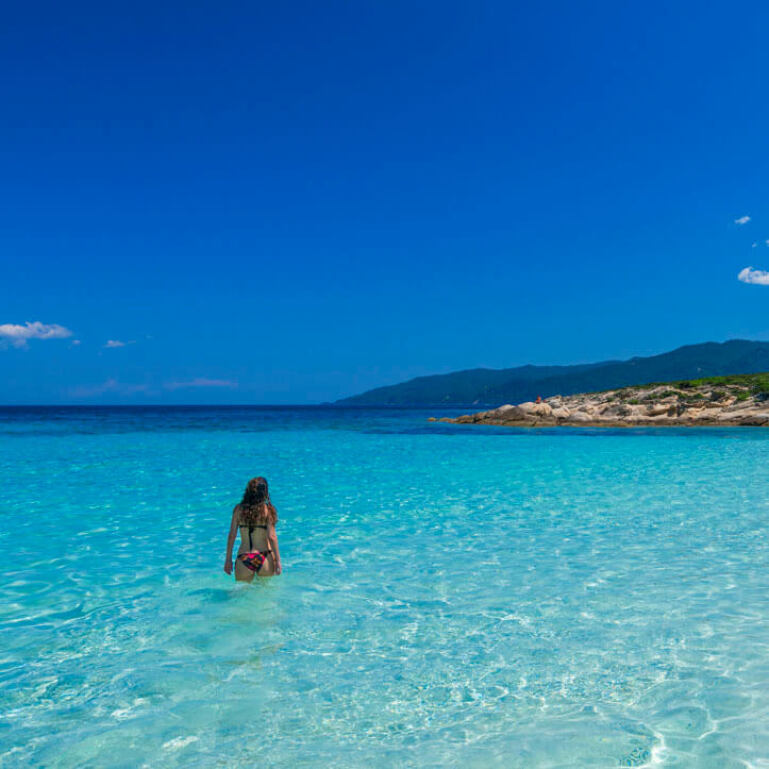
Kastellorizo
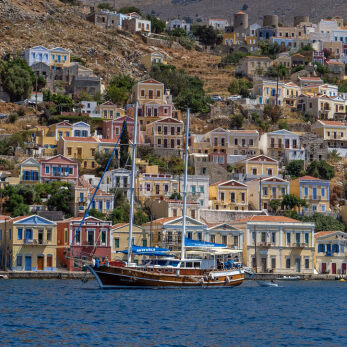
North Aegean
Explore. respect. preserve..
Discover Sustainable Greece

Experiences

Read our Blog

Spoon Sweet Bitter Orange (nerantzi)
The athenian odyssey: history, culture, and cuisine.
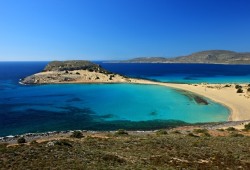
Elafonisos Eco Week 2024

Enter Thrilling Sailing Competitions in the Greek Seas
Did you know that Greece is the 4th largest cheese producer worldwide. Greeks eat 28 kg per capita per year. And guess what, mostly feta cheese!
Continuously inhabited for over 7,000 years, Athens is one of the oldest cities in Europe.
Greece is the place where democracy was born. But democracy in ancient Athens was significantly different from modern democracies. It was both more participatory and exclusive, and there were no political parties in Athenian democracy.
Did you know that Greece is the third largest producer of olive oil in the world? Greeks have cultivated olive trees since antiquity. Some of the olive trees that are still producing olives date back to the thirteenth century.
Greek is one of the oldest spoken languages in Europe since it has been spoken for more than 3.000 years.
The species and subspecies of the native plants in Greece are about 6,000, almost as much as 50% of the native plants of Europe!
Crete's history as well as the inhabitants' personality were affected by the island's mountainous landscape.
Did you know that in Greece you can enjoy skiing with a sea view?
Did you know that Greece hosts 50% of the brown bear population in western & southern Europe.
Olympus (2,917m), the mountain of Gods and Muses is the highest mountain of Greece and the 2nd in the Balkans.
Did you know that in Greece, 47 mountains are over 2000m., 105 mountains between 2000 and 1500m., 155 mountains are between 1500m. and 1000m. The number of mountains under 1000m. have yet not been recorded.
Greece is a leading producer of sea sponges.
Greece has one of the richest varieties of wildlife in Europe, including 116 species of mammals, 18 of amphibians, 59 of reptiles, 240 of birds, and 107 of fishes.
Feta, which is made from sheep and goat’s milk, is Greece’s national cheese. It dates back to the Homeric ages, and the average per-capita consumption of feta cheese in Greece is the highest in the world!
Τhe concept of democracy developed in Athens around the 6th century BC. The Greek word demokratia (δημοκρατία) meant “the power of the people”.
Greece' s official name is Hellenic Republic. However Greeks call their country Hellas or Hellada.
Did you know that Greece has the biggest EU consumption of olive oil per capita, with around 12 kg per person per year?
Greece has historically engaged in wine making. Take for example Dionysus, the son of Zeus, the God of the grape-harvest, winemaking and wine. His face is seen today on the sommelier’s pin which is a symbol of respect to wine’s contribution throughout history.
Did you know that Greece is the third largest producer of olive oil in the world? Greeks have cultivated olive trees since antiquity. Some of the olive trees that are still producing olives, date back to the thirteenth century.
Greece has more archaeological museums than any other country in the world; in-fact they are around 196!
- Exhibitions
Peloponnese
Thessaloniki.

Myths and Symbols in Modern Greek Art

"Χαίρε Ξένε. In the land of dreams"

EuroPride 2024 Thessaloniki

Epidaurus Festival 2024
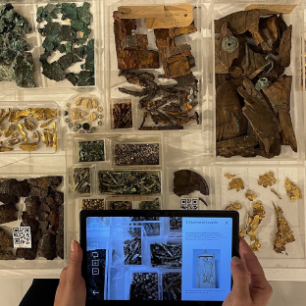
60 years | 60 moments
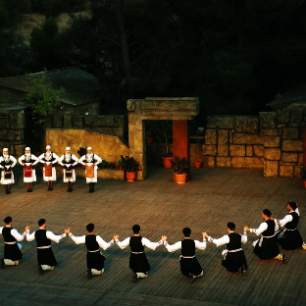
Dance Performances

The Parthenon and Byron

Release Athens Festival

Wines at Fortezza

Kimolos International Film Festival
Explore greece.
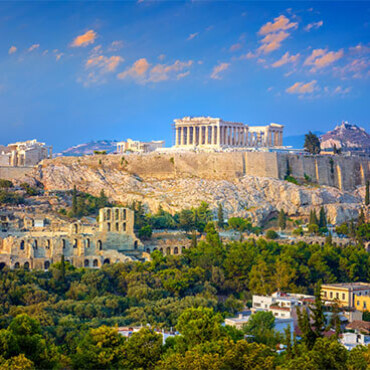
Places to Visit
Elefsina .
A journey through time
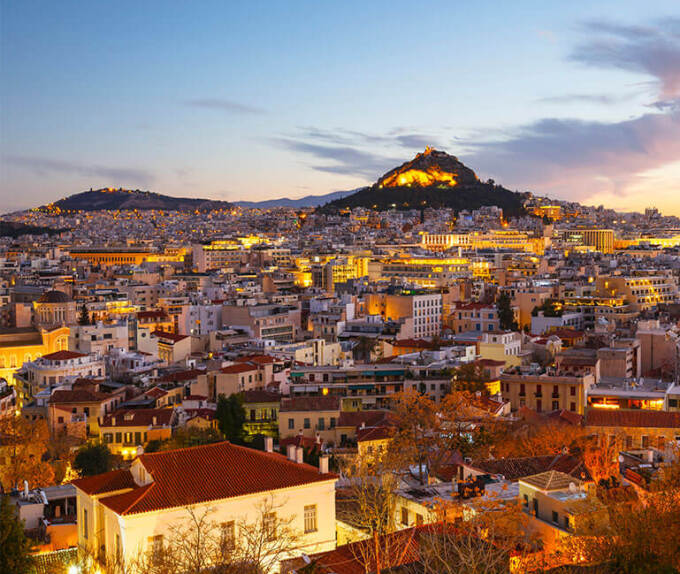
Central Greece
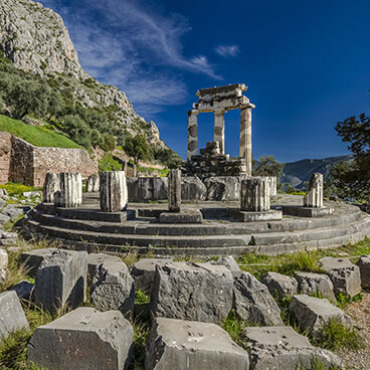
Messolonghi
The Seafaring Town
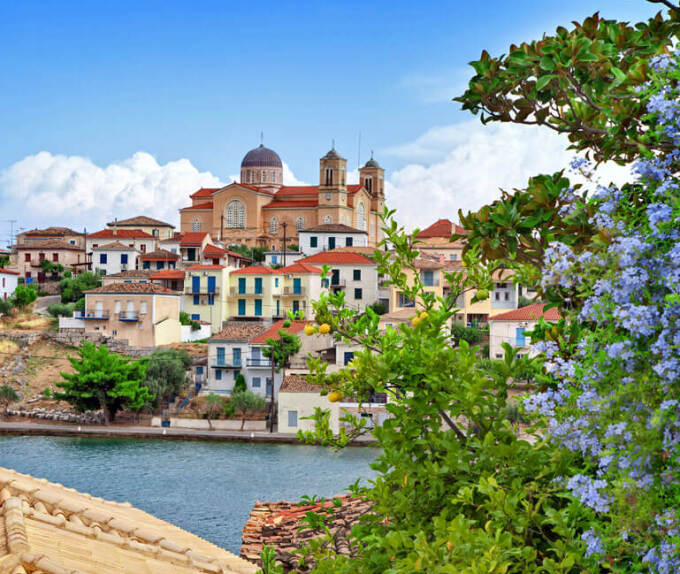
Travel to the Navel of the Earth
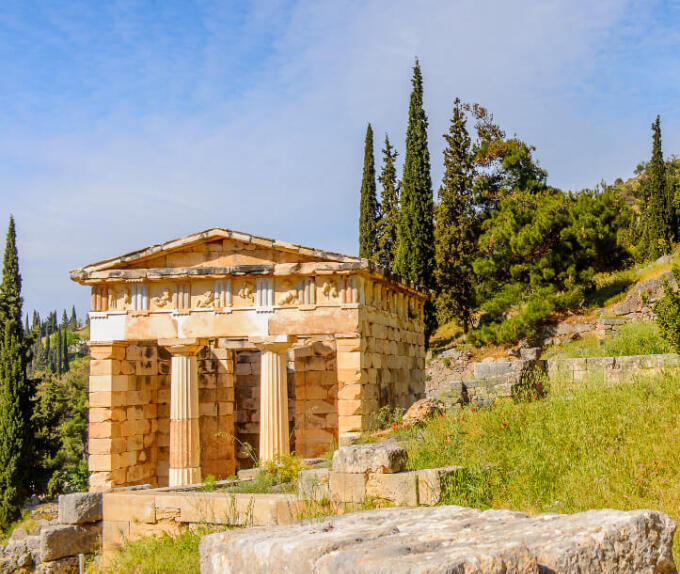
A journey in a magical land
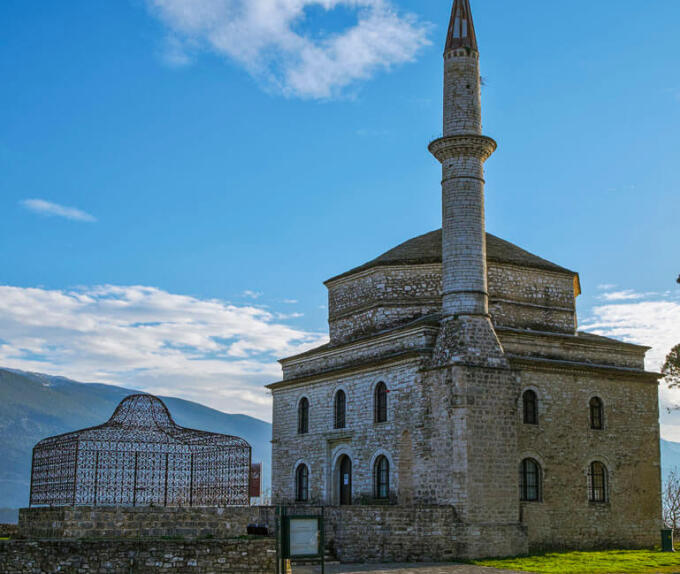
The jewel of Epirus
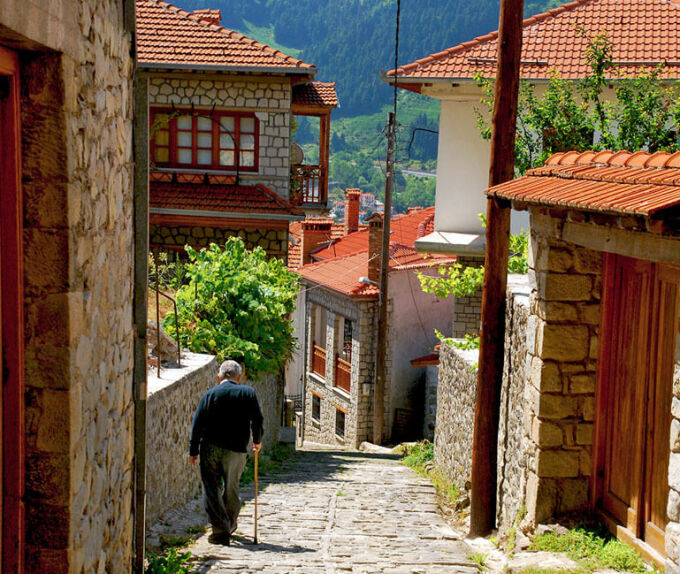
The Riviera of the Epirus Region
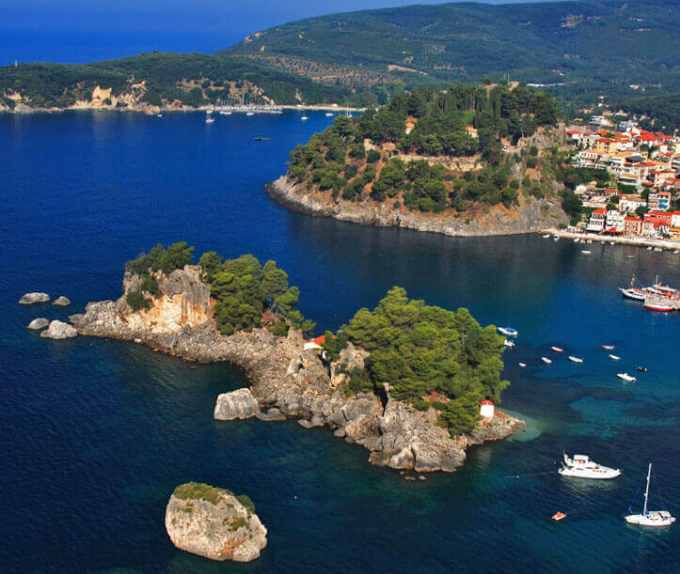
The Ionian fjord!
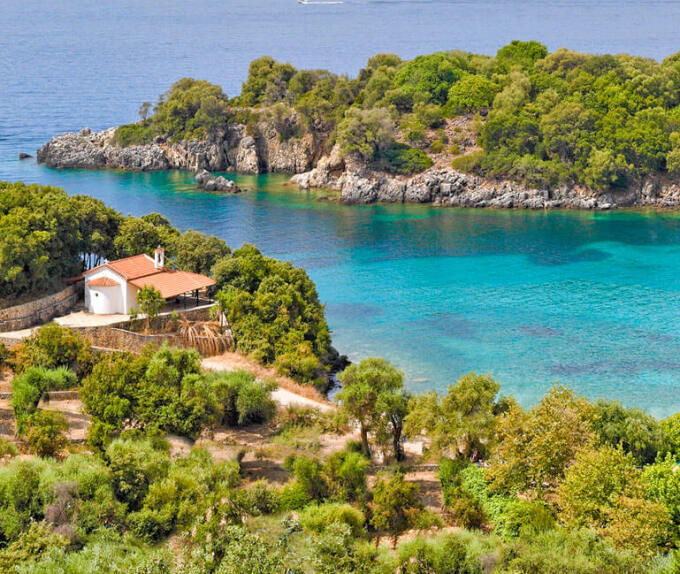
City of Experiences
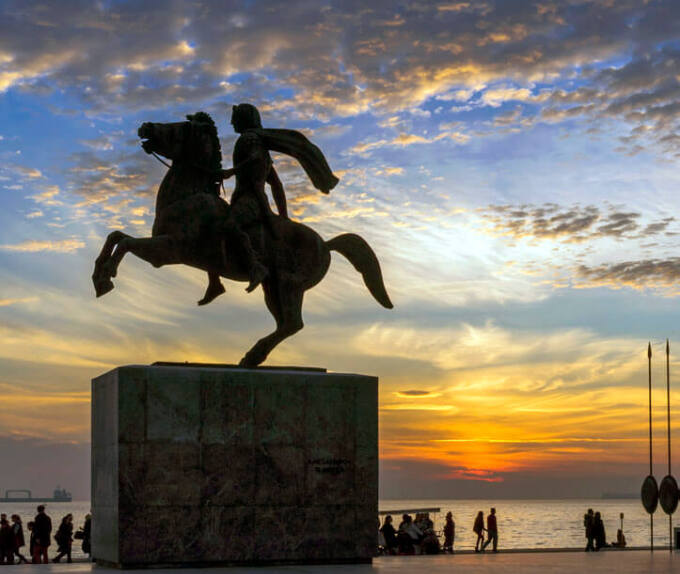
A breathtaking combination of blue and green

A trip to the birthplace of the Olympic Games
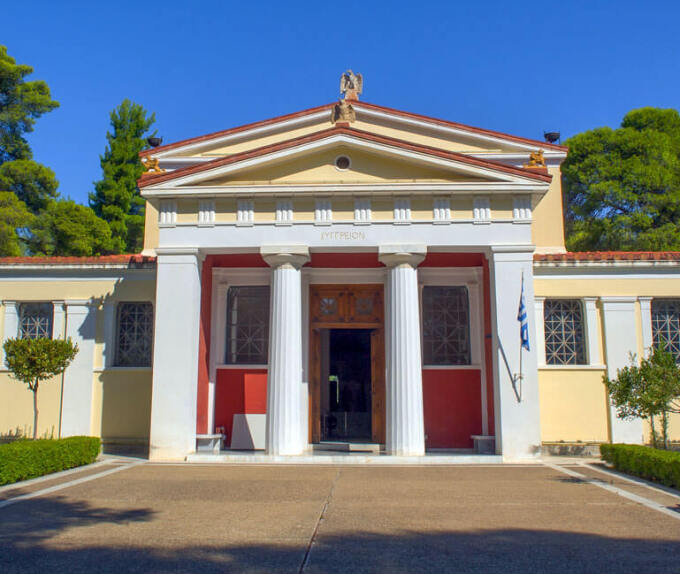
A fascinating wine tourism destination
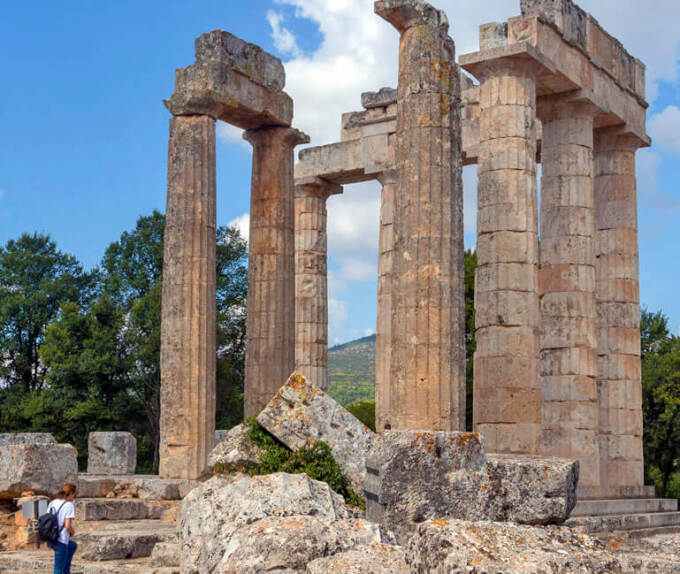
Beauty, Myth and History are all here
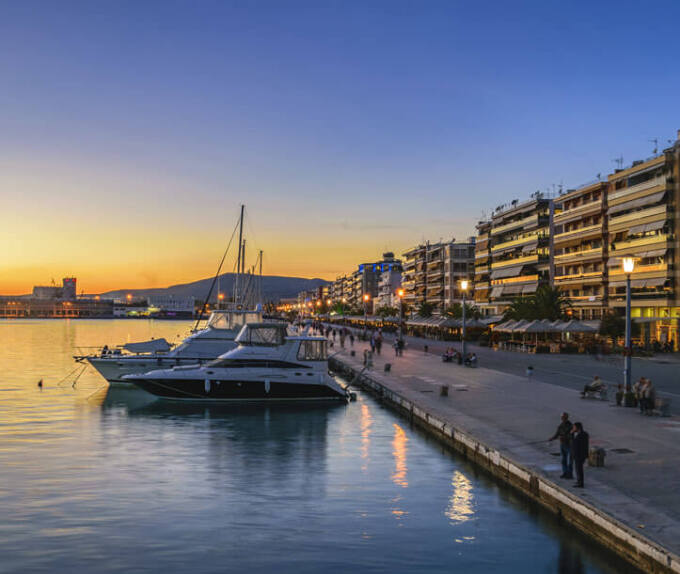
Alexandroupoli
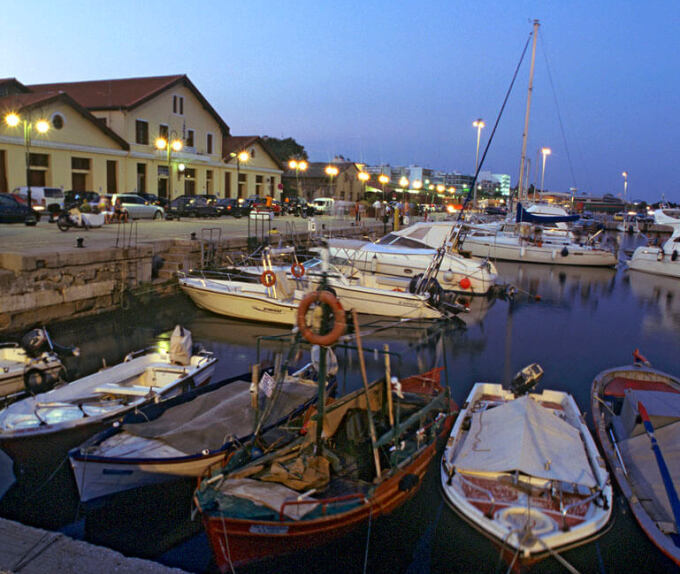
The noble Lady of Thrace
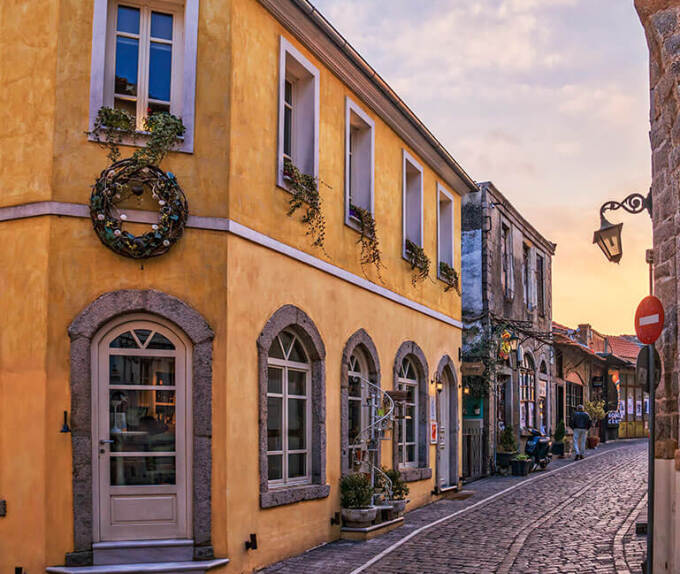
Argosaronic
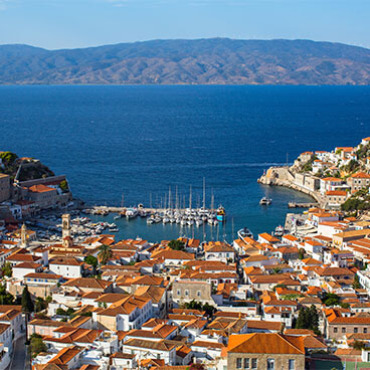
Kea (or Tzia)
Travel to the heart of the Cyclades
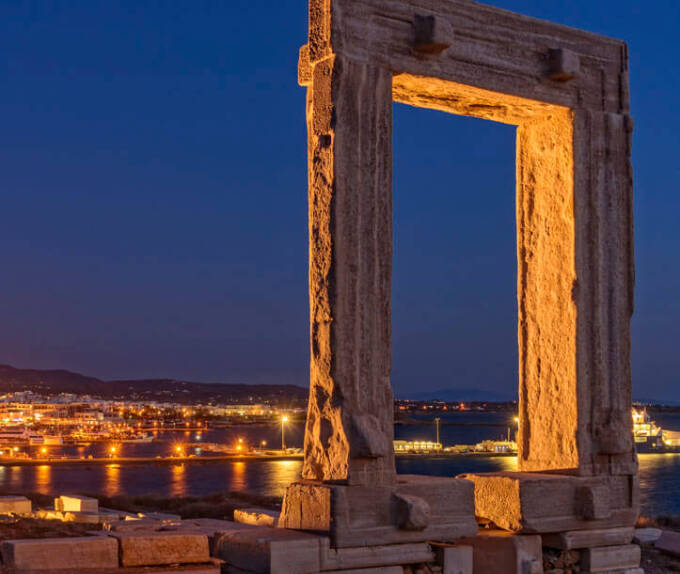
Where cosmopolitan meets traditional
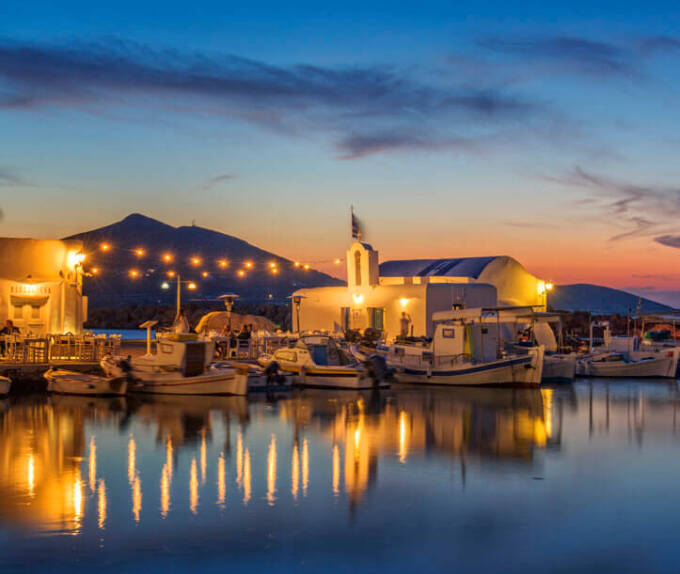
A rising destination in the Cyclades
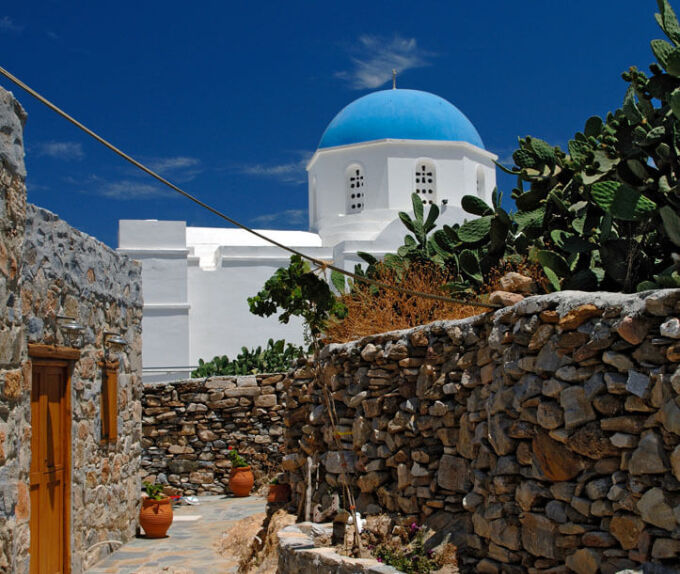
The Big Blue
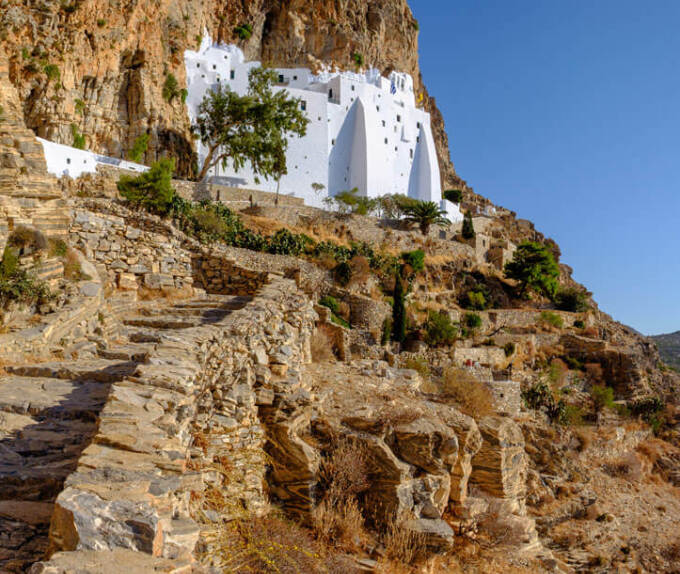
The "handmade" island
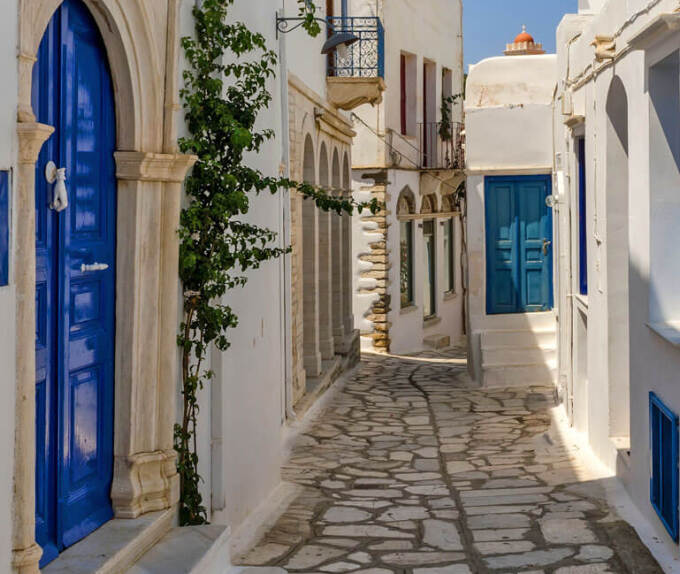
The island with heavenly beaches
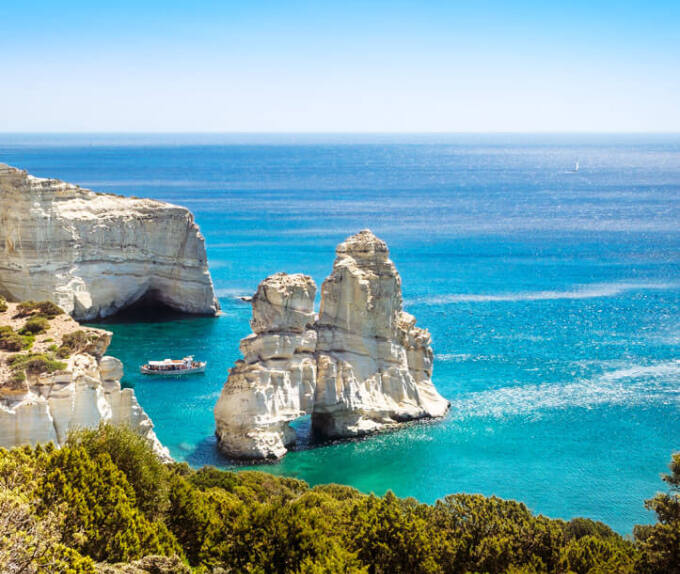
Welcome to the Cyclades
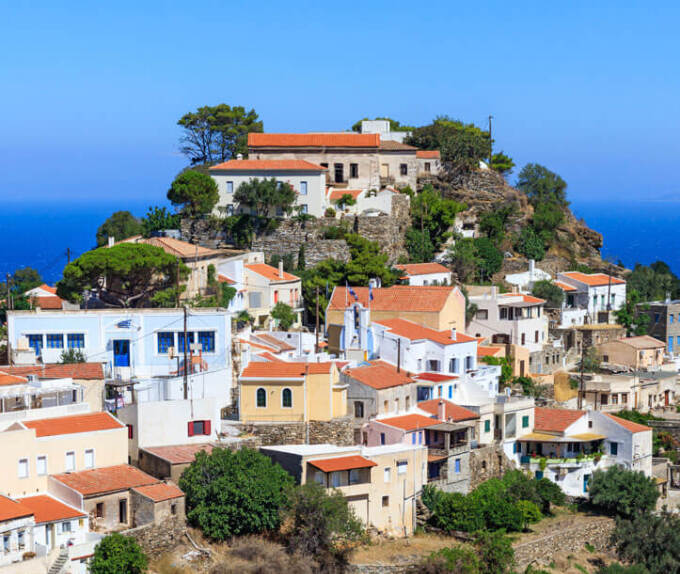
The Exciting Island
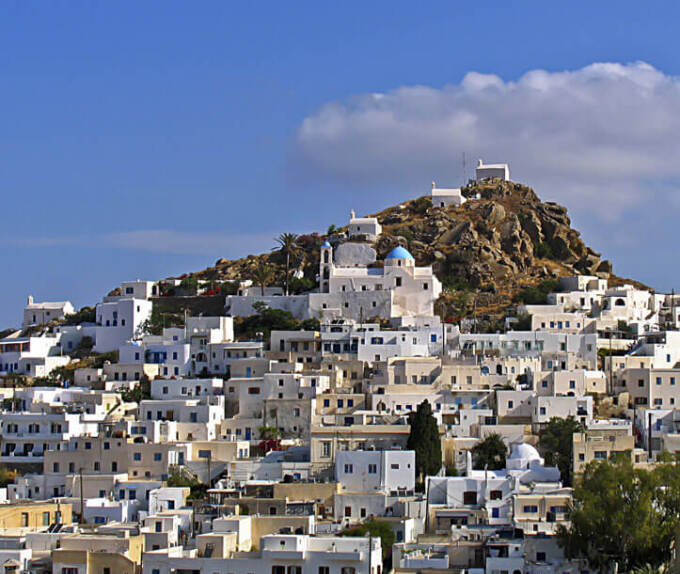
Simply irresistible
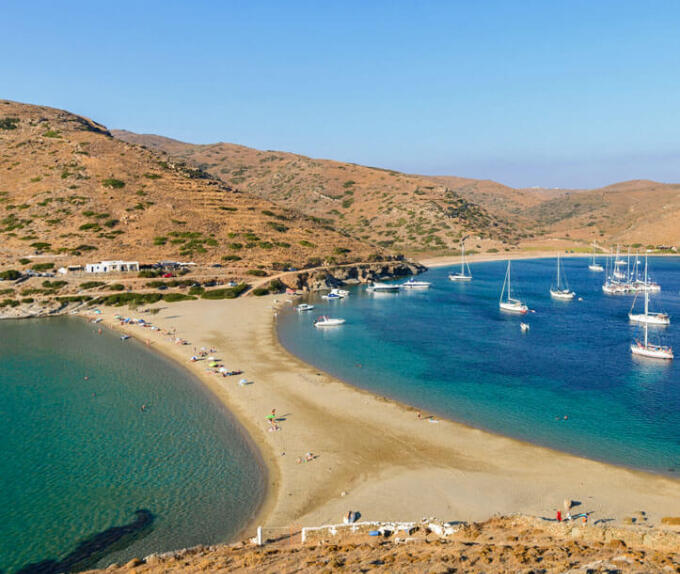
An island of raw beauty
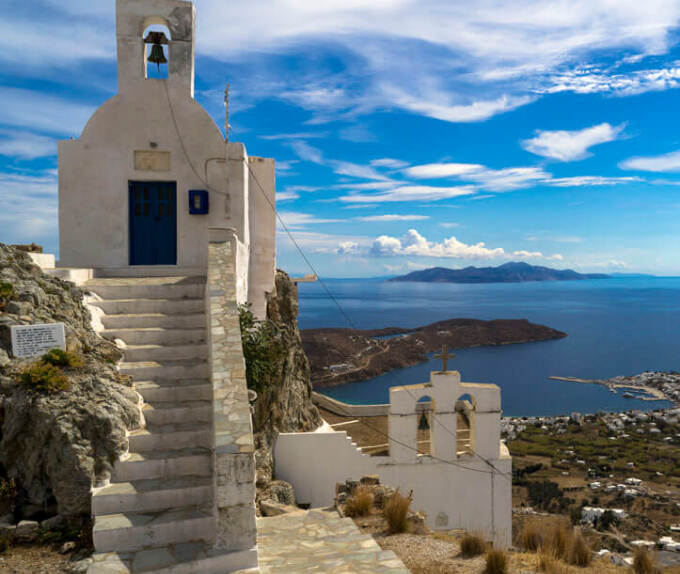
A balanced and harmonic cycladic island
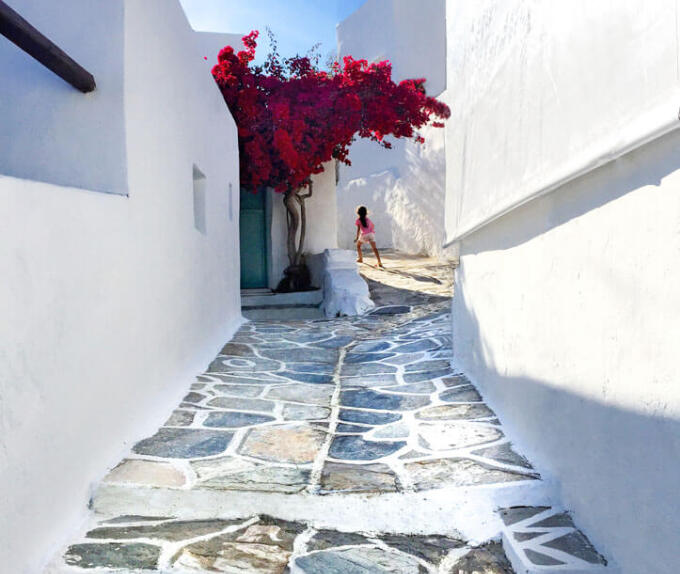
Anti-conformist & carefree
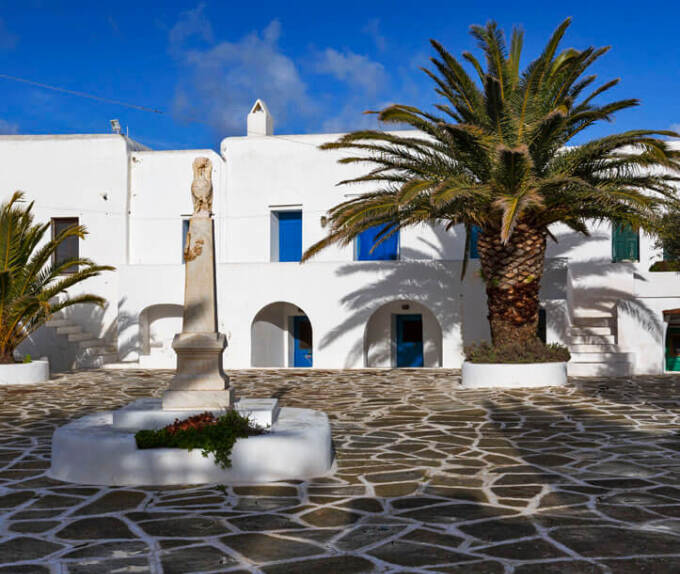
The Chalk Island
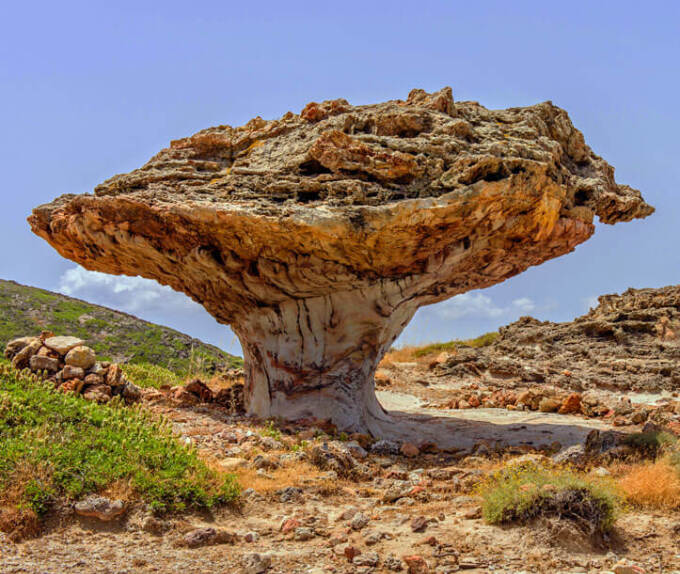
Folegandros
Bathed in the sunlight of the Aegean Sea
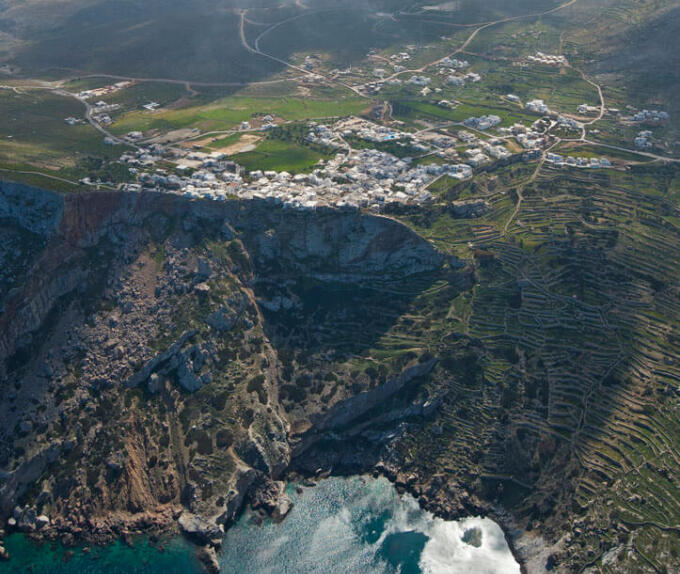
A piece of heaven in the Lesser Cyclades
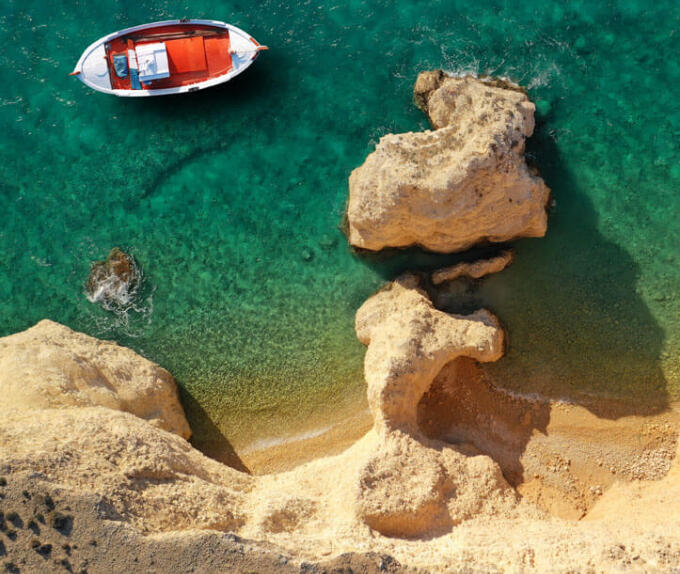
The head priest of the Cyclades
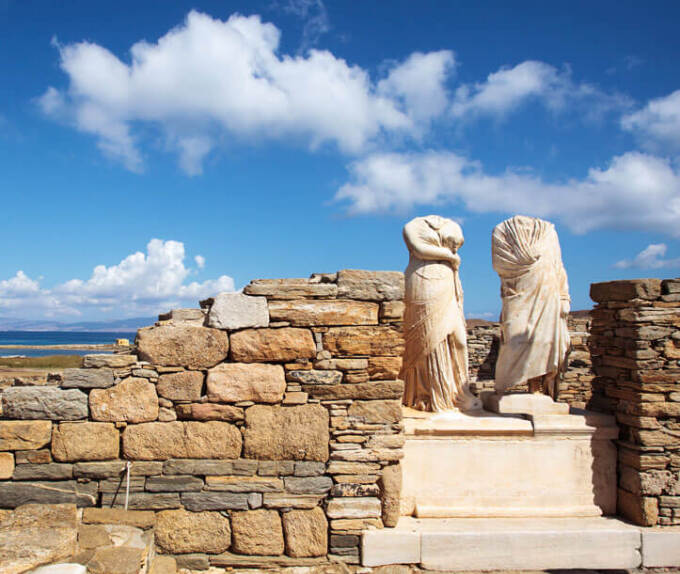
Agios Nikolaos
The cradle of the Minoan civilisation
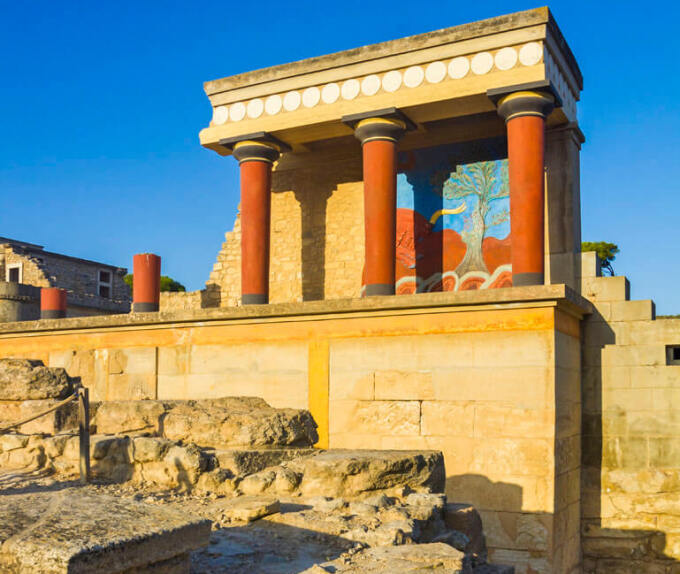
A Butterfly-Shaped Island
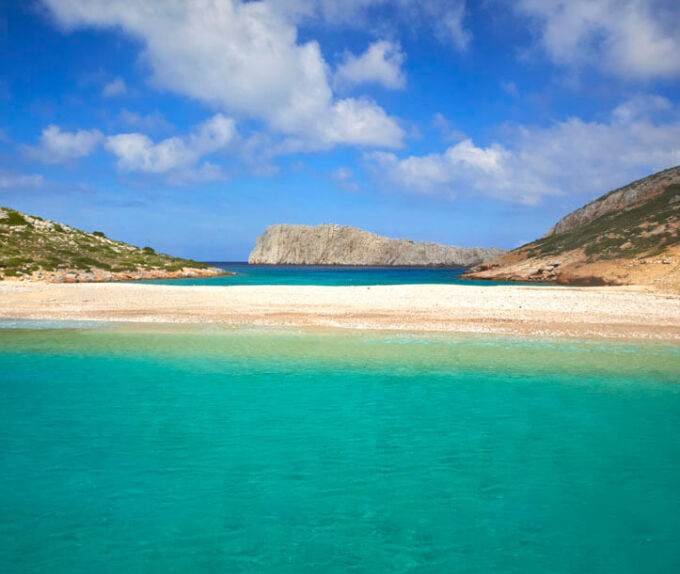
The Sponge Harvesting and Rock Climbing Island
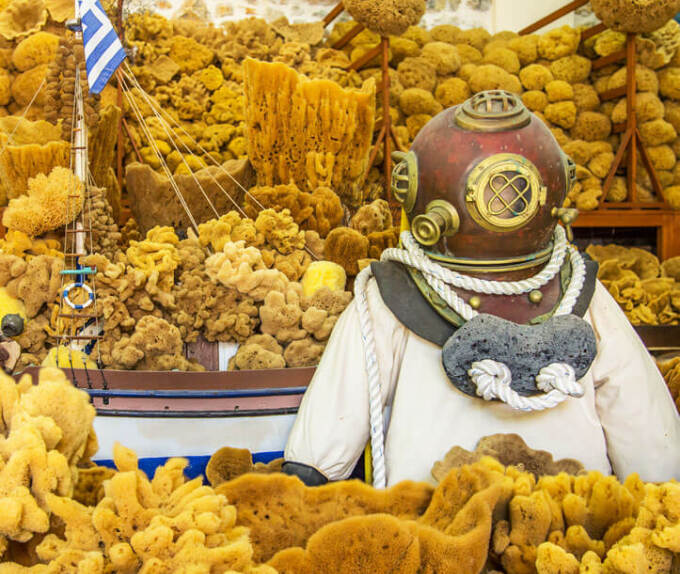
The wild beauty of the Dodecanese
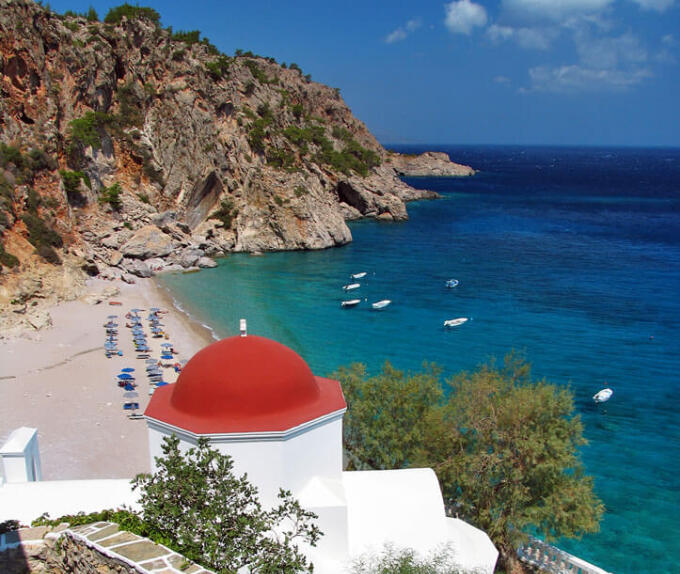
Wild and Beautiful
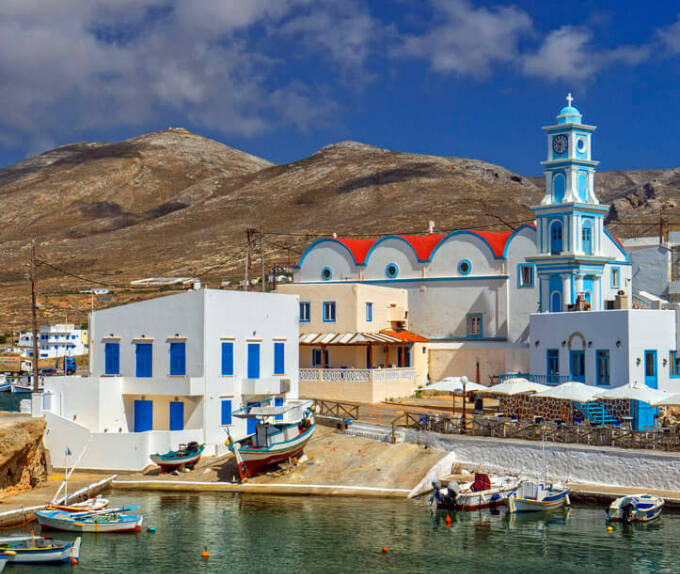
A Remote Treasure Island

Hippocrates’ Island
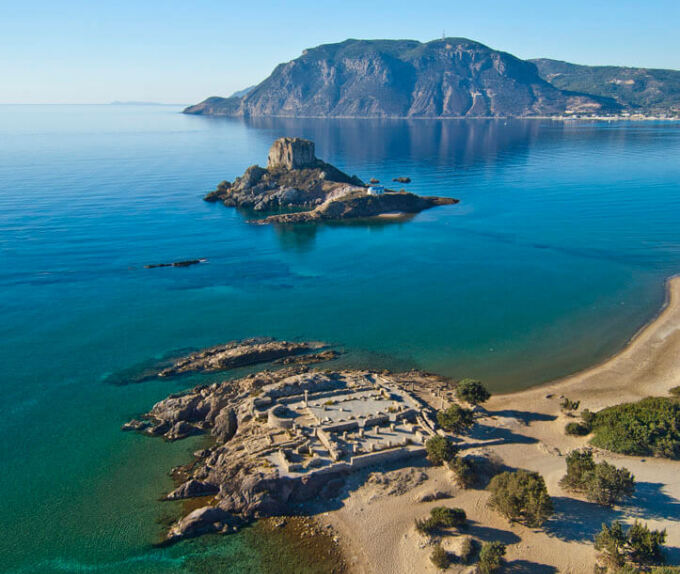
Calypso’s Island
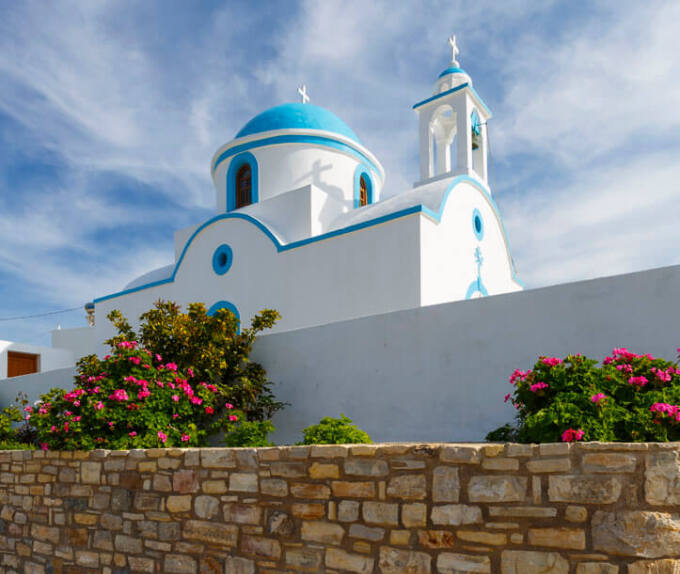
A lesser known gem in the Dodecanese

Island with a Unique Volcanic Terrain
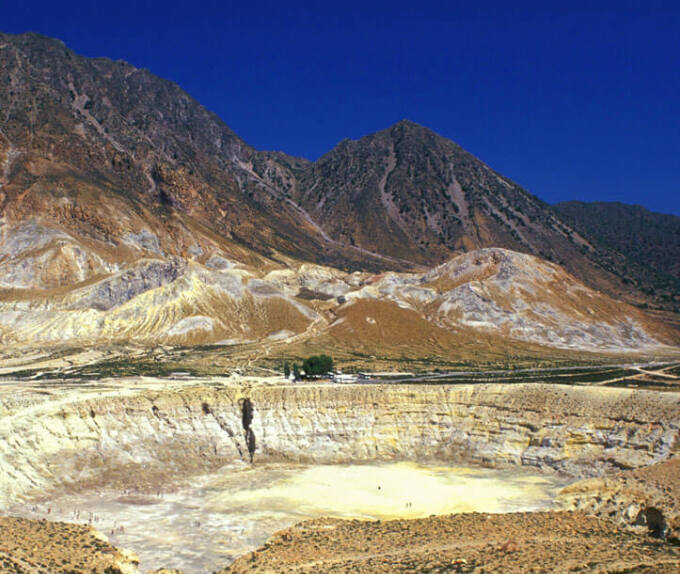
Religious legacy meets beauty of Nature
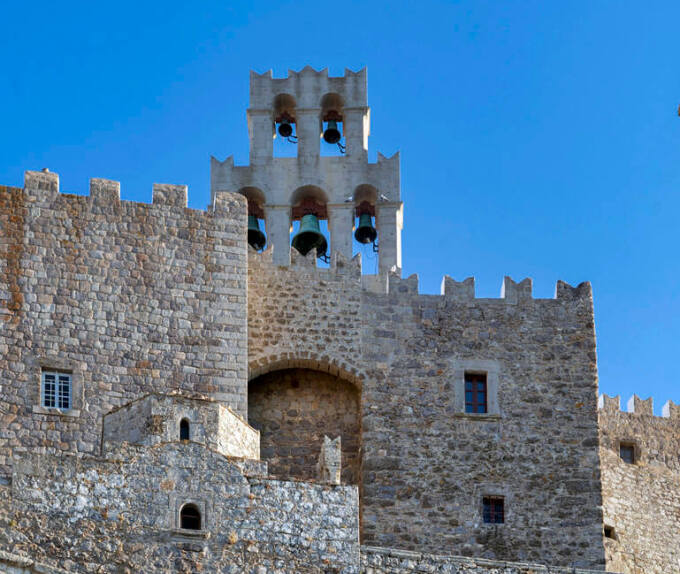
The island of vivid contrasts
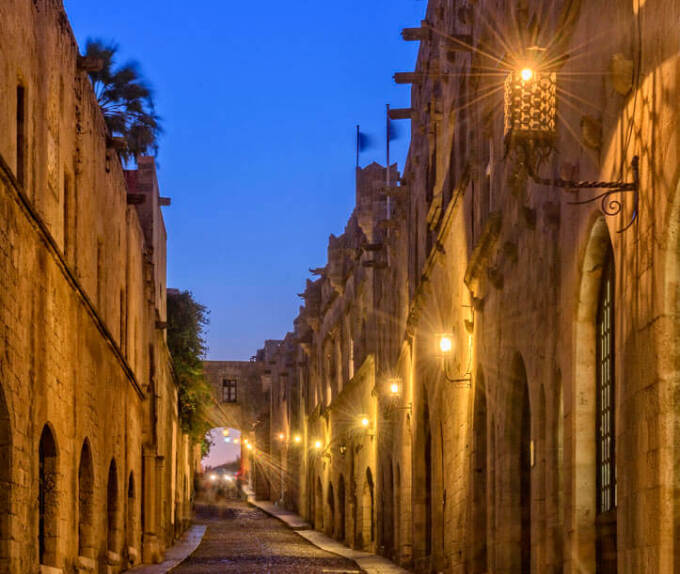
A Fairytale-like Island

The perfect choice for a laid-back holiday
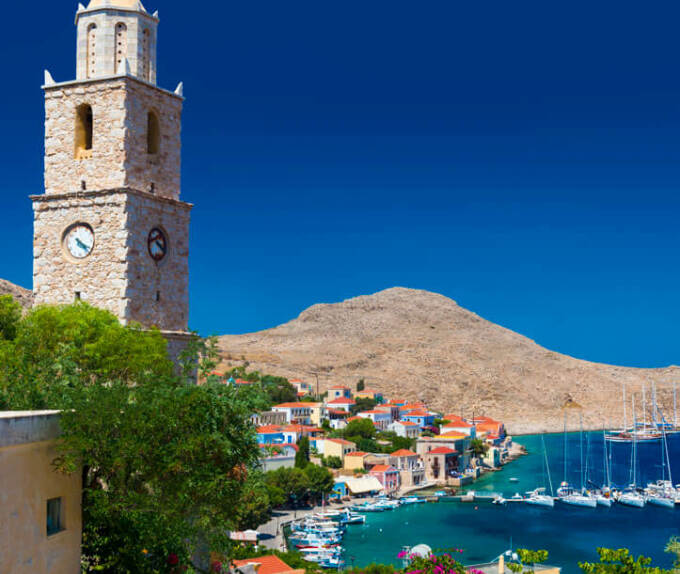
Odysseus’s home
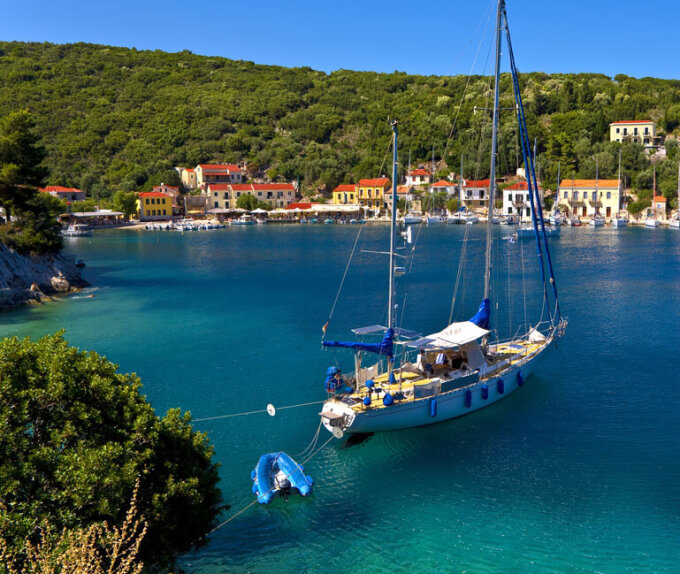
Chic and delicate by nature
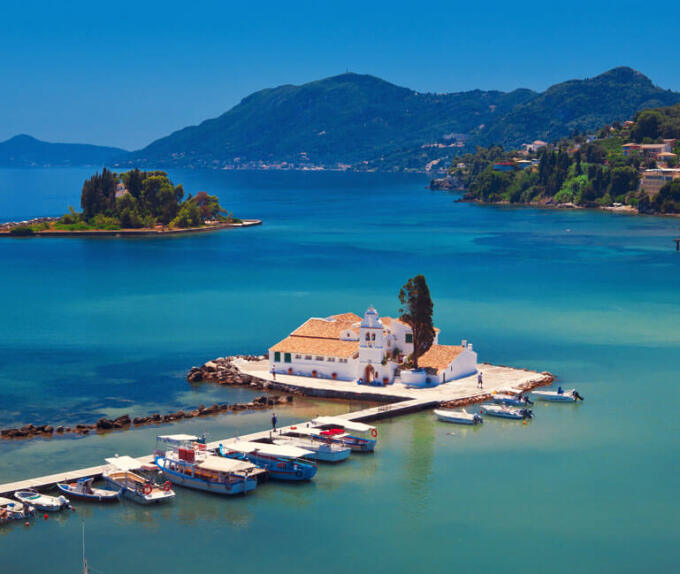
Agios Efstratios
The island of the Great Gods
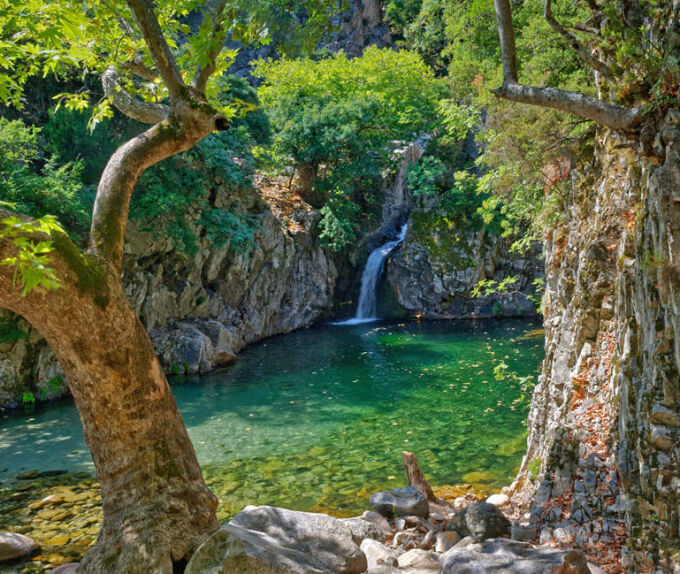
A Tapestry of Natural Wonders and Cultural Riches
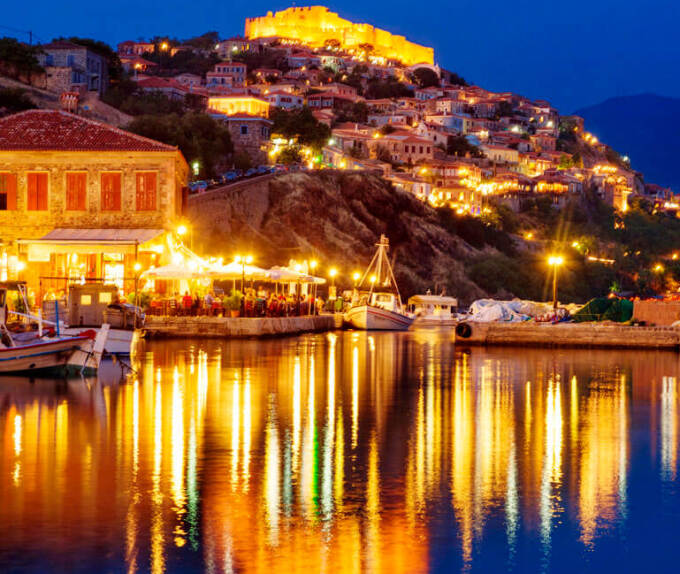
An island of sheer beauty
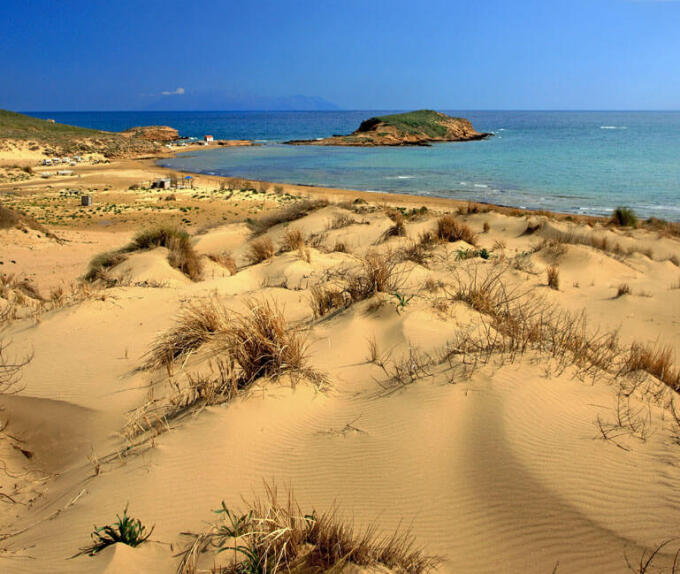
The island of Hera and Pythagoras
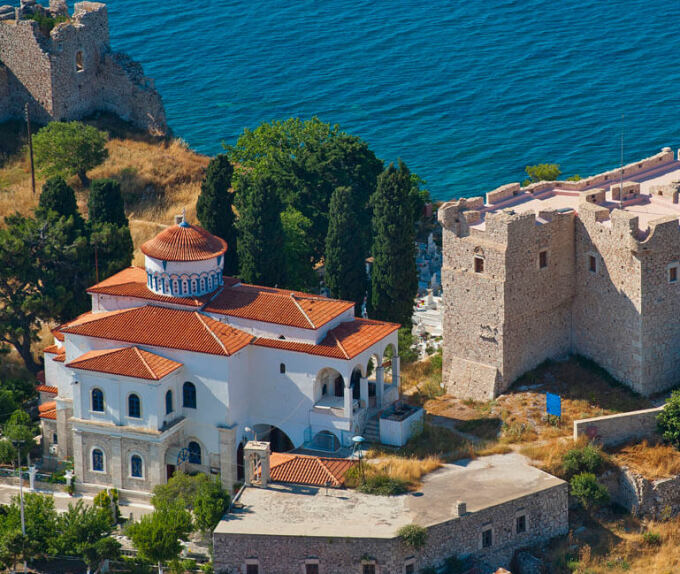
The island of glorious past & pristine beauty
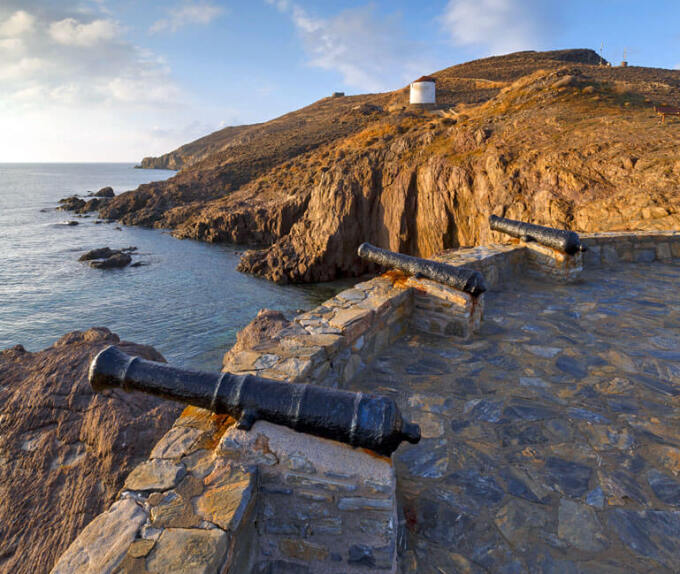
An archipelago away from the crowds
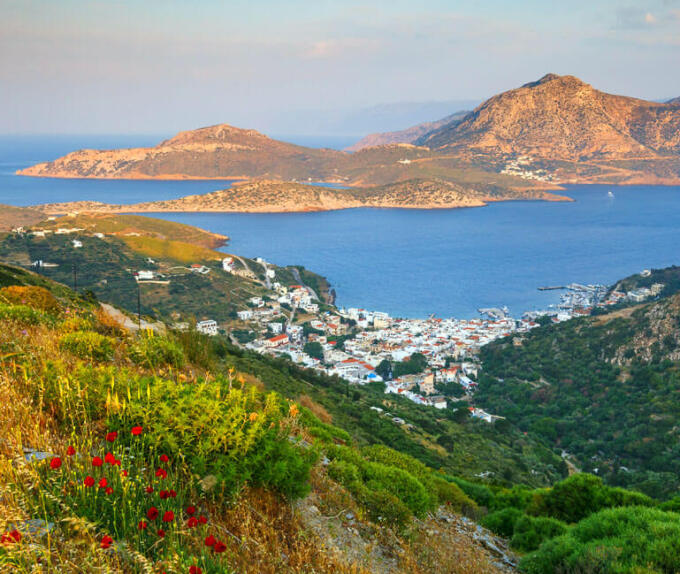
Τhe remote islands of ship owners
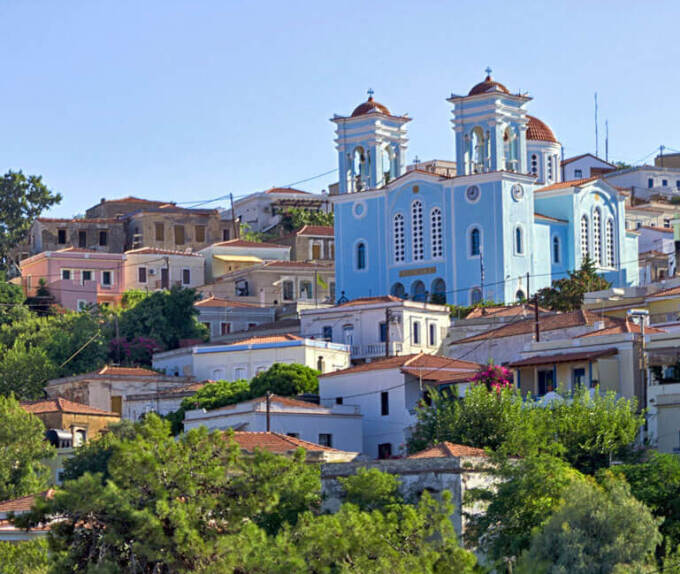
A Mise-en-Scène Island
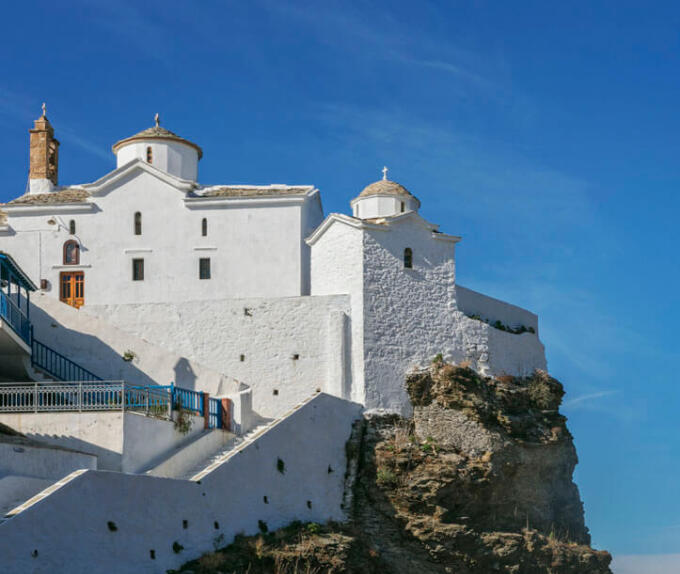
Enjoy nature in all its splendour!
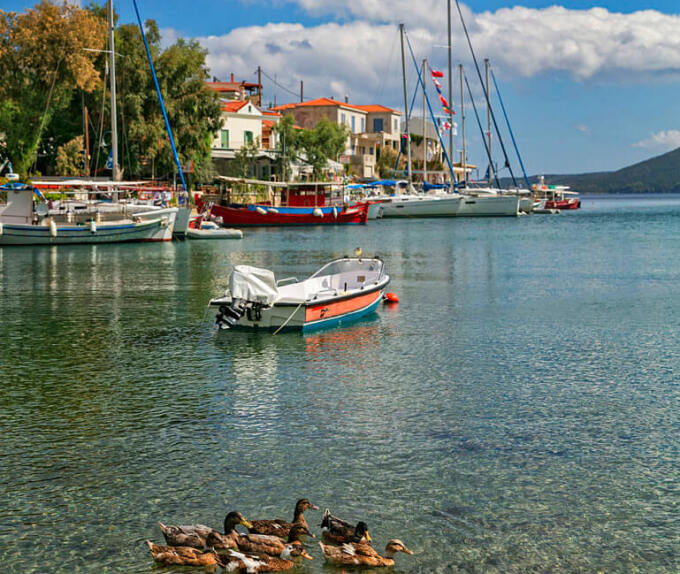
#VisitGreece
Share your moments in Greece

Tourists are missing on Greek islands in the heat. Here’s how to stay safe.
Former sheriff’s deputy Albert Calibet is missing on Amorgos island, and a Dutch tourist is missing in Samos, days after TV doctor Michael Mosley died on Symi.

A former L.A. sheriff’s deputy has gone missing while hiking on a remote Greek island, sparking a major search, as authorities express concern that tourists could be unprepared for the high temperatures sweeping the country.
Albert Calibet, 59, is the third tourist to go missing in recent days. Rescuers are also searching separately for a missing Dutch tourist, while British television doctor Michael Mosley was found dead on the island of Symi, several days after he was reported missing amid extreme heat.
Here are some tips for staying safe in the heat, particularly if you are hiking alone.
How did Albert Calibet and the other tourists go missing?
Calibet went missing on the island of Amorgos on Tuesday, according to the municipality . He is a seasoned hiker and left on what should have been a four-hour hike to meet a friend, his brother Oliver told Fox 11 on Thursday — but he never arrived.
The deputy mayor of the island told a Greek news website that Calibet had walked the trail before and said that the heat may have played a role in his disappearance.
On Sunday, a 74-year-old Dutch tourist went missing after going hiking alone on the island of Samos, Reuters news agency reports ; his wife reported him missing that afternoon.
The same day, the body of British doctor and TV host Mosley, 67, was discovered four days after he went missing while walking alone on the island of Symi. The path he was walking was littered with rocks and no shelter as the heat rose to 37 degrees Celsius (98.6 degrees Fahrenheit), according to the Associated Press .
His wife said in a statement that Mosley “did an incredible climb, took the wrong route and collapsed where he couldn’t be easily seen by the extensive search team.”
How hot can the Greek islands get?
Greek islands are usually several degrees cooler than the mainland, according to Nikolaos Pappas, a professor of tourism development and crisis management at the University of Sunderland in England.
But temperatures can still get very high — Amorgos saw temperatures of over 94 degrees Fahrenheit on Tuesday, the day Calibet went missing.
On Tuesday, the country’s meteorological service warned of high temperatures across the country until Friday.
Temperatures rose to above 104 degrees Fahrenheit in much of central and southern Greece on Thursday, prompting authorities to close archaeological sites in Athens and prompting warnings of wildfires, the Associated Press reported .
Last year, Greece and southeast Europe experienced one of the worst heat waves on record.
How can you stay safe in the heat?
The human body is “actually quite well equipped to deal with heat in general,” but in extreme heat, the body sweats more, which can dehydrate the body, George Havenith, a professor of environmental physiology and ergonomics at England’s Loughborough University, said in a phone interview Friday.
Advice for dealing with high temperatures includes staying hydrated, wearing light clothing and sunscreen, and avoiding exercise or even going outside in the peak hours — in Greece, that would be between 11 a.m. and 4 p.m., according to Havenith. If you don’t have access to air conditioning, consider using a fan and perhaps wetting your T-shirt to provide extra cooling.
“Alcohol is better left alone,” he said — not just because of its impact on the body and the possibility of becoming dehydrated more easily, but also “because the decisions you’re going to make might not be the best decisions.”
It’s also important to remember that it can take the body time to acclimatize to a new environment: If you’re in a warmer temperature for even an hour and a half per day over the course of two weeks, the body’s sweat rate and production tend to get higher, according to Havenith, but inactivity affects the rate at which this happens.
There are also some groups who should be more careful in extreme heat, including anyone taking medication: Blood pressure medication, for example, affects the kidneys and can make you more vulnerable to the effects of high temperatures.
Older people may be particularly vulnerable as they often have preexisting conditions and take medications that can make them more vulnerable, he said. “There’s very few people above 70 that take no medication. And that medication can affect your temperature regulation,” Havenith said.
Children and pregnant individuals may also need to take more care.
What should you do if you get heat stroke?
If you or someone you’re traveling with begins to fall ill in the heat, the first stage is heat exhaustion.
“You have a very high heart rate, you’re sweating like crazy,” Havenith said. “And that usually is covered very well by getting people out of the sun and putting them in a cold area, spraying them with water, sprinkling them, a cool bath, a cool shower, to bring the temperature down” — although you need to be more careful if the person has a heart condition, for example.
The next, and more dangerous, stage is heat stroke .
“Cognitively they start to respond less or they can’t walk straight, they can’t tell you who they are, where they are, etc. So once you see those symptoms, it’s really very serious and you need to respond very quickly.”
He says to cool the person with water or put them under a shower and loosen any clothing before calling an ambulance: “The quicker you can get the temperature down, the more chances of survival people have.”
What other safety measures should you consider?
Pappas, the University of Sunderland professor, says tourists should prepare for the reality of the destinations they’re traveling and not make assumptions.
If you’re not used to the local conditions “because you live somewhere else, you need to ask the locals, you need to ask the experts — your travel agent, maybe, [or] if you do not have a travel agent, the reception of the hotel you live — on whether it is a good idea to do something or not.”
A hike or walk that may be manageable in your hometown may be much more difficult on a normal summer day in Greece, he warned — and all the more so during a heat wave.
He notes that in Greece and some other Mediterranean destinations, authorities may close attractions during the warmest part of the day to help protect tourists, as happened in Athens this week.
For hikers, he advises following designated trails and traveling with others so they can help raise the alarm if something goes wrong. He warns against undertaking activities you wouldn’t do at home, such as hiking in extreme temperatures.
As The Washington Post has previously reported , there are other things you can do to keep safe if you are hiking alone: Check the forecast often and heed any weather warnings, carry essentials and let others know your route and when you expect to return.
More on extreme heat
Use our tracker to see your city’s extreme heat risk .
How to stay safe: It’s better to prepare for extreme heat before you’re in it. Here’s our guide to bracing for a heat wave , tips for staying cool even if you don’t have air conditioning , and what to know about animal safety during extreme heat . Traveling during a heat wave isn’t ideal, but here’s what to do if you are .
Understanding the science: Sprawling zones of high pressure called heat domes fuel heat waves. Here’s how they work . You can also read more about the link between weather disasters and climate change , and take a look at what extreme heat does to the human body .

Best eSIM for Greece Travel in 2024
Traveling to Greece can be an incredible experience, with ancient historical sites, beautiful islands, and delicious food. However, staying connected while visiting can be challenging and expensive if you rely solely on roaming data.
Using an eSIM is an excellent solution for getting affordable and reliable connectivity during your time in Greece. eSIMs provide the same functionality as regular SIM cards but without the need to physically switch cards in your device. They are embedded directly into your phone or tablet instead.
In this comprehensive guide, we will cover everything you need to know to choose the best eSIM for travel in Greece in 2024, including detailed reviews of the top providers, key factors to consider, and tips for saving money.
What is an eSIM and How Does it Work?
An eSIM, short for “embedded SIM,” functions much like a regular nano-SIM card that mobile networks provide. The key difference is that instead of being a small removable chip, eSIMs are directly soldered or embedded into a device.
To connect to a cellular network with an eSIM, you simply purchase a cellular data plan from a provider, and they will send you the account info and activation code. By scanning a QR code or entering details manually, the eSIM gets programmed and activates a connection to the network.
So unlike swapping physical SIM cards, adding or removing plans is performed completely digitally on the software side. Most modern phones and tablets contain an eSIM slot alongside the regular SIM card slot, providing dual SIM functionality.
Advantages of Using eSIM for Greece
There are several excellent reasons to use an eSIM for travel in Greece rather than roaming on your home data plan or finding a local Greek SIM.
Avoid Roaming Fees
If you attempt to use mobile data through your standard cellular plan, you’ll likely face astronomical roaming charges from your carrier. eSIM data packages help you bypass international roaming completely.
No Need to Find a Local SIM Card
Purchasing a Greek SIM card can be inconvenient and limit connectivity when first arriving in the country. eSIMs provide instant access to cheap data as soon as you land.
Easy to Manage Plans
With programmable eSIMs, you can digitally switch data plans as needed or top-up existing ones without physically inserting new SIMs. Much more convenient while traveling between multiple destinations.
Use Dual SIM Capabilities
Having an eSIM means you can also physically insert a local SIM for calling/texting while using the eSIM primarily for cheaper data. This dual SIM setup provides the best of both worlds.
Factors for Comparing eSIM Providers
When reviewing and comparing eSIM providers available for Greece, there are several essential factors to evaluate so you select the best option for your travel needs and budget.
Network Coverage Quality
You want an eSIM service that offers high-speed 4G LTE data coverage through major networks like Cosmote or Vodafone GR to ensure reliable connectivity across Greece.
Data Amount Allowances
whether you just need occasional maps/messages access or will be streaming video everyday, make sure to choose a data amount in GB appropriate for your expected usage.
Duration & Expiration
Some eSIM data packages last 7 days while others are valid for a month or longer. Pick a duration that aligns with your trip length.
Pricing per GB
To maximize value, compare pricing across providers to find the cheapest cost per GB at your required data amount. Watch for deals too.
Customer Service
Having responsive support is crucial when traveling internationally. Prioritize eSIM companies with 24/7 customer service.
Top 7 Providers for eSIM Greece Recommendations
Based on the above criteria and hands-on testing, these are my top eSIM recommendations for travel in Greece for 2024:
Airalo is my #1 overall pick for eSIM data in Greece due to their combination of low pricing, extensive network coverage, and reliable performance.
They offer prepaid eSIMs starting at just 1 GB for $5, with packages going up to 20 GB for $49. Their Greece eSIM specifically uses the Cosmote GR and Vodafone GR networks to ensure solid connectivity.
I’ve found their eSIM activation process quick and convenient whether ordering pre-trip or after arriving at a Greek airport. Ongoing account management and adding more data is straightforwarad too via their app.
So for an easy, affordable eSIM option with data amounts to suit any traveler’s needs, Airalo is hard to beat.
Key Details
- Network Provider: Cosmote GR & Vodafone GR
- Minimum Duration: Weekly
- Data Amount Range: 1 – 20 GB
- Pricing: ~$5 per GB
2. Dent eSIM
For totally unlimited high-speed data in Greece through Vodafone’s network, Dent eSIM is a top choice.
Their wireless plans come with endless full-speed data usage within Greece. Actual speeds depend on specific location, but should reliably be 4G LTE in most areas.
Unlimited data with Dent only costs $35 for Greece, providing tremendous value if you plan on using lots of mobile bandwidth for steaming, video calls, etc.
While their website checkout process and account management could be a bit smoother, once set up performance is great. Support team knowledge is hit or miss so be prepared to self-serve troubleshooting.
Overall though, I recommend Dent to any heavy data users visiting Greece looking for an unlimited eSIM option.
- Network Provider: Vodafone GR
- Data Amount: Unlimited
- Pricing: $35 per week
Holafly is an international eSIM provider focused specifically on travelers. They offer unlimited data packages perfect for stays in Greece.
You can choose durations from 15 to 90 days unlimited data for $47 to $99. They provide broad coverage through both Cosmote and Vodafone GR networks plus over 170 other worldwide carrier partners.
If you plan to visit multiple European countries on your trip, Holafly also sells affordable region-wide Europe unlimited data eSIMs.
While not the cheapest service, they do focus on reliable connectivity for global jet setters. Performance is consistent and ordering/activation straightforward. Their app for ongoing account access could use polish but gets the job done.
For unlimited data at a reasonable price point, do check them out.
- Minimum Duration: 15 Days
- Pricing: $47+ per month
4. KnowRoaming
For extensive global coverage, KnowRoaming partners with networks in over 200 countries. This worldwide access makes them ideal if Greece is just one destination in a longer international journey.
Their Greece eSIM specifically provides usage on both Cosmote and Vodafone GR for solid performance. With packages from 1GB for $15 up to unlimited data for $149 monthly, they offer flexible options.
I’d mainly recommend KnowRoaming for convenience if you need connectivity across multiple regions or continents. Sticking with a single provider makes travel simpler versus swapping eSIMs each leg.
Downsides are above average pricing and account management is less user-friendly than other choices. Yet for seamless worldwide usage KnowRoaming has definite advantages.
- Data Amount Range: 1GB – Unlimited
- Pricing: $15+ per GB
5. Always Online Wireless
Always Online is a popular choice for Greece eSIMs thanks to their affordable prices and reliable performance.
They offer data amounts from 1GB to huge 100GB packages intended for extensive video streaming or remote working needs. You select the GB amount fitting your expected usage for durations from 7 to 60 days.
By partnering with all major Greek networks like Vodafone, Wind, and Cosmote you are assured solid 4G LTE and 5G data coverage while visiting any region.
Keep in mind that Always Online lacks certain convenience aspects like digital plan extensions or account support. Yet for basic data needs on a budget they excel.
- Network Provider: Cosmote GR, Vodafone GR, Wind GR
- Minimum Duration: 7 Days
- Data Amount Range: 1 – 100GB
- Pricing: $1+ per GB
6. Truphone eSIM
Truphone takes a unique approach to eSIMs by offering a single plan for $9 per day. This provides unlimited talk, text, and full-speed data throughout Greece and 70 other countries.
So if you need both calling and buckets of data, their simplicity and international access are great assets. Performance is also reliable by leveraging top-tier networks like Cosmote GR locally.
Downsides are the daily plan structure only suits shorter trips, and any technical issues require email support which can be slow.
Yet for seamless connectivity across borders with minimal hassle, do consider Truphone.
- Network Provider: Cosmote GR & Other Local Carriers
- Minimum Duration: 1 Day
- Pricing: $9 per day
7. Flexiroam X
A final option to mention is Flexiroam X, focusing on extreme data usage scenarios.
They offer 100GB, 500GB, and unlimited data eSIMs specifically for travel in Greece. By partnering with Cosmote GR and Vodafone GR, you are assured performance reliability too.
Pricing is also not unreasonable at $125 for 100GB, $250 for 500GB, and $600 for an unlimited month.
I’d only recommend Flexiroam X in niche cases where you absolutely need upwards of 100GB while visiting Greece. But for power users they do deliver well.
- Minimum Duration: 5 Days
- Data Amount Range: 100GB – Unlimited
- Pricing: $125+ per month
More Tips for Using eSIM in Greece
Here are a few final pointers to get the most out of your Greece eSIM setup:
Confirm eSIM Compatibility Before Traveling
Double check that your device like an iPhone, Samsung Galaxy, or Google Pixel supports eSIM functionality. Our eSIM compatibility guide outlines the full details.
Pre-purchase & Pre-configure eSIM Plans When Possible
Don’t wait until arriving in Greece! Purchasing and enabling an eSIM for Greece before departure helps avoid any connectivity gaps when you land.
Use eSIM as Primary Mobile Data Connection
With an active Greece eSIM data connection, switch your phone’s mobile settings to use the eSIM for all data needs and use your regular SIM solely for necessary calls/texts.
Top-Up Existing Plans or Purchase Backups If Needed
Running low on data midway through your trip? Easily add GBs to an existing eSIM plan or as a backup quickly buy an secondary Greece eSIM package.
By following the recommendations and tips in this detailed guide, you are now fully equipped to enjoy unlimited, affordable connectivity across Greece using eSIM technology!
Frequently Asked Questions (FAQ) About Greece eSIM
Which network providers does greek esim use.
Most Greece eSIM providers partner with multiple major networks like Cosmote, Vodafone GR, and Wind GR to ensure reliable connectivity during your travels across different regions.
Can I use eSIM for regular calls and texts?
Some Greek eSIM data plans include a set amount of calling minutes or SMS messages depending on the carrier and destination. Using data connectivity you can voice/text over WiFi or use VoIP apps.
Do all smartphones work with eSIMs?
eSIM compatibility depends if your exact device model contains an embedded SIM slot. Generally most iPhones from XS or newer, recent flagship Samsung devices, and Pixel phones support eSIM.
Is there a limit on eSIM data speed?
No, most Greece eSIMs provide unlimited full-speed data on capable networks. So if your carrier offers 5G access, your eSIM data speeds can reach 5G too depending on location.
Can I use a VPN with Greek eSIM?
Absolutely! There are no restrictions by providers on running Virtual Private Network apps over an eSIM data connection in Greece.
Greece eSIM Travel Summary
An embedded SIM makes getting online in Greece easy and affordable. Avoid international roaming fees, steer clear of the hassle finding a local SIM card, and manage connectivity on-the-go through any modern smartphone.
This guide covered the top eSIMs available for travel in Greece during 2022 based on value, performance, and convenience. Airalo tops the list as a reliable low-cost option while HolaFly excels for unlimited data.
Whichever provider you select, safe travels enjoying historical sites like the Acropolis and relaxing on gorgeous Greek island beaches with the ability to surf the web unimpeded by expensive roaming!
Leave a Comment Cancel Reply
Your email address will not be published. Required fields are marked *
Save my name, email, and website in this browser for the next time I comment.
Advertisement
Traveling During a Heat Wave: Tips and Precautions
It’s summer and the temperature is rising. Here’s what you need to know to protect yourself and your vacation dollars.
- Share full article

By Ceylan Yeğinsu
Follow our updates for the latest on the heat wave across the U.S.
It’s set to be another scorching summer, with extreme and prolonged heat waves forecast across many parts of the United States and Europe.
The stifling conditions could impact millions of travelers and wreak havoc on vacations at some of the world’s most popular tourist destinations. Multiple heat-related deaths among tourists have been reported in Greece and Saudi Arabia in June following extreme temperatures in the Middle East and Aegean regions. Even those who have booked trips in traditionally cooler places may not be spared from the summer heat because of the growing unpredictability of weather patterns.
Here are some tips on how to manage high temperatures when traveling in a heat zone.
Check government guidance
If a heat wave has been forecast at your destination, check government websites before embarking on your trip to give yourself plenty of time to plan and adapt. In extreme temperatures, governments often issue heat advisories warning people to stay indoors during peak heat hours and provide resources to help residents and visitors stay cool. In the United States, the National Integrated Heat Health Information System has a website with information and tools to help prevent illness and death during excessive heat.
Tourist attractions also provide important updates about the conditions at the sights, including any scheduled closures, as a precaution against high temperatures. Some cities grappling with intensive heat, like Los Angeles, Miami, Athens and Melbourne, have assigned chief heat officers to prepare for the heat waves and lead emergency responses.
Avoid peak sun hours
It may seem obvious, but staying outdoors for prolonged periods of time when the sun is at its peak can put many at risk of heat exhaustion. Even if the temperature does not read exceptionally high, excessive dry heat or humidity can make an environment feel hotter than it is.
Travel advisers are adapting itineraries, putting sightseeing in the cooler early morning and evening hours and prebooking tickets for their clients so they do not have to wait in long lines.
“We tend to do activities and tours in the morning, then stop for lunch, and in the mid- to late afternoon you either go back to the hotel to sit by the pool or go to the beach,” said Gary Portuesi, a co-managing partner at Authentic Explorations, a New York-based travel company that specializes in Europe.
Hiking in the middle of the day is also not advised. On June 5, Dr. Michael Mosley, a British medical journalist, died during an afternoon hike in a 104-degree heat wave on the Greek Island of Symi. Four more tourists, including an American man , have recently died in Greece as temperatures have continued to soar.
“I would always recommend going hiking with a certified local guide and under no circumstances alone,” said Franziska Basso, a Milan-based travel adviser for Dreamsteam Exclusive Travel . “Of course, avoid the hottest hours of the day. Go hiking very early in the morning. And always stick to official hiking trails.”
In some European cities, including Paris and London, air conditioning is not a given, so check if it is available before booking a hotel, restaurant or transportation to ensure you have a cool place to find respite from the scorching heat. Visiting a museum or other indoor sightseeing is another good option, but expect crowds at peak hours.
Stay hydrated and take a siesta
Dehydration and heatstroke are among the most common causes of hospitalization during heat waves and can be prevented by staying hydrated and limiting alcohol consumption. During meals, consider eating foods like melons, cucumbers and celery as it can help to sustain hydration throughout the day. Always carry a water bottle with you and consider a parasol and portable fan to help keep you cool and shaded when outdoors.
While your itinerary may be packed with activities and tours, the heat can take a toll on stamina, so consider following the European siesta ritual by breaking up your day with a short nap.
“I’m telling my clients to adapt their itineraries and take advantage of the after-lunch siesta and then push their tours to later in the day when it’s cooler,” said Sarah Johnson, who owns Paper Ink & Passports Travel, a luxury travel company based in Pennsylvania. “There’s a reason they’ve been doing it in Spain and Italy for generations. Walking around in the midday heat and waiting in line could really hurt some people.”
Wear cool clothing
The National Weather Service recommends lightweight, loosefitting, light-colored clothing for outdoor use as it reflects heat and sunlight . Hats and sunscreen are also recommended to protect the face and scalp from harmful UV rays.
Just because it’s hot, doesn’t mean it will be dry. Heat waves can bring torrential rainfall, so be prepared.
“My biggest advice to travelers is to be prepared — for hot or cold, dry or wet weather since one never knows,” said Laurel Brunvoll, the owner of Unforgettable Trips , a Maryland-based travel agency. “Pack layers.”
Book a flexible trip
Even after taking all the right precautions, traveling in a heat wave can be miserable, making it worthwhile to make flexible bookings and purchase “cancel for any reason” travel insurance to have the option to postpone your trip to a cooler time.
Sensible Weather, a Los Angeles-based start-up that provides a weather guarantee for vacations and outdoor experiences, has recently added high heat protection to its coverage. Travelers booking through a Sensible partner in the United States will be able to add daily protection that will allow them to claim reimbursement for a booking if the temperature exceeds a threshold that is usually set between 90 and 100 degrees.
“Our customers can still go on their vacations, but if it’s too hot for some hours of the day and unpleasant to go outside, you can hang out in the air-conditioning and we will reimburse you,” said Nick Cavanaugh, the company’s founder, who was developing the product while caught in a heat wave in Barcelona last year. Those on package tours are reimbursed for the average daily rate of their entire trip for each day that surpassed the heat threshold.
For more travel advice, visit our collection of Travel 101 tips and hacks.
Ceylan Yeginsu is a travel reporter for The Times who frequently writes about the cruise industry and Europe, where she is based. More about Ceylan Yeğinsu
What to Know During Extreme Heat
Staying Safe: We asked emergency room doctors for their advice on protecting yourself from dehydration, heat stroke and other serious health problems.
Heat’s Physical Toll: High temperatures can put the body under immense stress. Here’s what it looks like .
Effect on the Brain: While heat can have an alarming impact on our bodies, it can also impair cognition and make us irritable, impulsive and aggressive .
Keeping Cool Indoors: Too hot to go outside? Here’s how to be comfortable in your home — with or without air-conditioning.
Medications: Certain antidepressants, blood pressure pills and other drugs make you more susceptible to heat-related illness .
Travel: Stifling conditions could impact your travel plans this summer. Use these tips and precautions to protect yourself and your vacation dollars.
Sunscreen: How much SPF is enough? Is mineral better than chemical? We have the answers to some common questions about sunscreen .

IMAGES
VIDEO
COMMENTS
Philopappos Hill, from The Odeon of Herodes Atticus (Acropolis) For this second day of your one week trip to Greece, let's continue this tour of Athens. Your 1st visit of the day is the Panatheic Stadium or Kallimarmaro. It was built to host track-and-field competitions as well as chariot races.
Mycenae. 4. Epidaurus. Epidaurus is also one of the best place to visit in Greece. Along with Mycenae, it's one of the two major archaeological sites of Peloponnese and the Argolid region. Epidaurus is also a UNESCO World Heritage Site. The place is well-known for its ancient theater, built in the 4th century BC.
Santorini - The Cyclades Road trip in Greece: 7 days (Athens + Peloponnese) If you're spending a week in Greece and don't want to visit Athens and Santorini, you can choose a 7 days road trip in Central Greece.You will find the detailed itinerary in my article: 7 days in Greece: The Best Itinerary. During this 6, 7 or 8 days road trip in Greece, you will discover Peloponnese's most ...
7) Thessaloniki (1 day) The next stage of your 14 days itinerary in Greece takes you to Thessaloniki. It won't be the most interesting part of your 2 weeks holiday in Greece, but you will take your flight to Santorini from Thessaloniki. From the Meteora, you will have to drive for around 2h40 to reach Thessaloniki.
1) Athens (2 days) To visit Greece in 7 days, you will directly land in Athens, the Capital. The international airport is about a 50-minute drive from the city centre. For the first 2 days of this 7 days trip to Greece, you don't have to rent a car, as you can easily visit Athens on foot. However, you will need a car for the rest of your ...
4-5 days in Greece: the best itinerary Day 1: Athens. If you're planing a 4-5 days itinerary in Greece, you have to spend at least 1 day in Athens, the capital. As most of the tourist attractions are located in the city centre, it's really easy to get around Greece's capital on foot.. Of course, you won't discover all Athens' must-see attractions during your 1st day, but don't ...
5. Book everything in advance during peak season. In peak season, prices are high, and demand for car hire, accommodations and ferry tickets is even higher - this is not the time for ad hoc bookings on the fly. Greece is an incredibly popular summer destination, and the best options get snapped up well in advance. 6.
Don't throw the Toilet paper in the trash. This is one of the most important Greece travel tips to know! Next to every toilet in Greece, you'll find a small trash can, and likely a sign saying not to throw anything in the toilet. That sign literally means don't throw anything in the toilet - even toilet paper.
6) The Meteora (1 day) Let's continue this 3 weeks trip to Greece with my favorite place in the country: the Meteora. Located in Central Grece, the Meteora are quite far from Athens (5 hours) and from Thessaloniki (2h40), but you won't regret going that far! From Delphi, going to Meteora will take around 3h30.
Here are my favorite ways to save money when you travel to Greece: Use the Greek salad/bread rule - If the bread cover is .50 EUR or a Greek salad is less than 7 EUR, the restaurant is cheap. If the cover is around 1 EUR and a salad is 7-8.50 EUR, the prices are average.
A visit to Greece can be a dream vacation as long as you know what your dream really is and plan for it. The country's beautiful beaches and world-famous archaeological sites are just two (of many!) reasons to visit Greece.But whatever your reason, use this guide to learn more about the various regions of Greece, how to travel around the country and what to expect of Greece's food, culture ...
1. Avoid peak season. Unless you absolutely have to travel to Greece during high summer because of school holidays, try to visit outside the peak season (late July to the end of August). At this time, the weather is scorching, prices soar, and you'll struggle to escape the crowds - this is when the Greeks take their holidays too.
3. Find your nearest laiki. The spirit of ancient Greece lives on in the weekly laiki, or outdoor fruit and vegetable market that takes place rain or shine throughout the year on Fridays. A visit to a laiki is a great way to get an eyeful and taste of nature's bounty for which Greece is justly famous for.
Days 7-9. The Portara, an ancient gate above Naxos Harbor. Matteo Colombo/Getty Images. You'll need a morning for the four-hour ferry ride to Naxos, an island offering a solid combo of ...
For a first-time visit to Greece, we'd recommend 2 weeks if you can. This will give you time to visit Athens, a couple of sights on the mainland, and spend a week in the Greek Isles. 6. Learn a little Greek lingo. Interacting with friendly locals and learning some Greek lingo.
Step 2 - Study a map of Greece. If you want to plan your own Greece travel itinerary, the first thing to do is to study a map of Greece. Thankfully, with Google Maps, this is very easy these days. If you are flying from overseas, you may be arriving at the Athens airport first.
Tap water is ok to drink in many areas, especially in mainland Greece. However, if you prefer bottled water or if you're visiting an area in Greece where tap water isn't drinkable, like in the Greek islands, know that bottled water has a fixed price. Small (500 ml) bottles of water cost 50 cents, large (1L) 1 EUR, and extra large (1.5 L) 1. ...
Key Takeaways. One of the most useful Greece travel tips is to plan your itinerary in advance, especially during peak tourist seasons, to ensure you can visit the places you're interested in and secure accommodations.; The peak tourist season is from June to August, when temperatures are high, while spring (April to June) and fall (September to October) offer milder weather and fewer crowds.
10 travel tips for Greece. Ferries vs. Catamarans: Sunny weather, rough sea. The differences. Bring cash with you. It's better to use a taxi app. Book in advance: a must travel tip for Greece. The opening hours vary. Don't flush toilet paper in Greece.
6 Bring Some Cash. Credit cards are not popular in Greece. Many shops and establishments still prefer to accept cash than any other payment method. Although cards are acceptable in big cities, this is an issue in islands and small areas in the country.
We went to Greece and visited Athens, Santorini, Mykonos, and Naxos. It was great, but there are a few things I wish I'd known before leaving. ... Travel Europe Tips. Advertisement.
Think Bottled Water On The Islands. You can drink water from the tap in virtually any city in mainland Greece, but on the islands, it's best to stick to bottled water. The majority of Greek islands do not have sufficient water, and the little that they do have is used for hygienic purposes and laundry.
Greek is one of the oldest spoken languages in Europe since it has been spoken for more than 3.000 years. Olympus (2,917m), the mountain of Gods and Muses is the highest mountain of Greece and the 2nd in the Balkans. Did you know that Greece is the third largest producer of olive oil in the world? Greeks have cultivated olive trees since antiquity.
Subscribe to our weekly newsletter and get insider tips, hidden gems, and unique travel itineraries straight to your inbox. Don't miss out on the secrets every savvy traveler should know! Join 1,152 other subscribers. ... My name is Alice and I am a Travel Writer based in Athens, Greece. I have over seven years of experience working in travel ...
Seriously, don't visit Greece and spend your entire stay in Athens. Take a bus and go on a trip, or a car, or a ferry and island hop nearby. Explore the country or rent a boat and go on a trip. The sun is particularly dangerous/hot from around 13:00 (if not earlier on particularly hot days) to 16:45/17:25.
Travel tips you can trust. Democracy Dies in Darkness. ... and avoiding exercise or even going outside in the peak hours — in Greece, that would be between 11 a.m. and 4 p.m., according to ...
Discover the ultimate guide to stylish Greece outfits for every occasion. From playful prints for exploring to glamorous dresses for beachfront dining, find the perfect looks for your Greek adventure. ... A Zambian living in London and with an insatiable appetite for all things travel. So, expect to find travel tips from my favourite cities and ...
By Malene Birger's High Summer Pop Up on the Greek Island of Hydra. BY MALENE BIRGER. If shopping is constantly on your travel itinerary, then there is now more reason to spend high summer in the ...
Airalo is my #1 overall pick for eSIM data in Greece due to their combination of low pricing, extensive network coverage, and reliable performance. They offer prepaid eSIMs starting at just 1 GB for $5, with packages going up to 20 GB for $49. Their Greece eSIM specifically uses the Cosmote GR and Vodafone GR networks to ensure solid connectivity.
Travel 101. Traveling During a Heat Wave: Tips and Precautions. It's summer and the temperature is rising. Here's what you need to know to protect yourself and your vacation dollars.